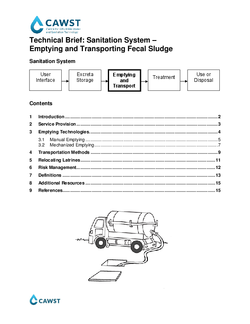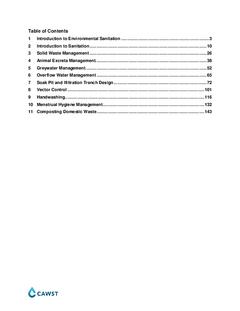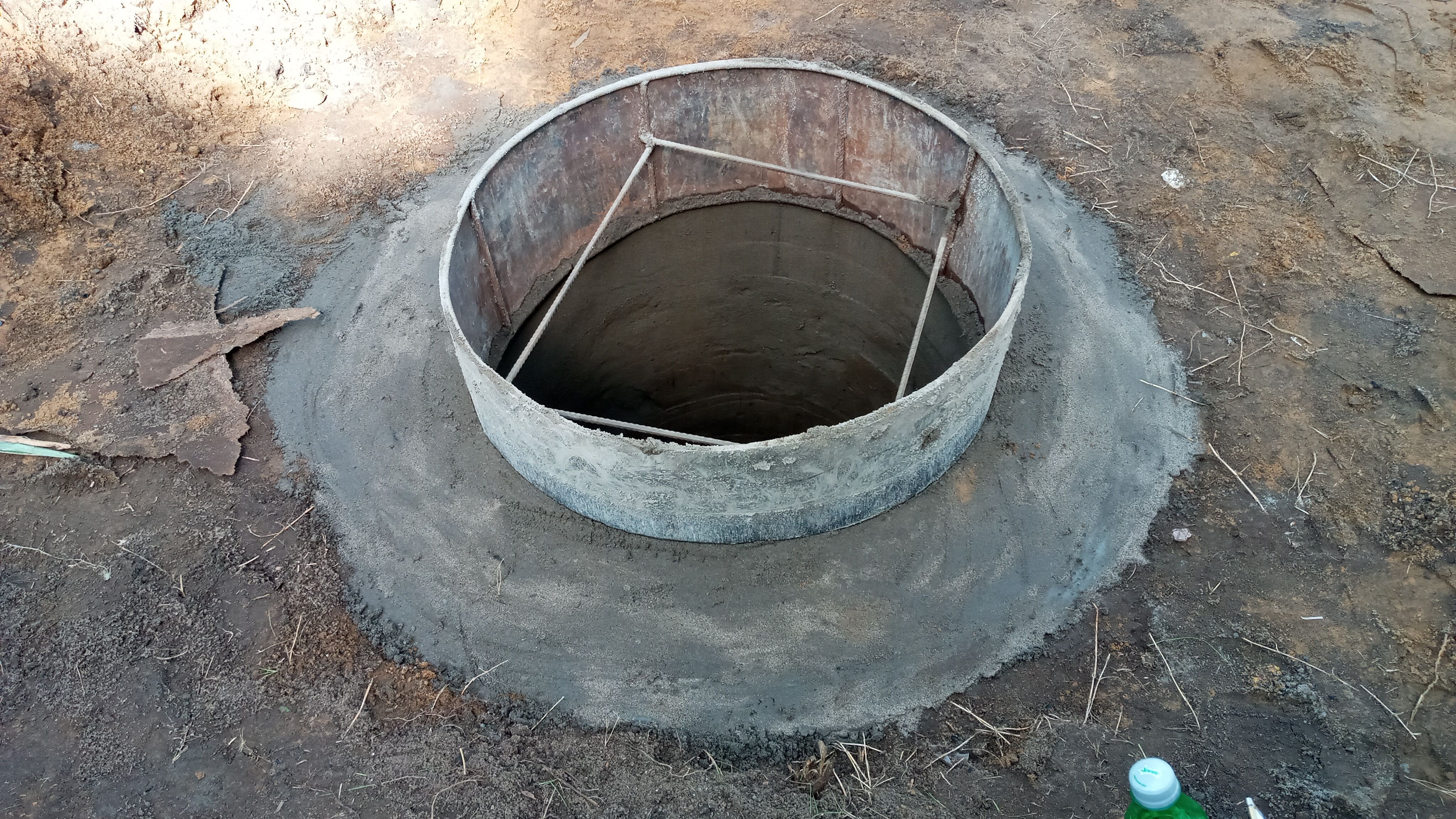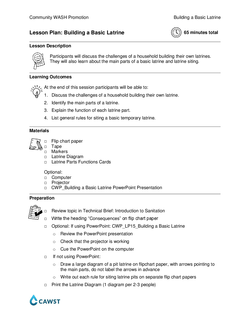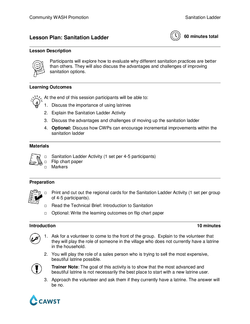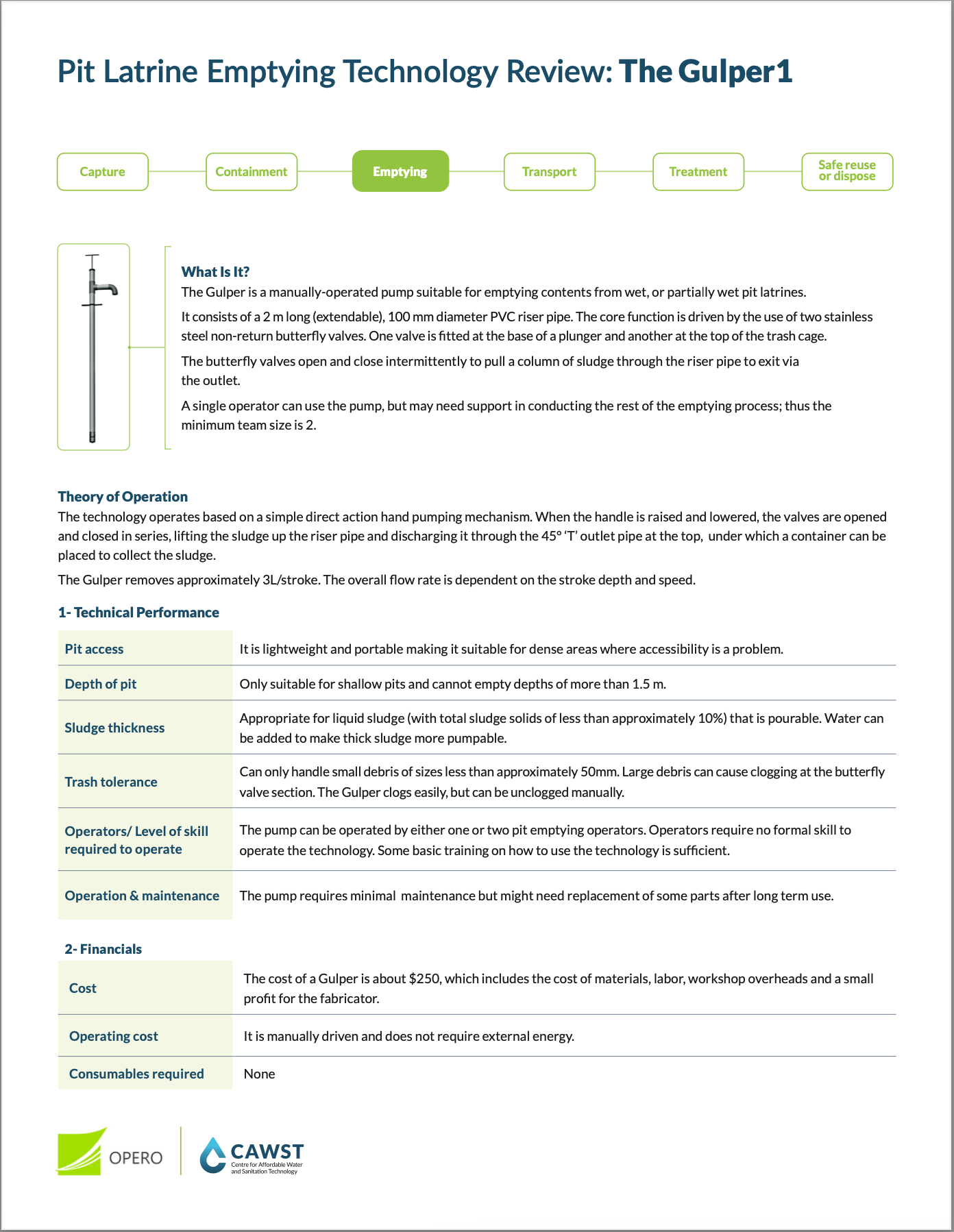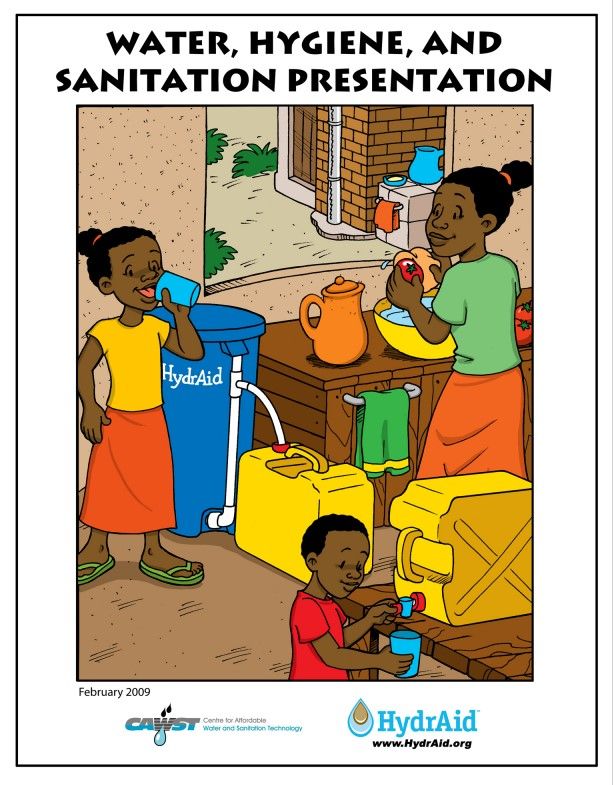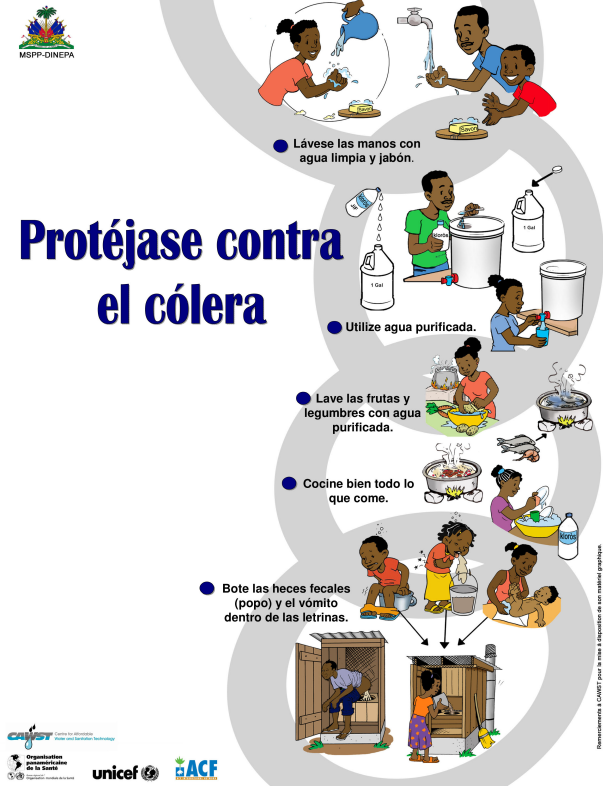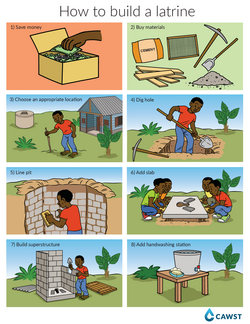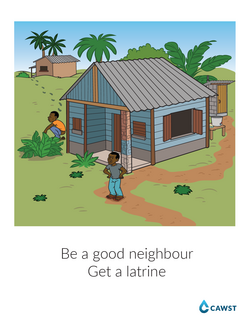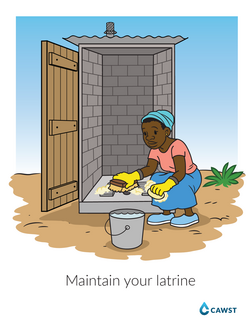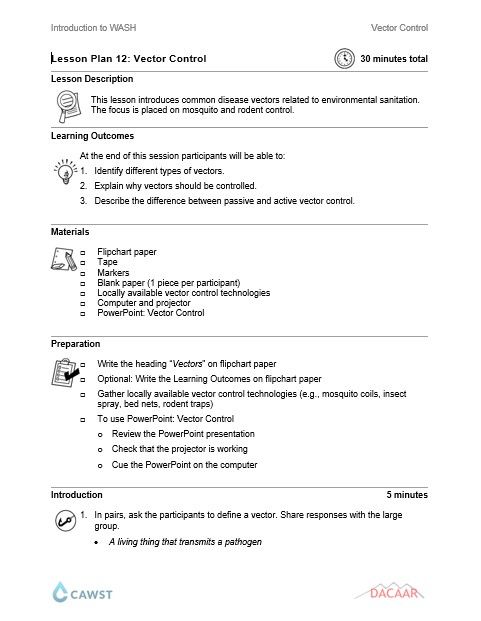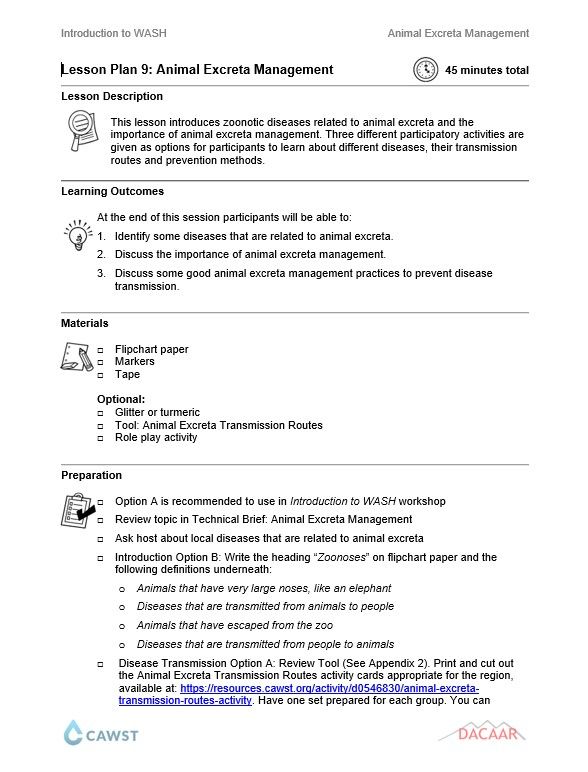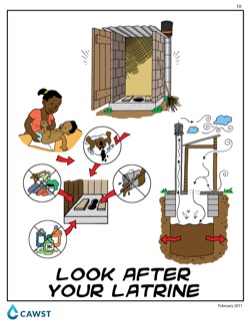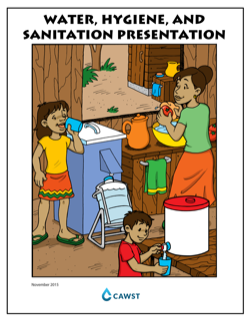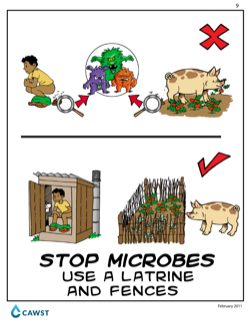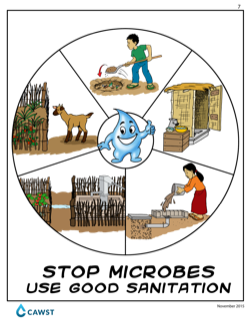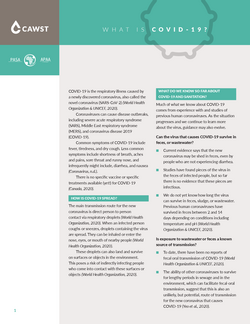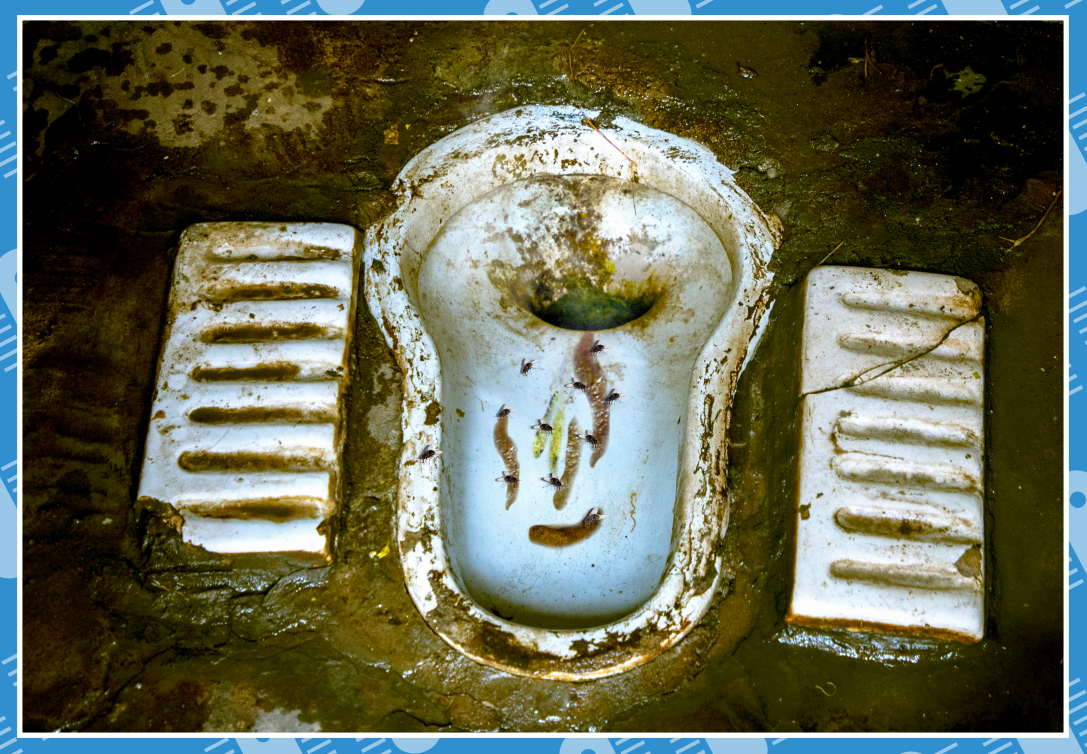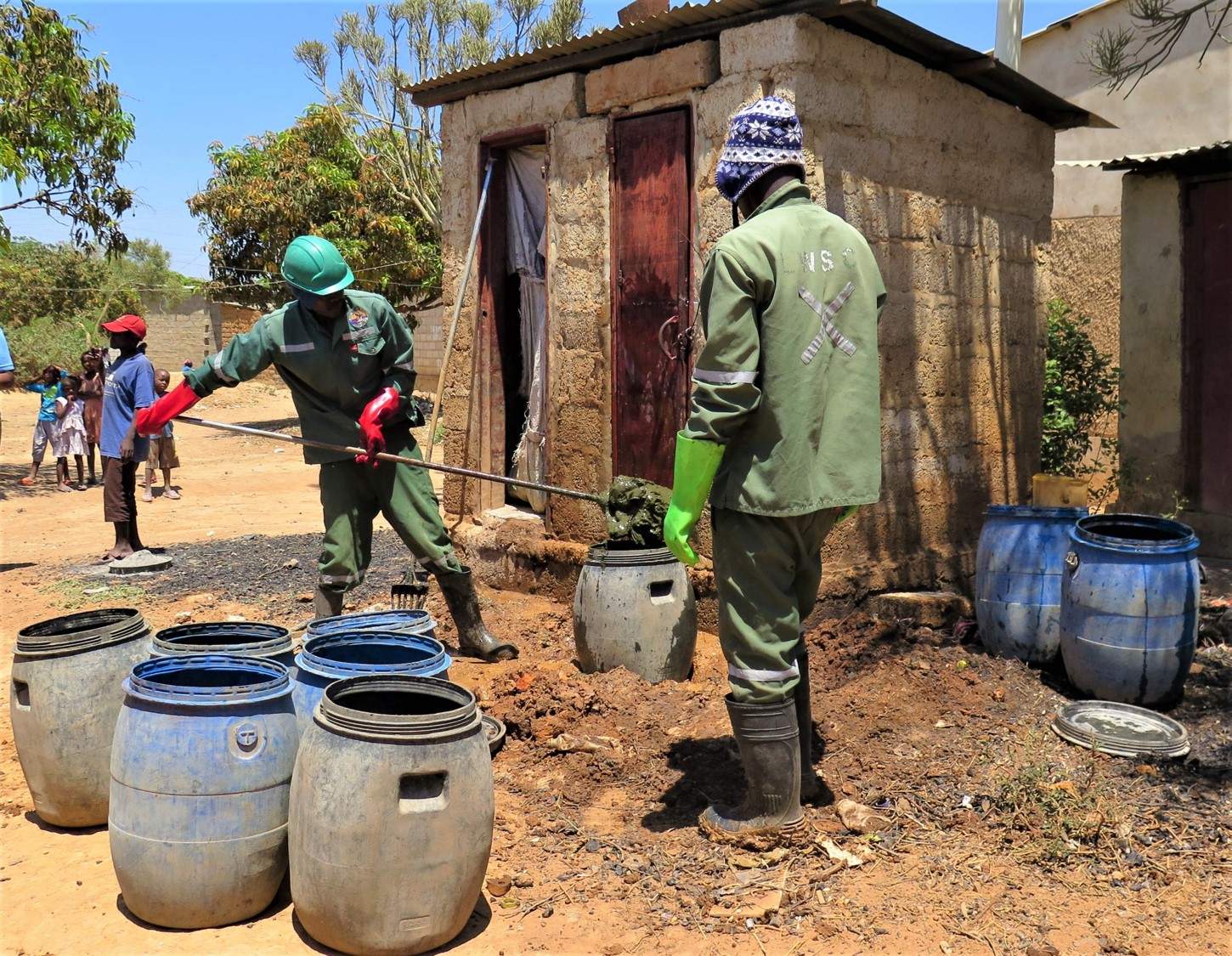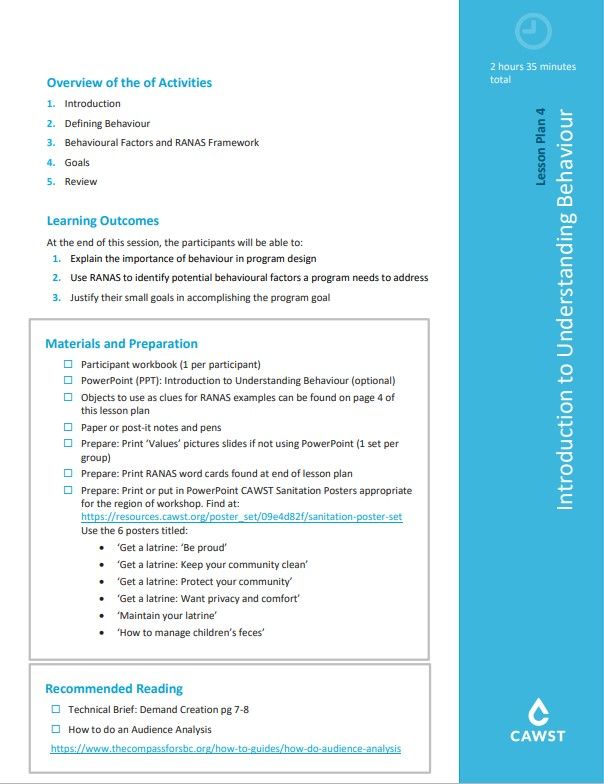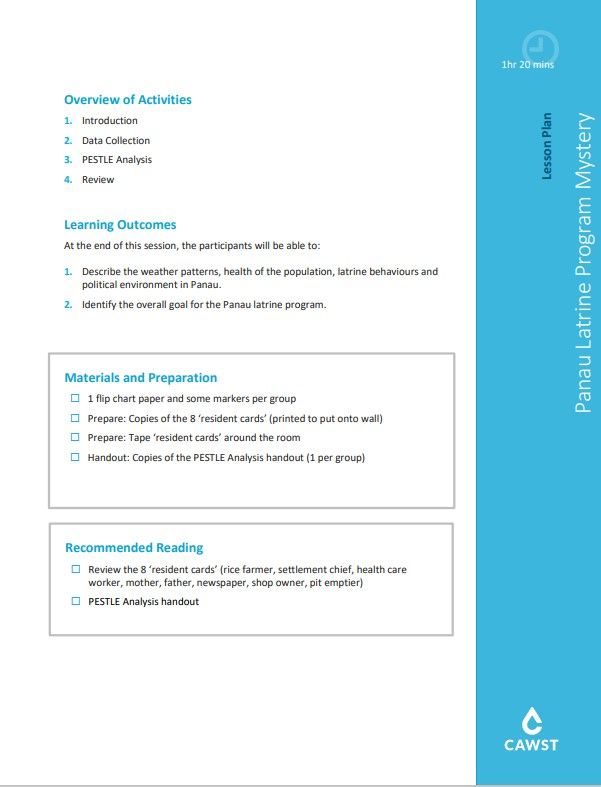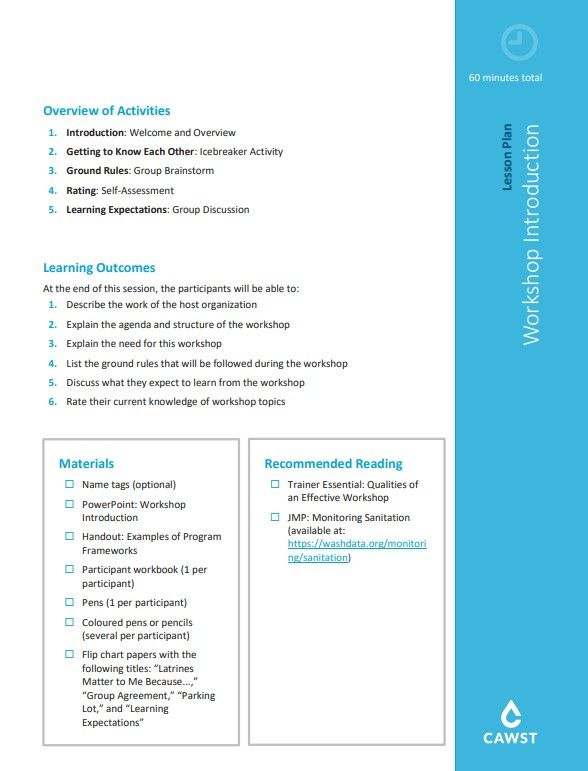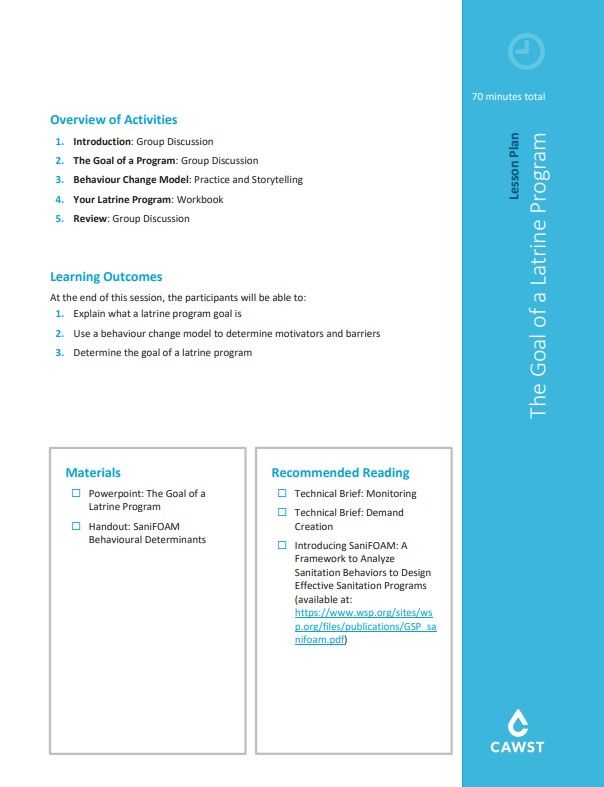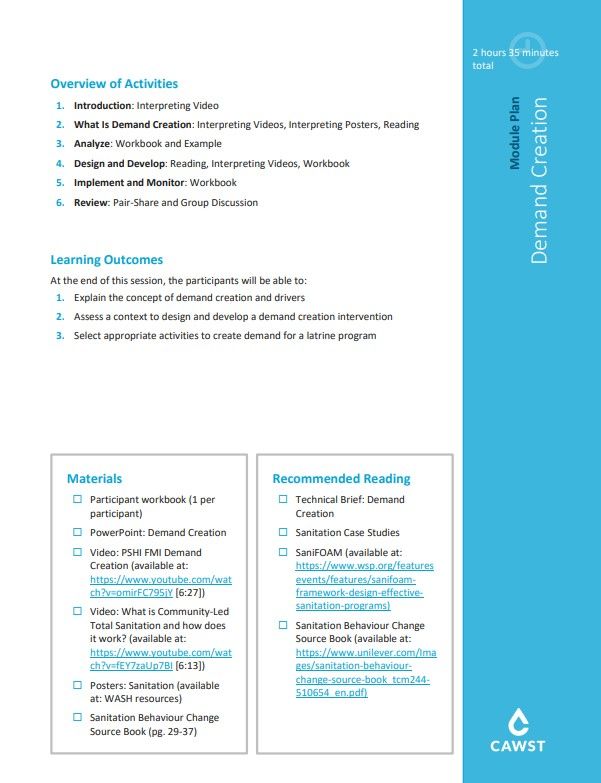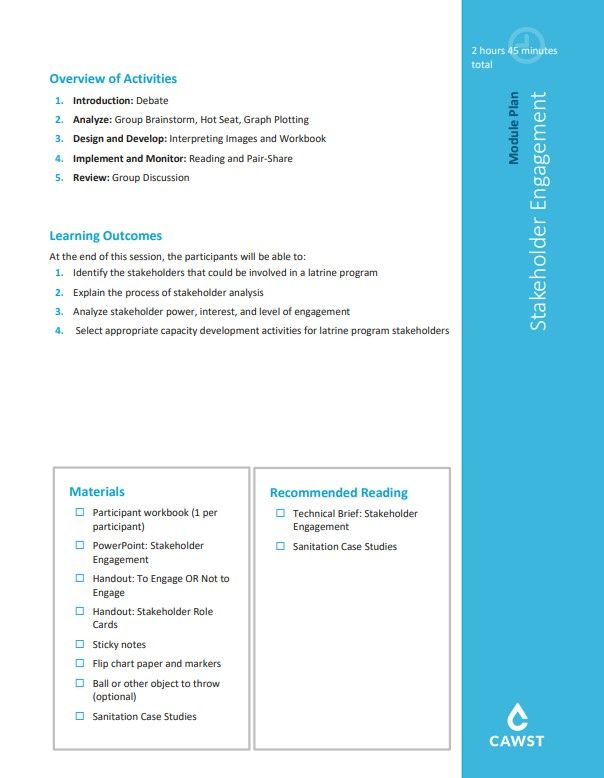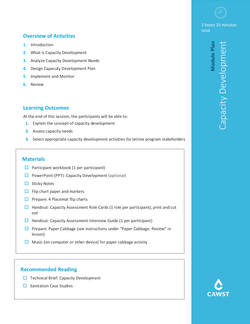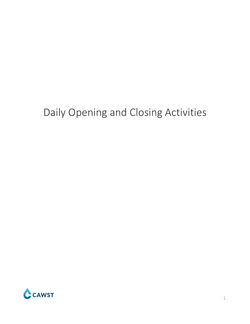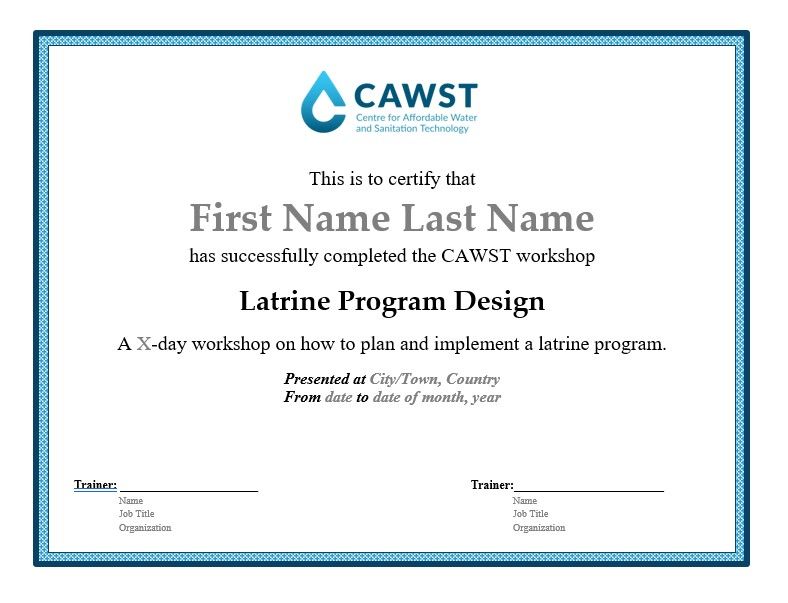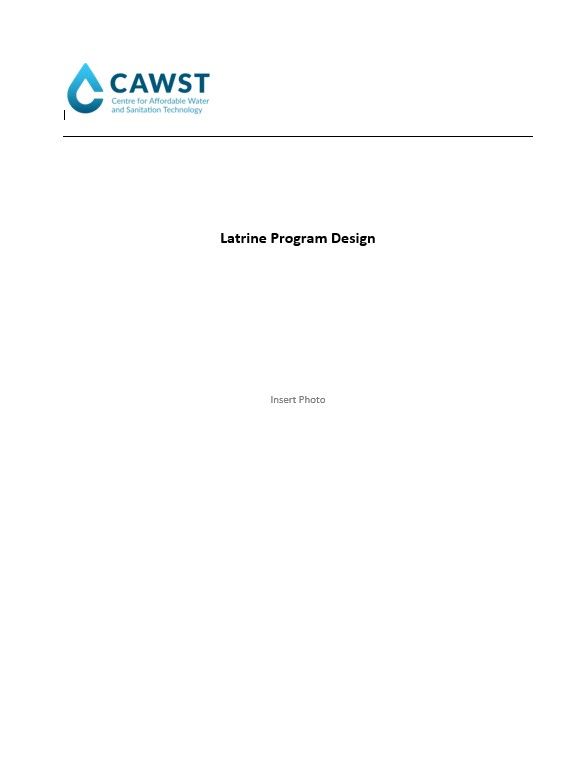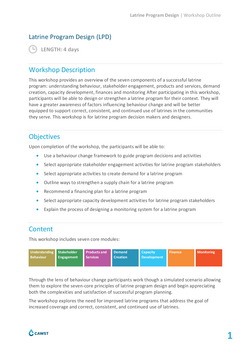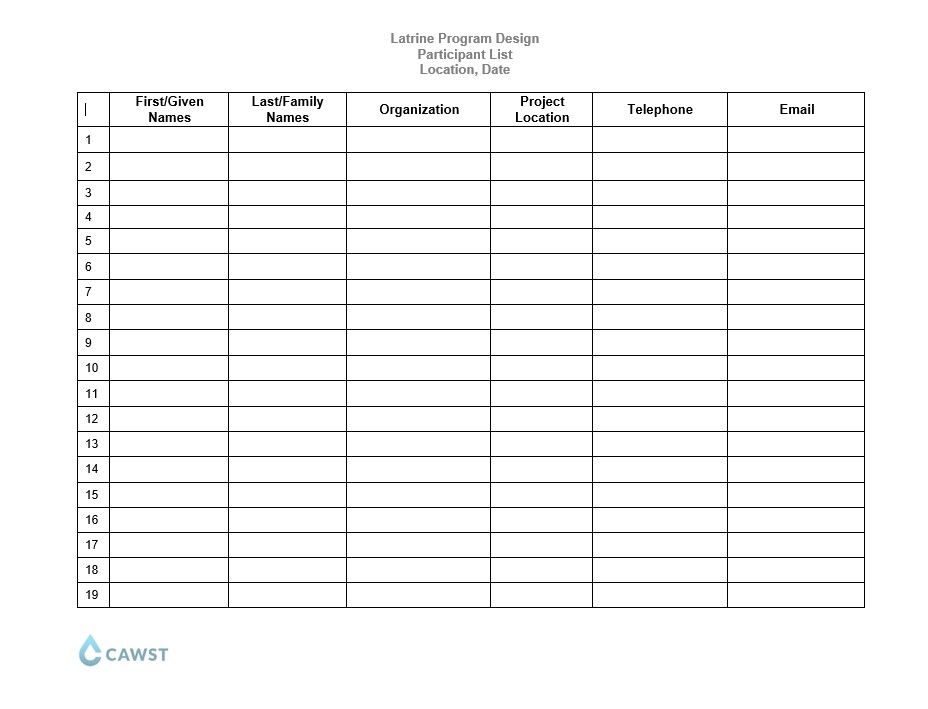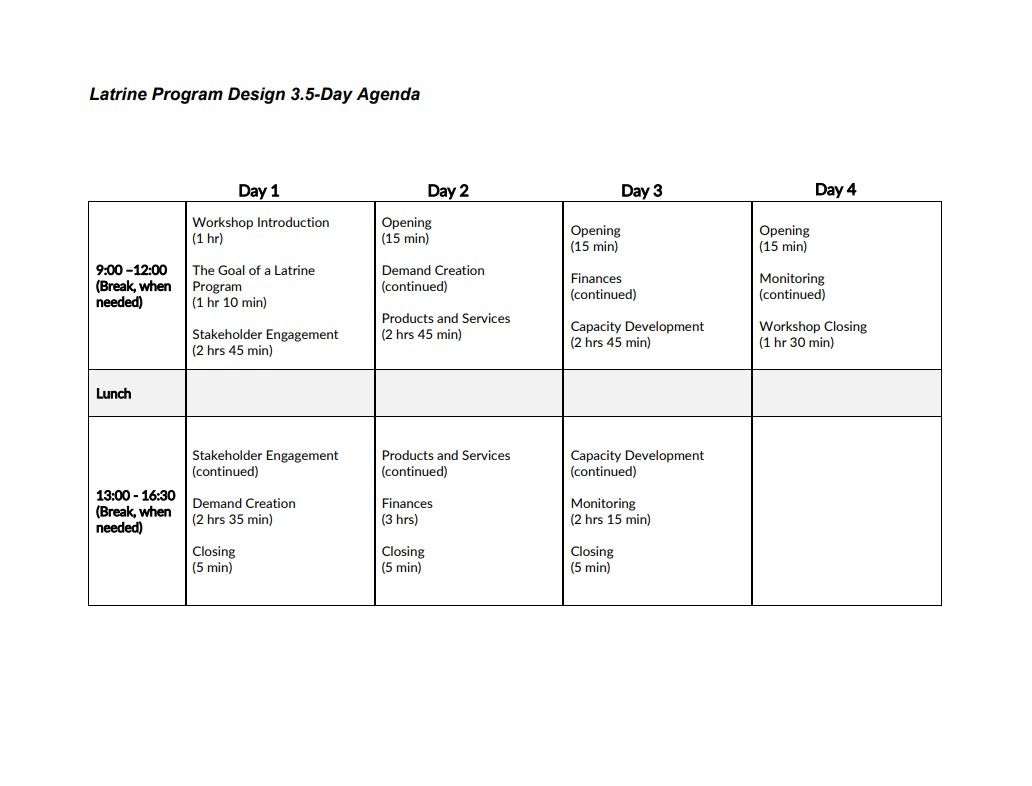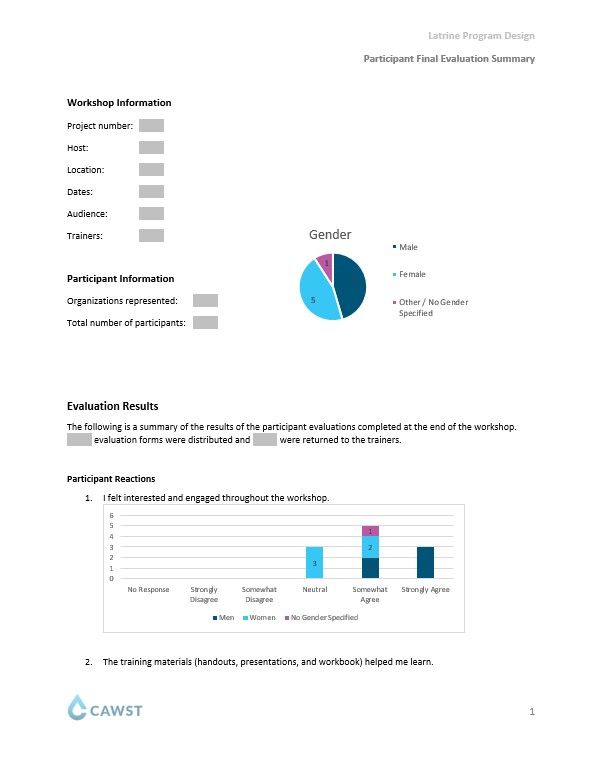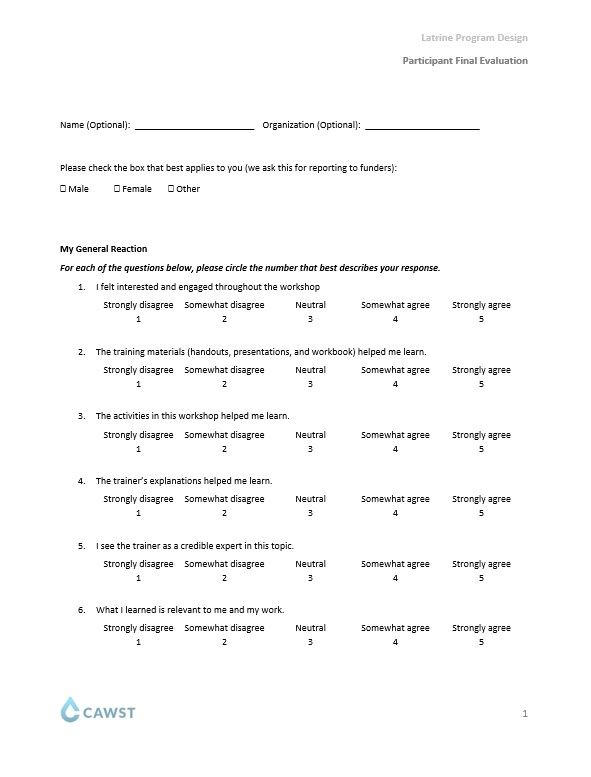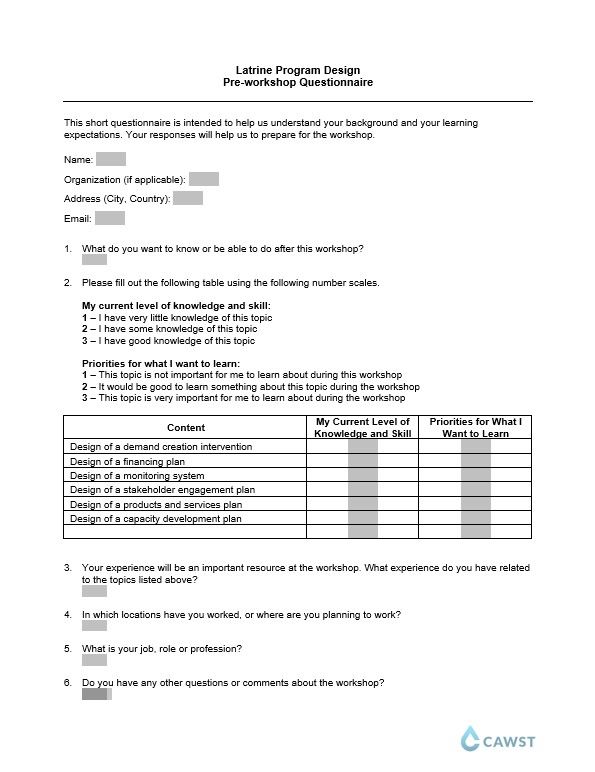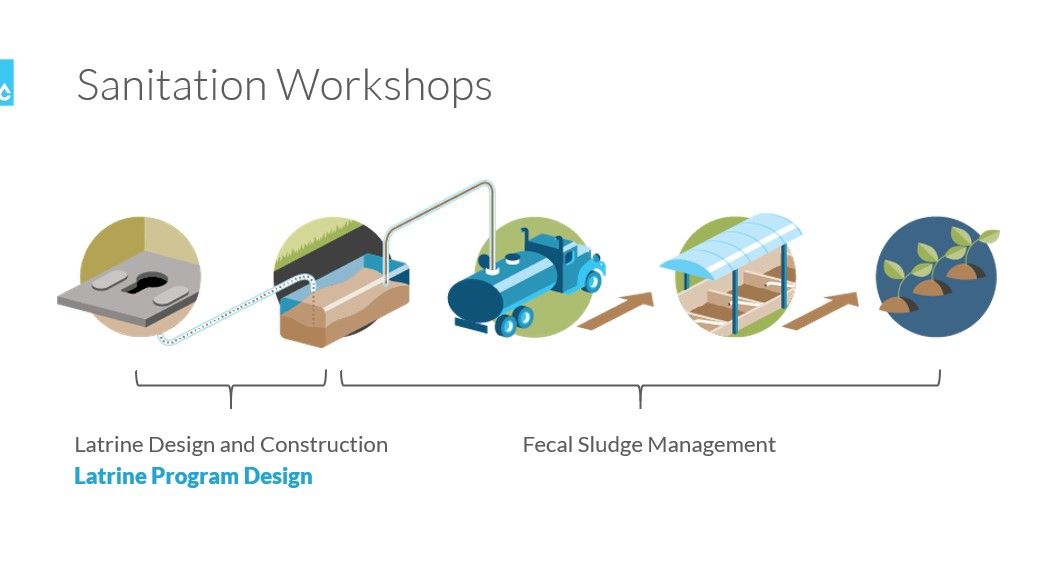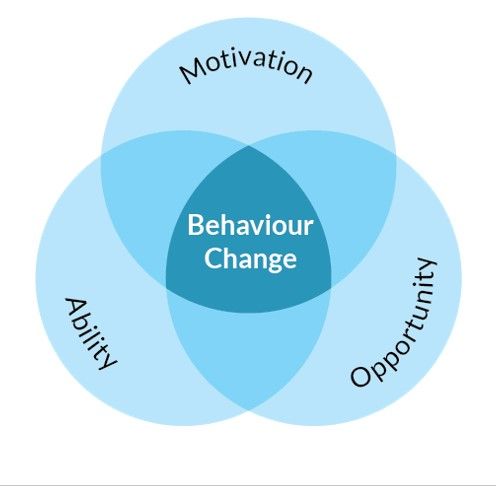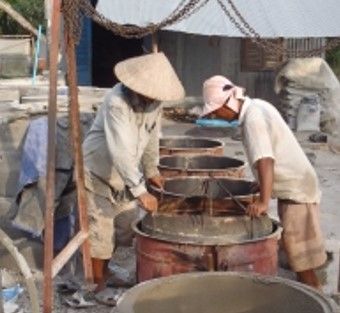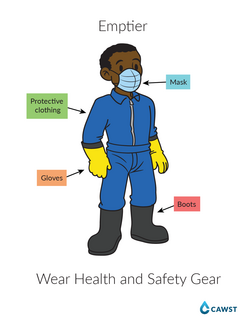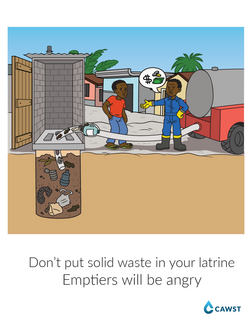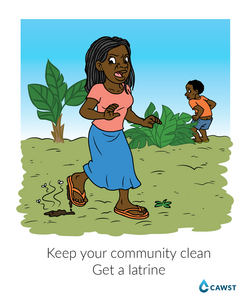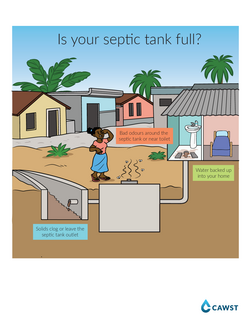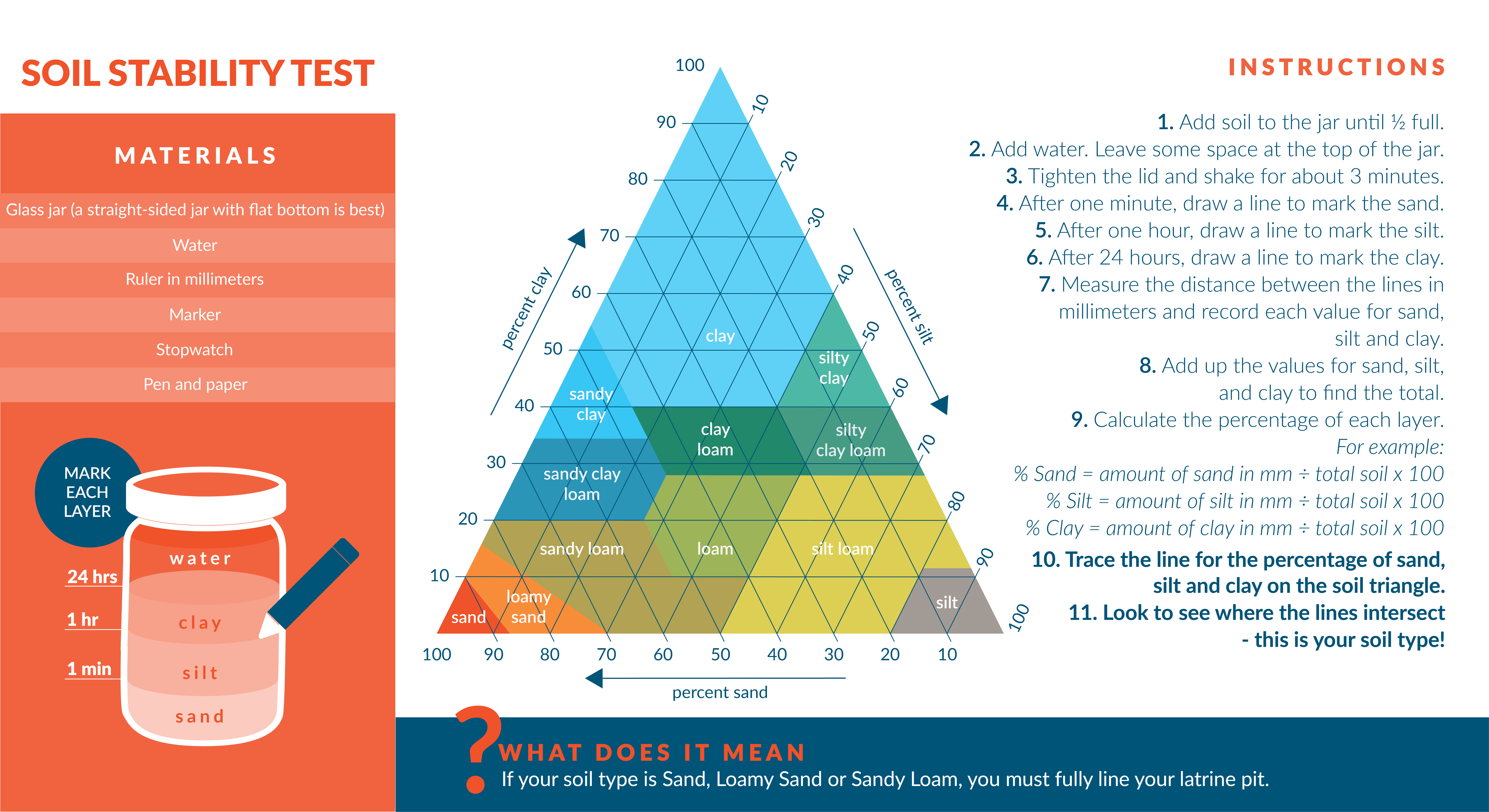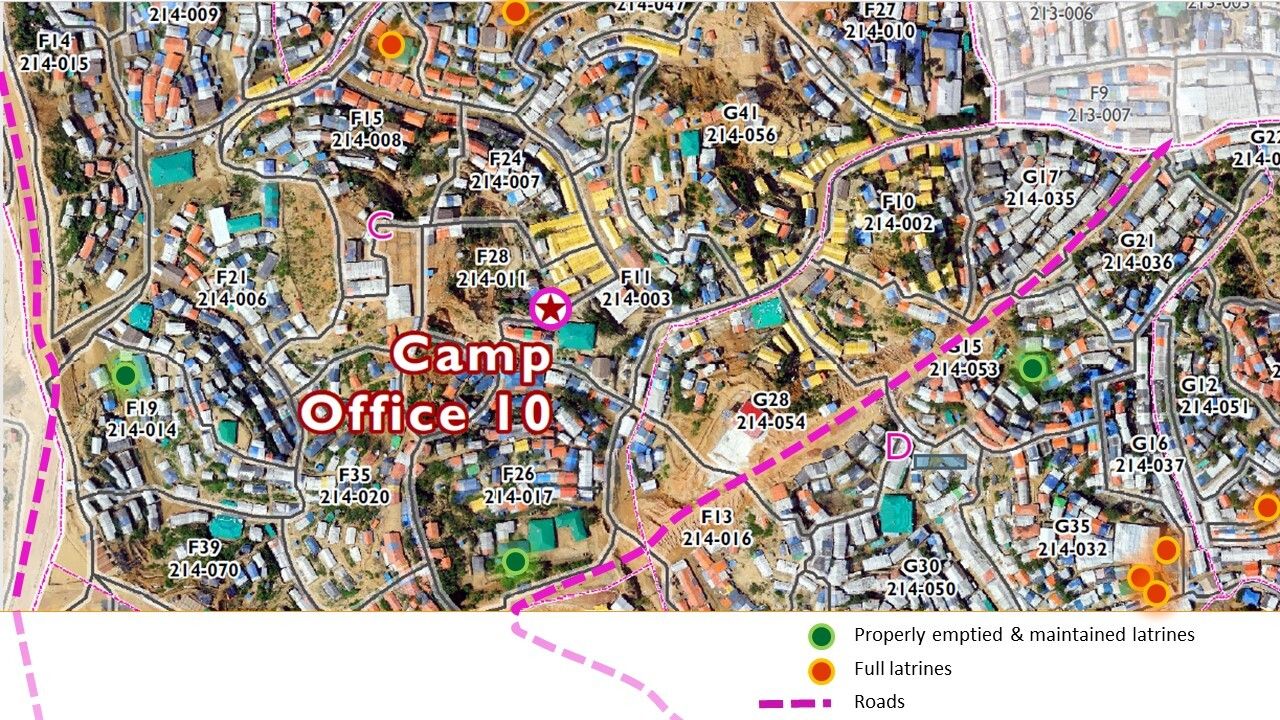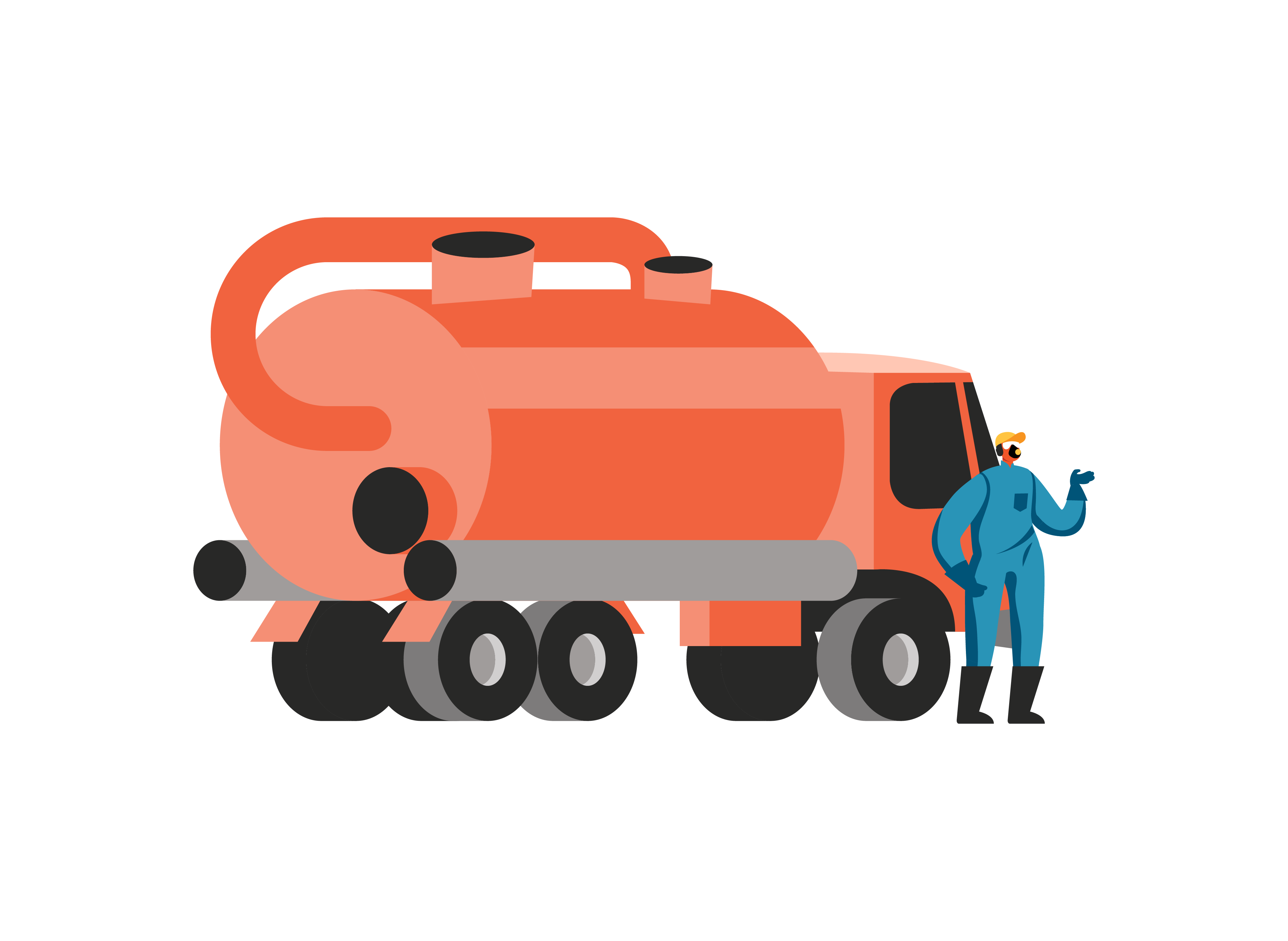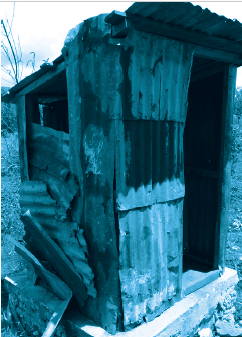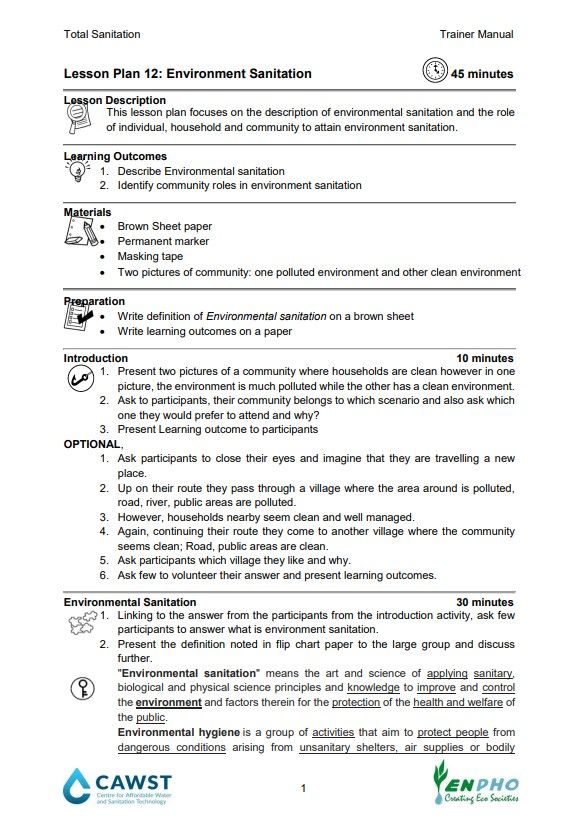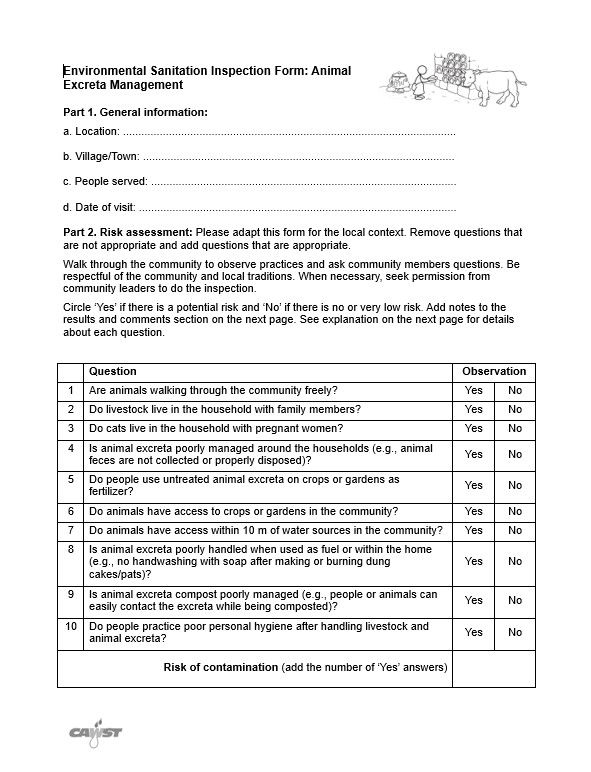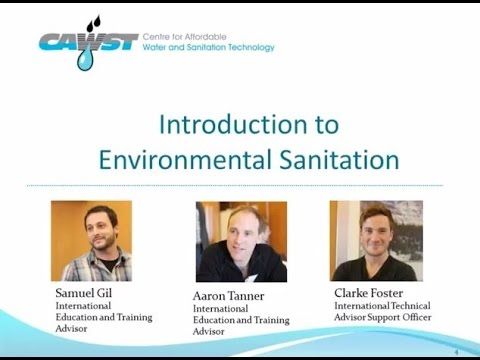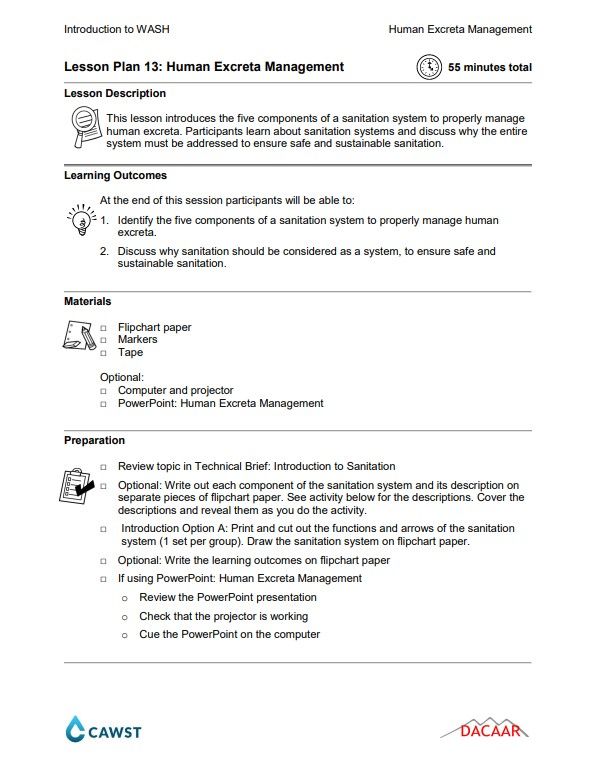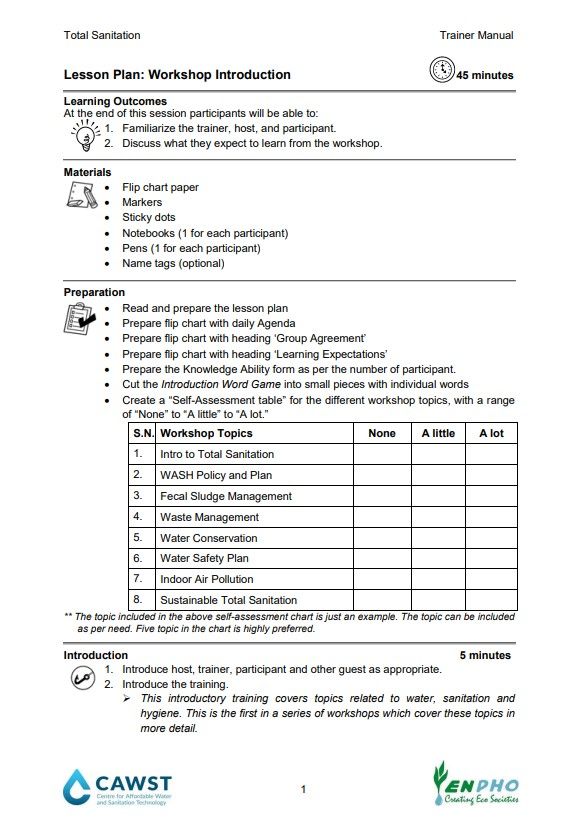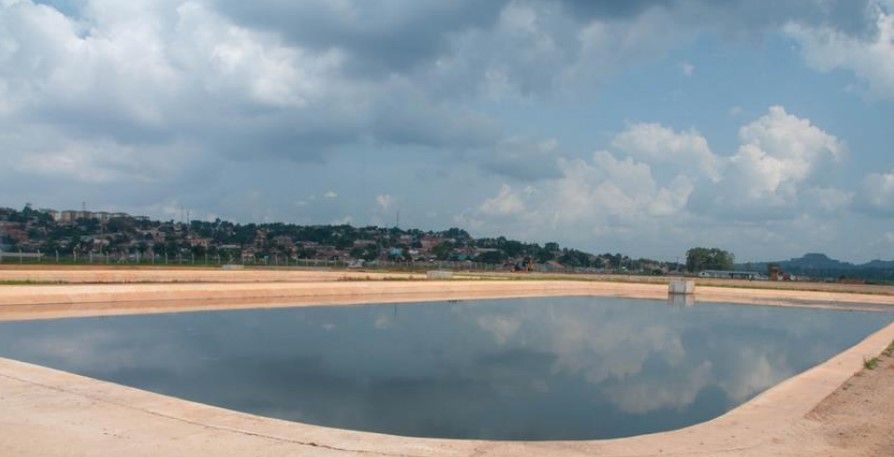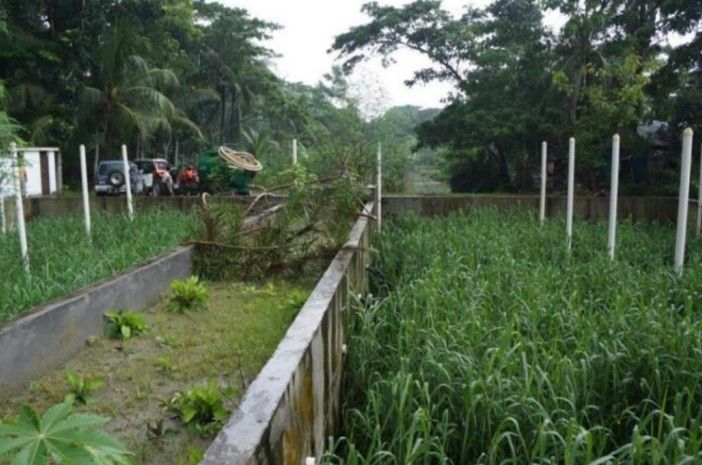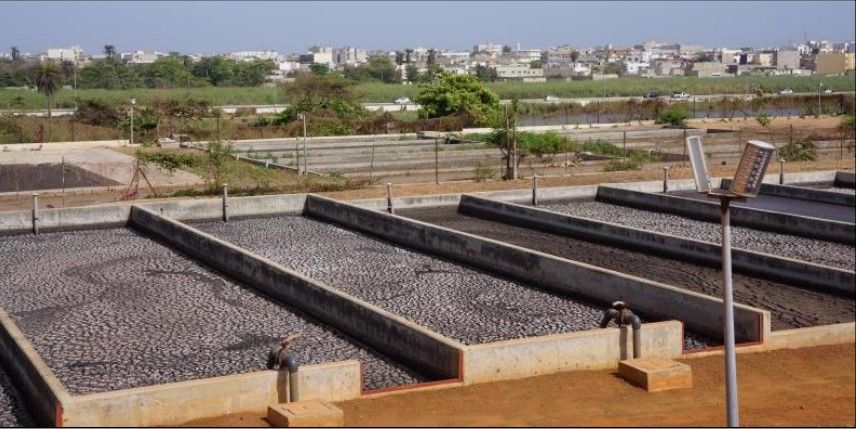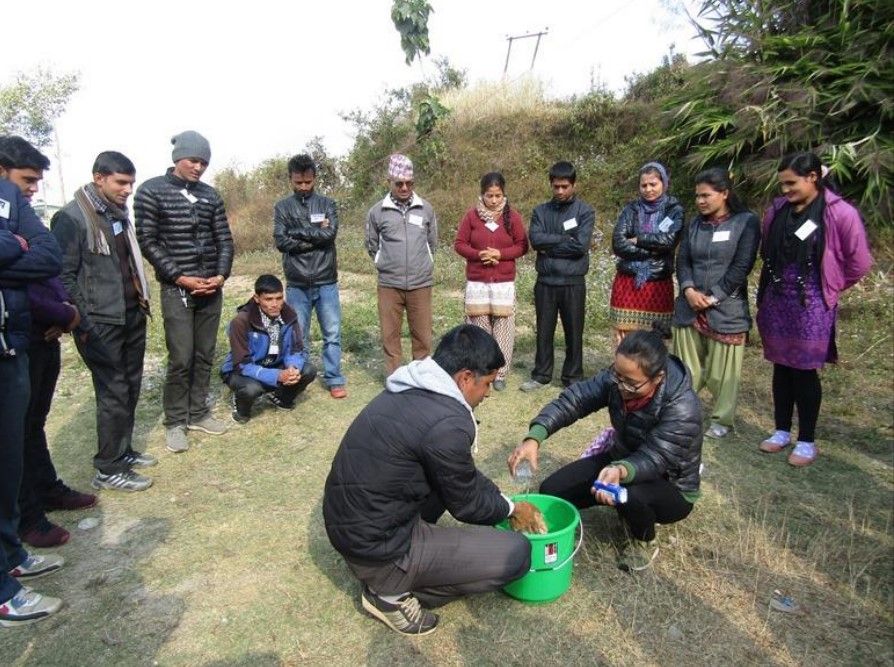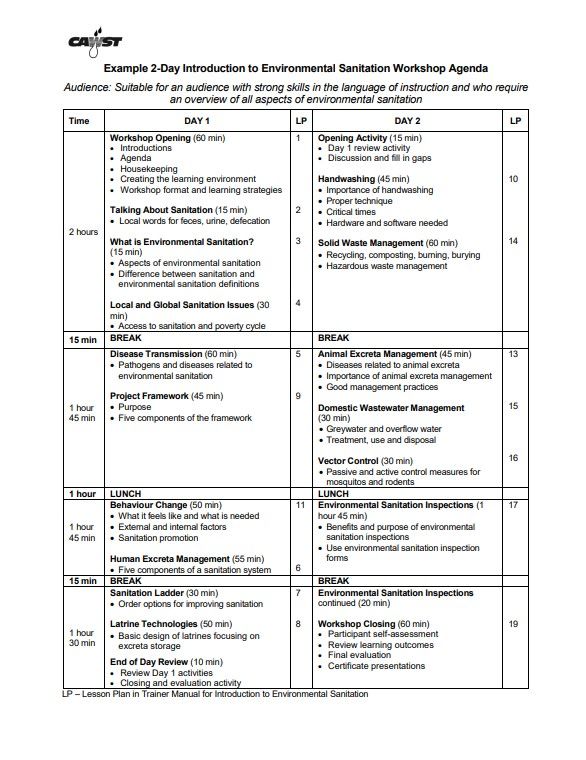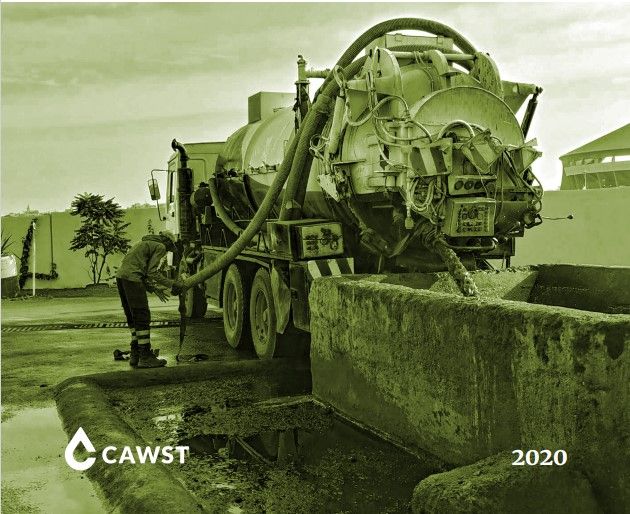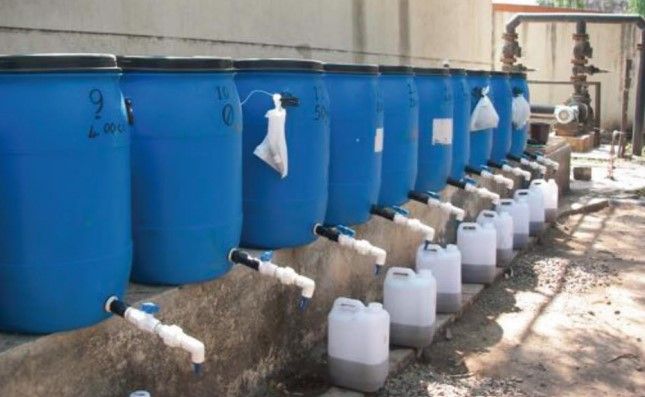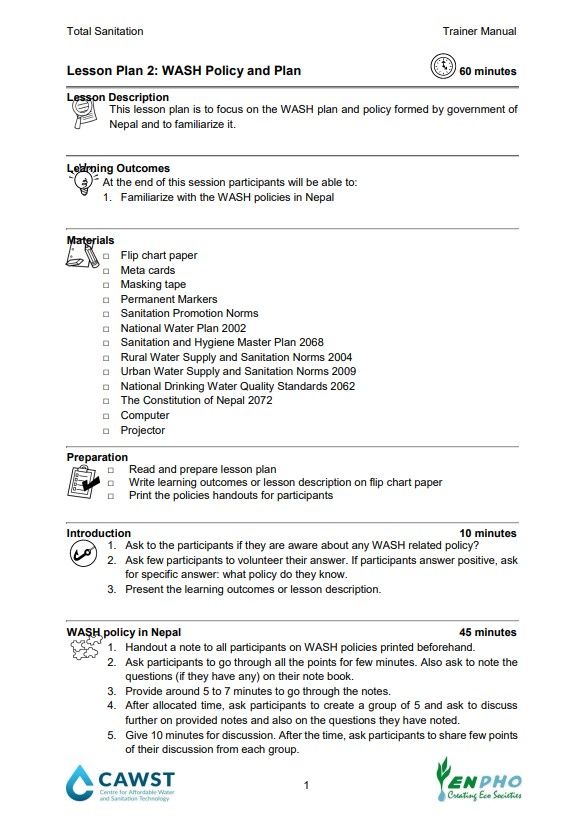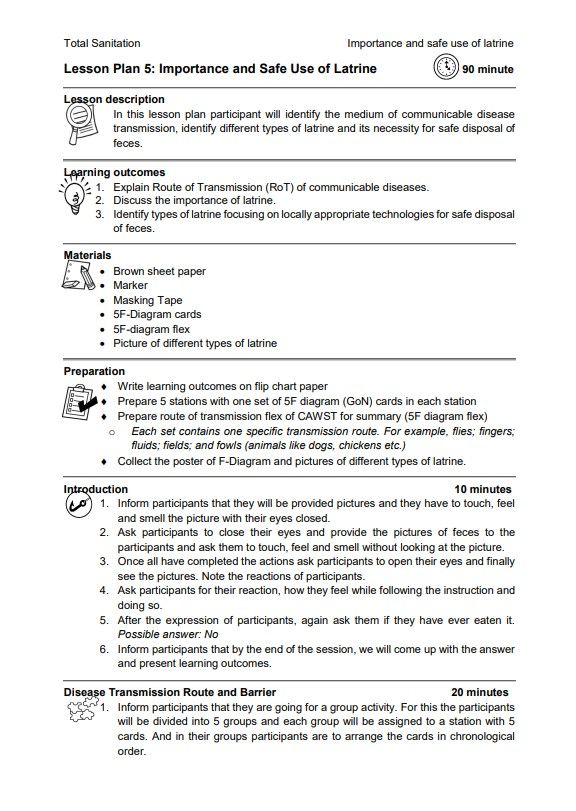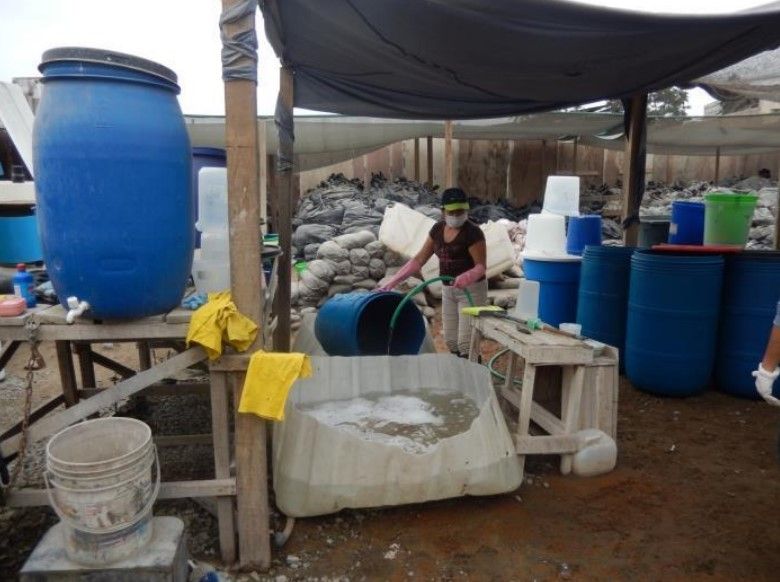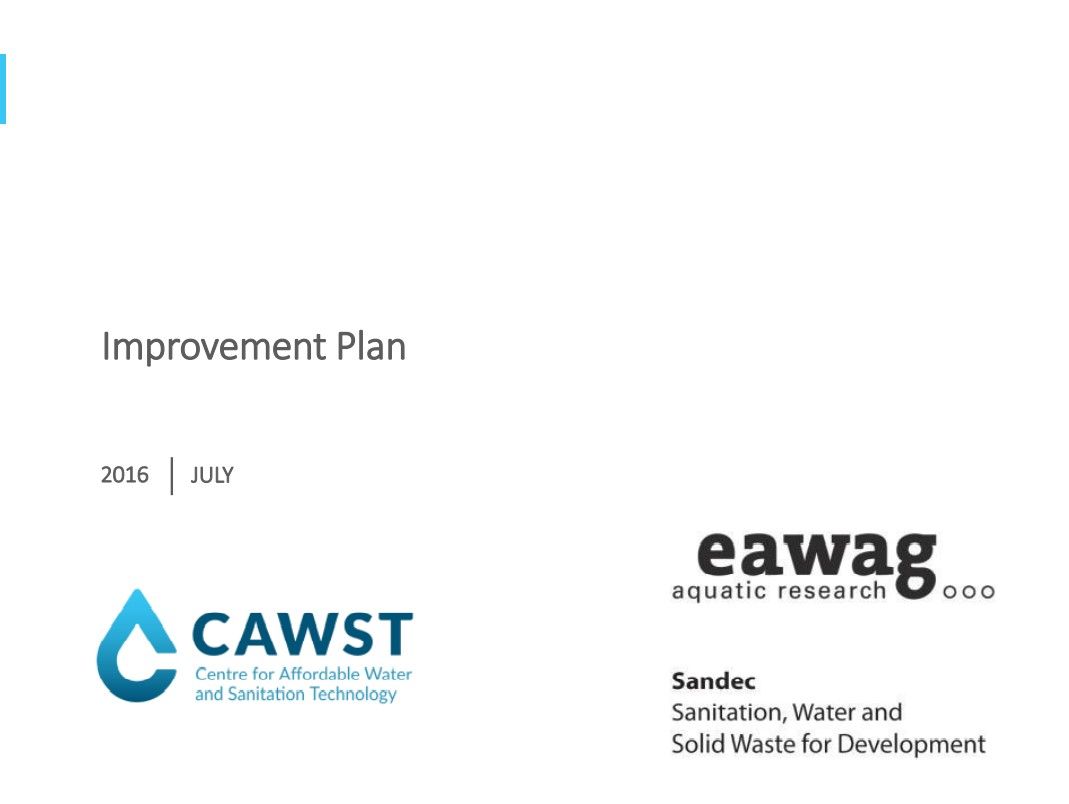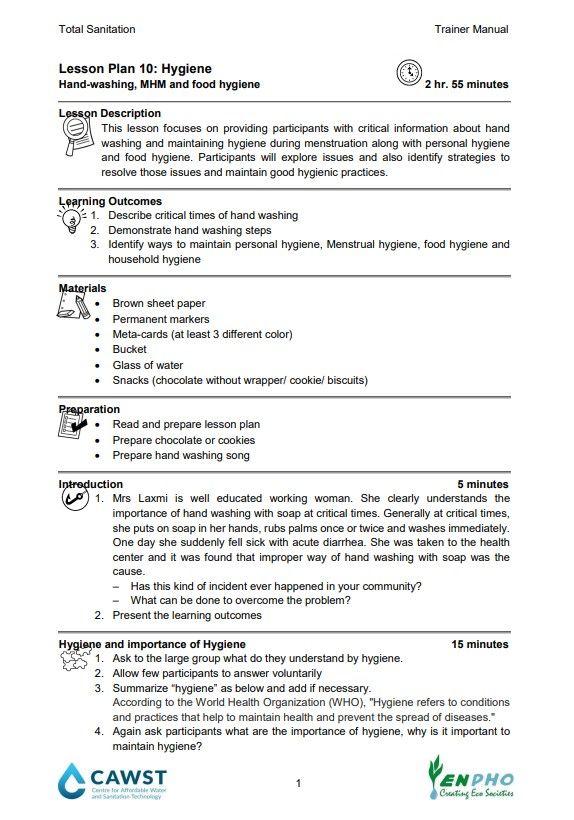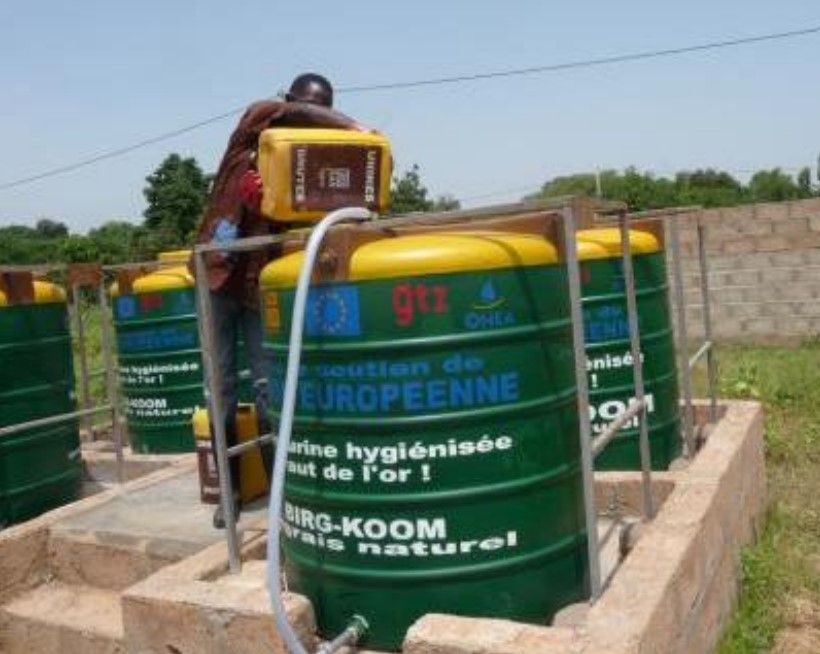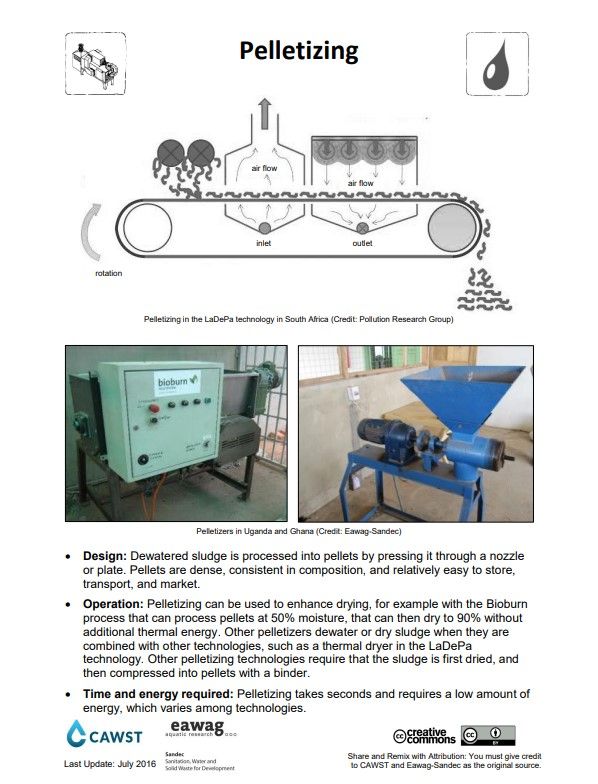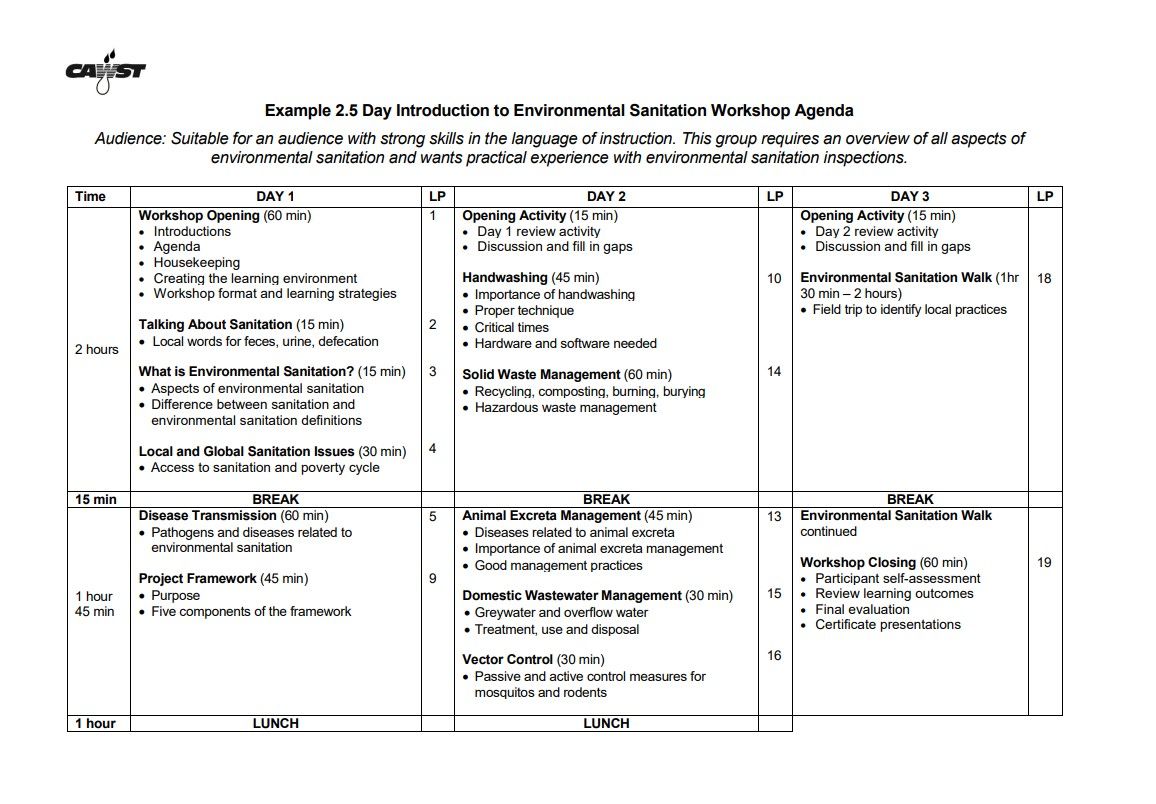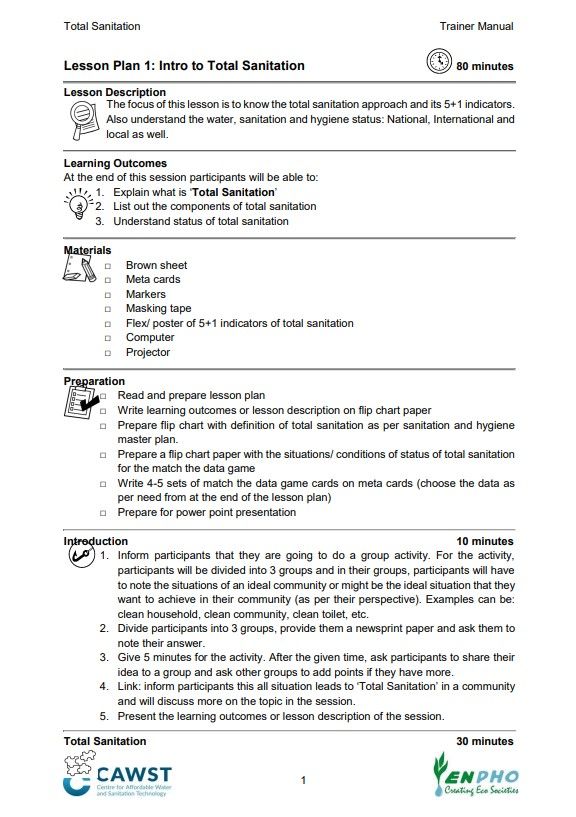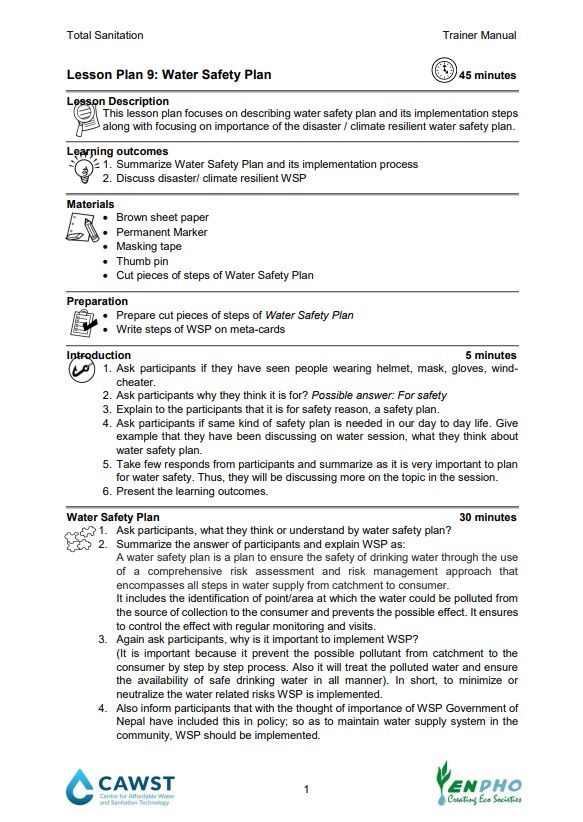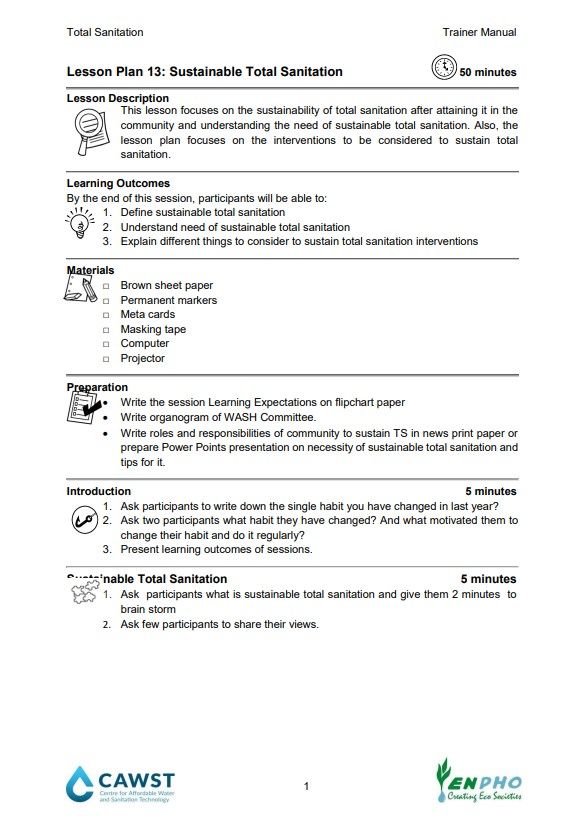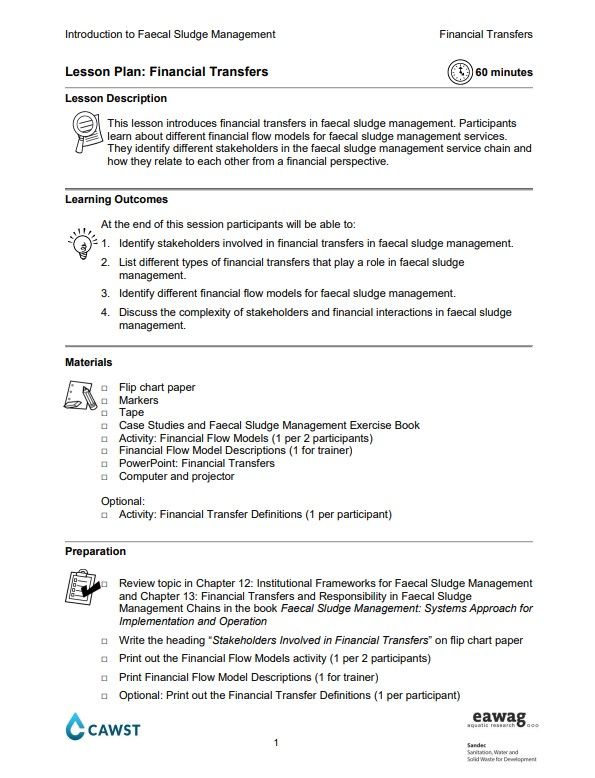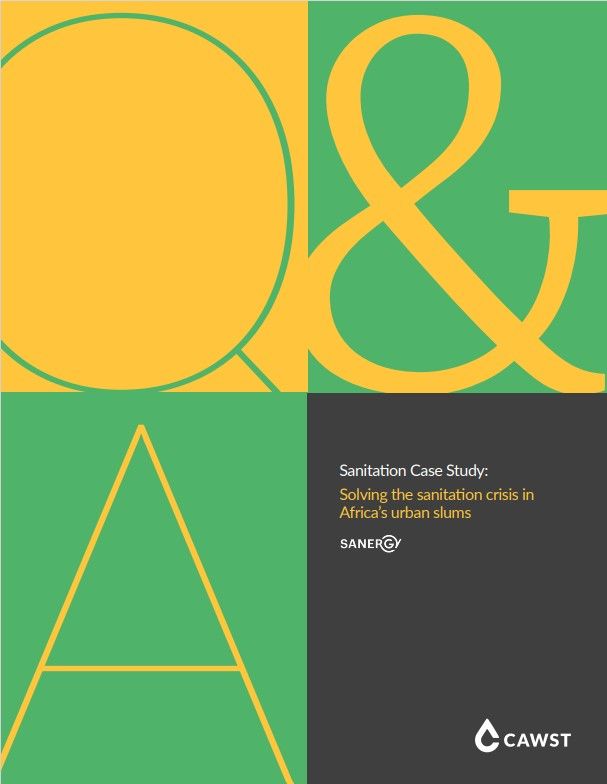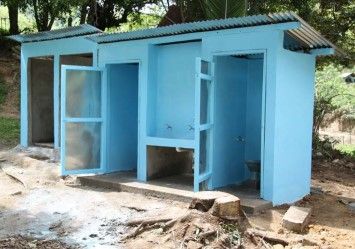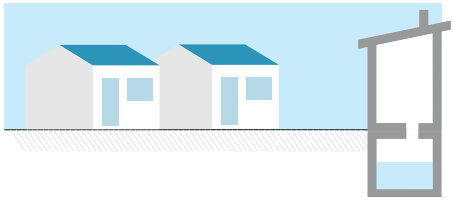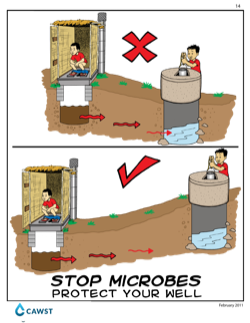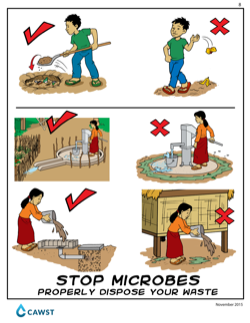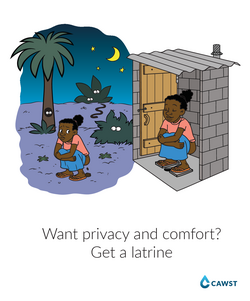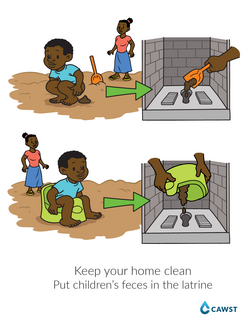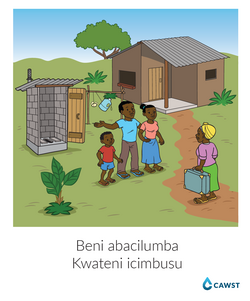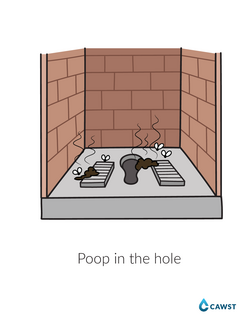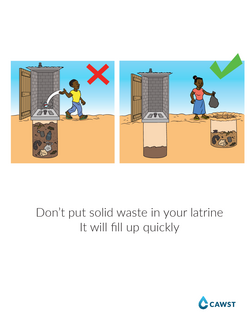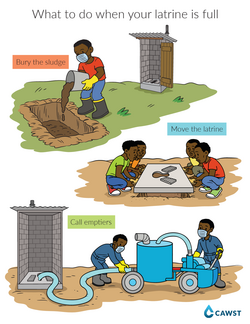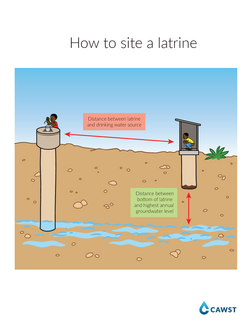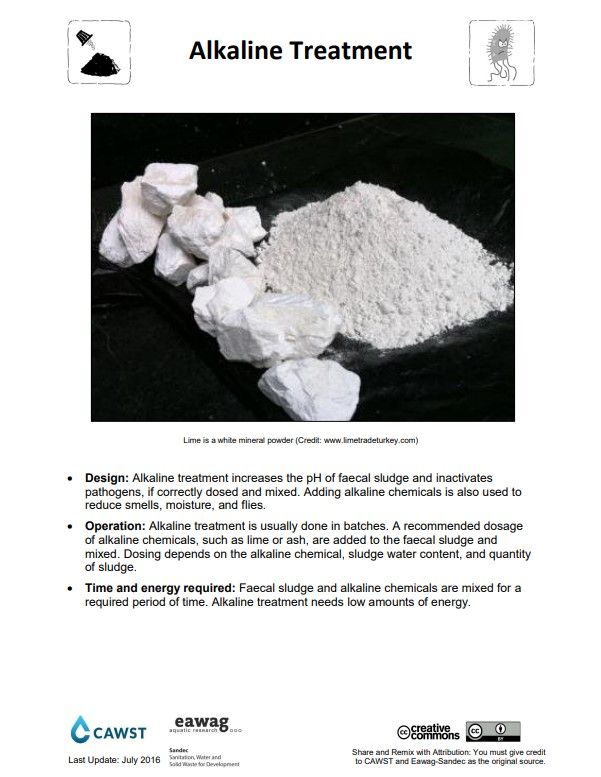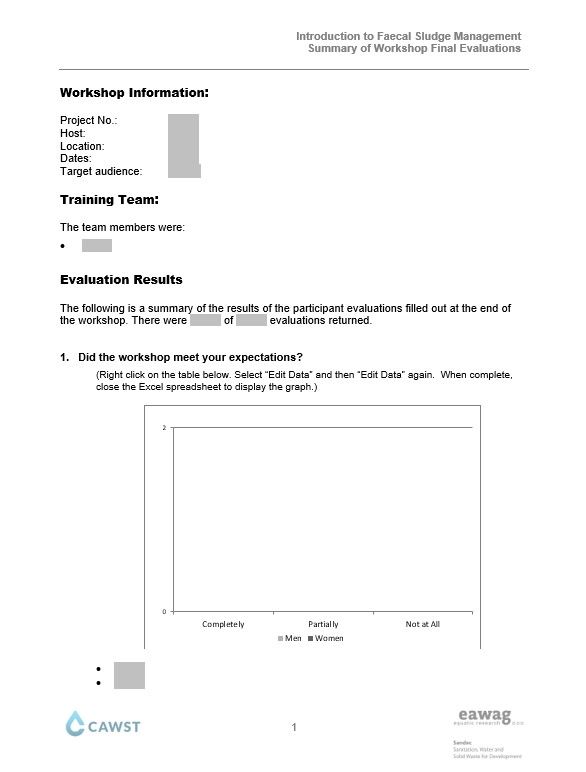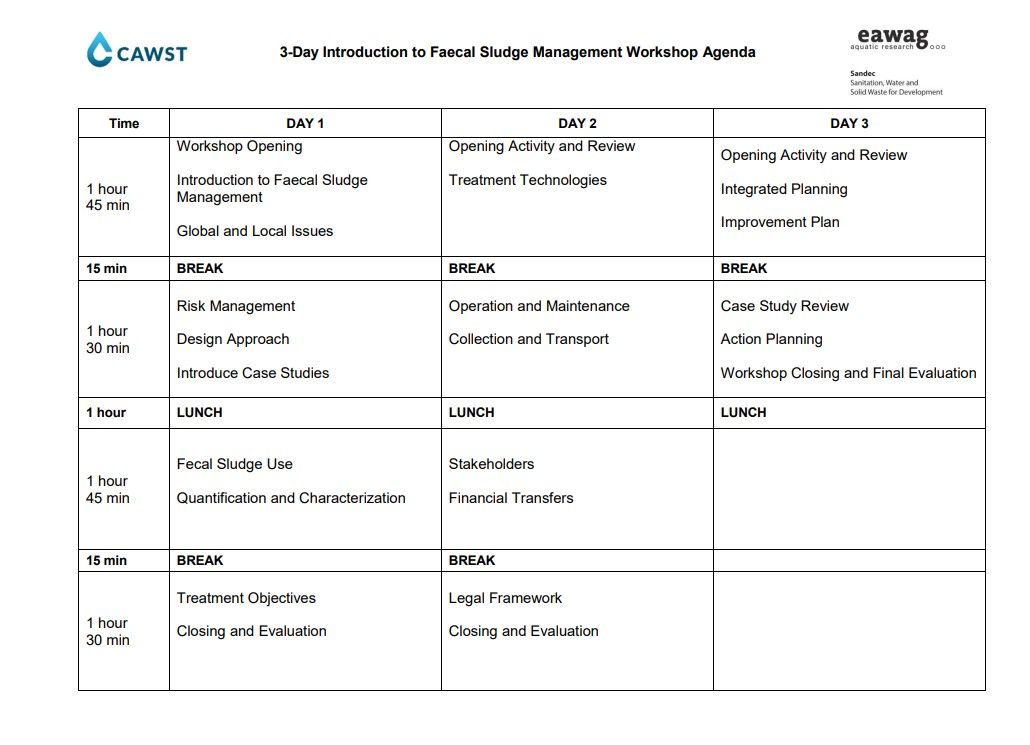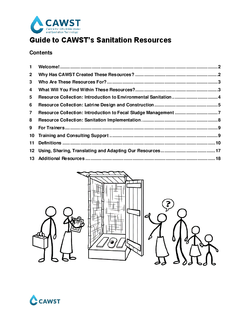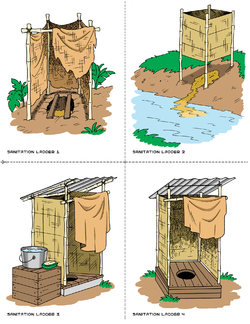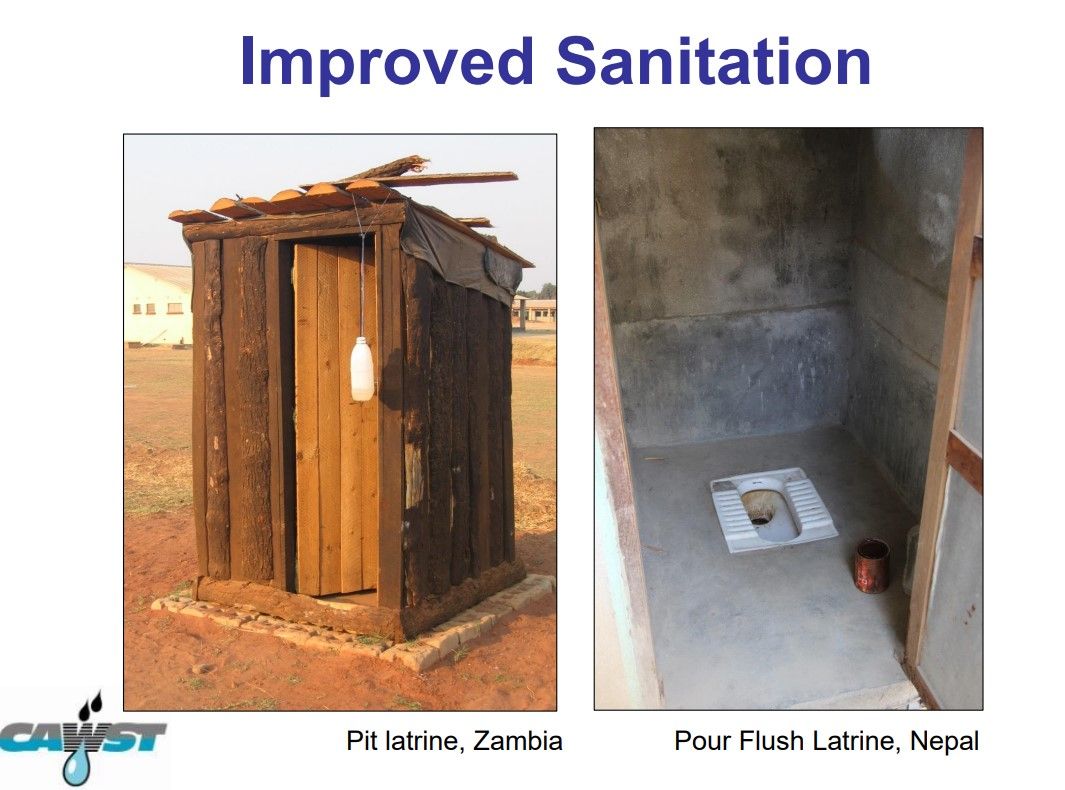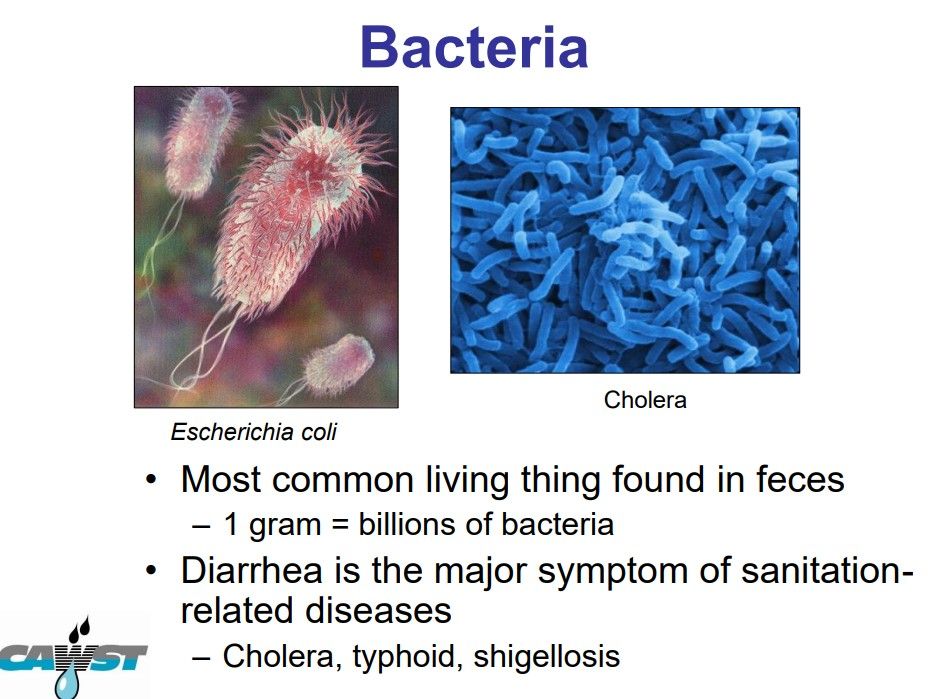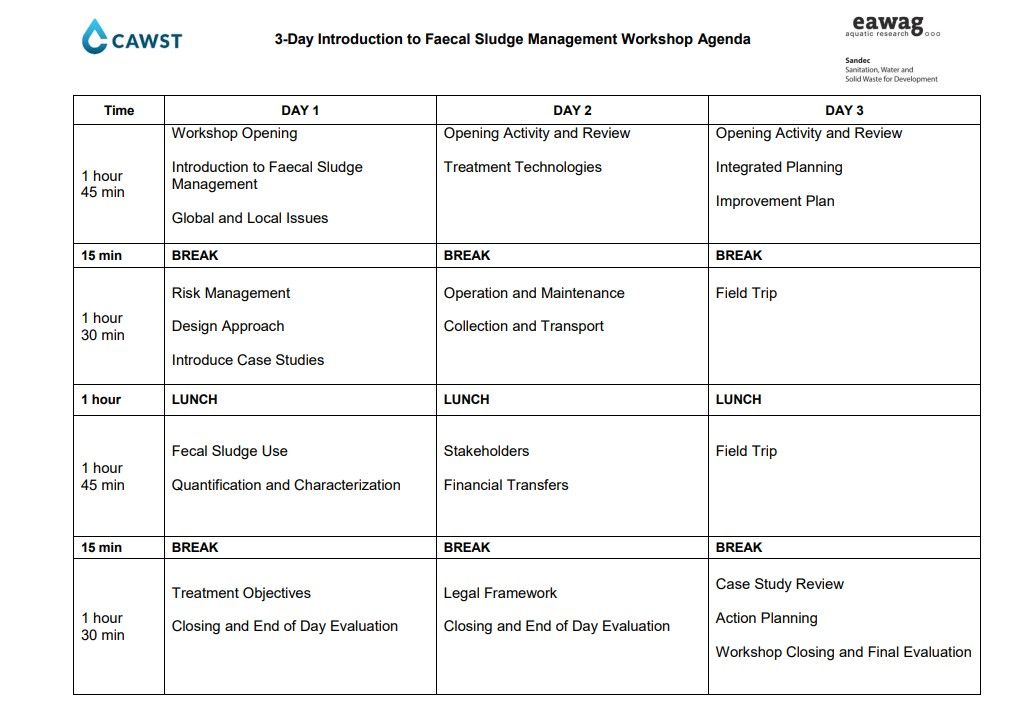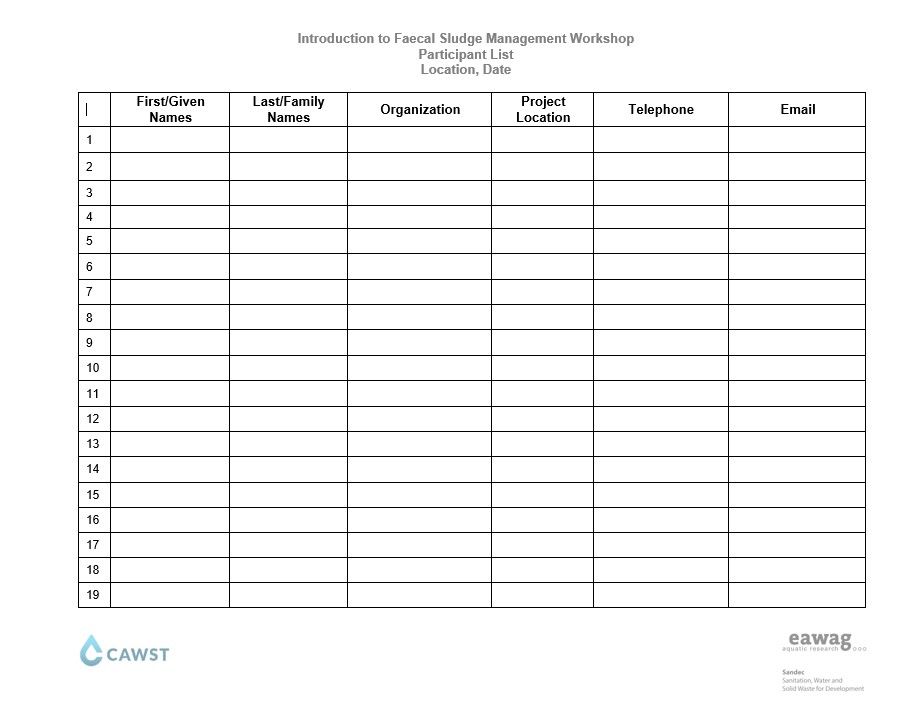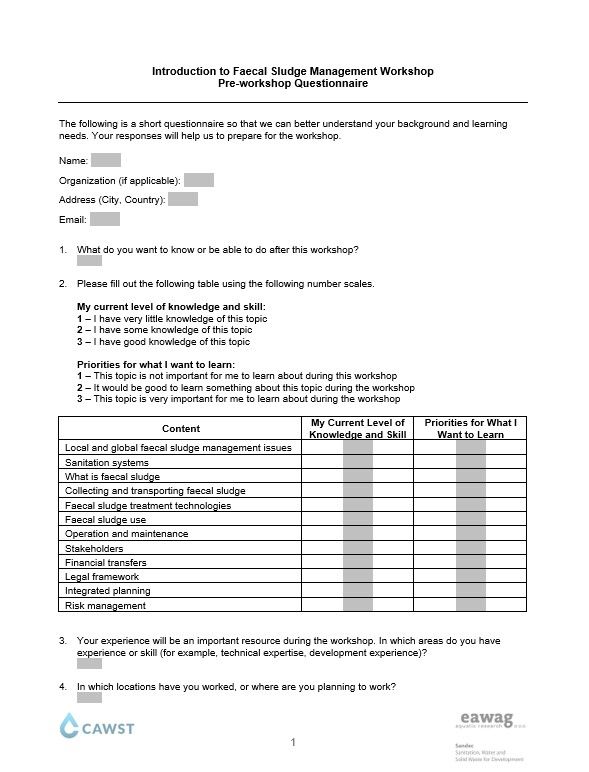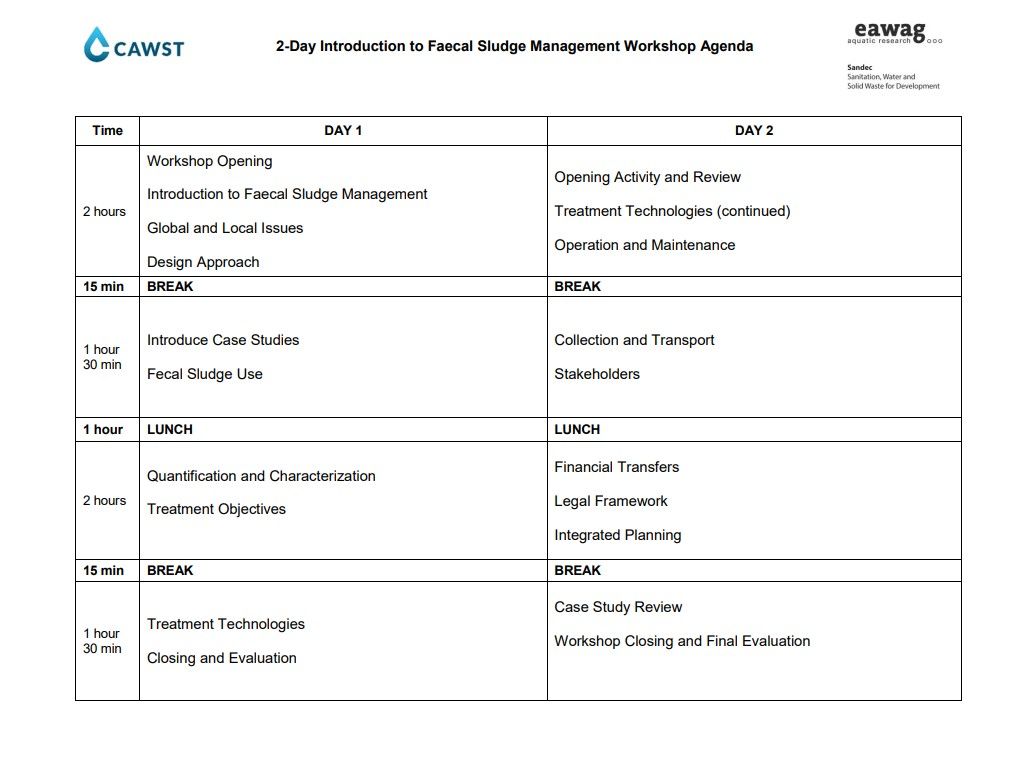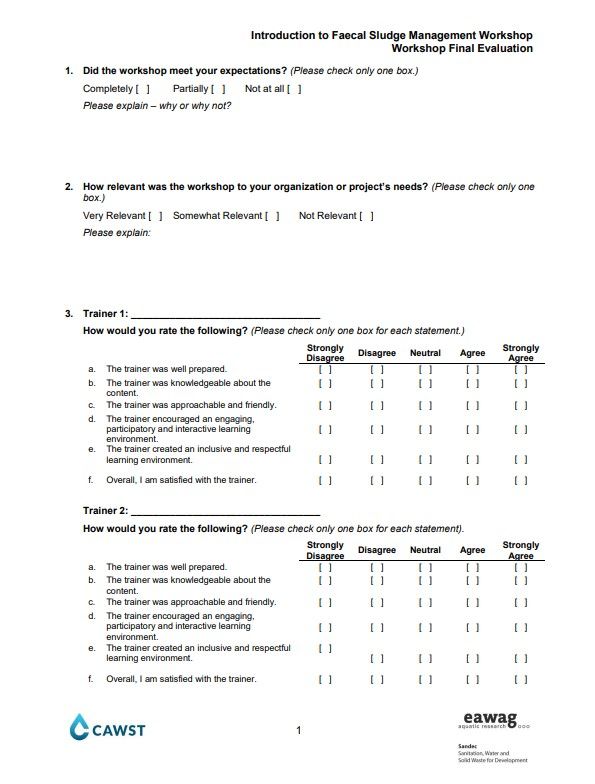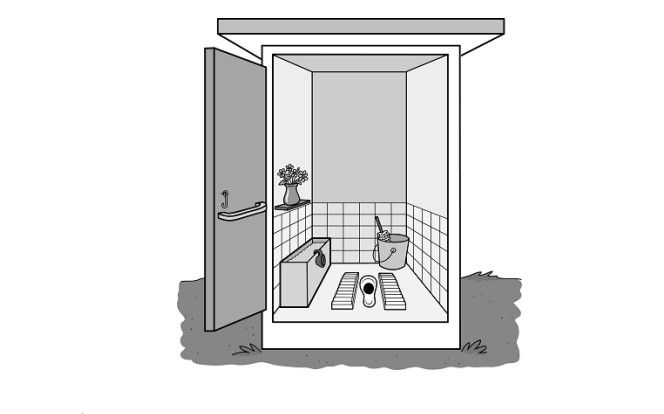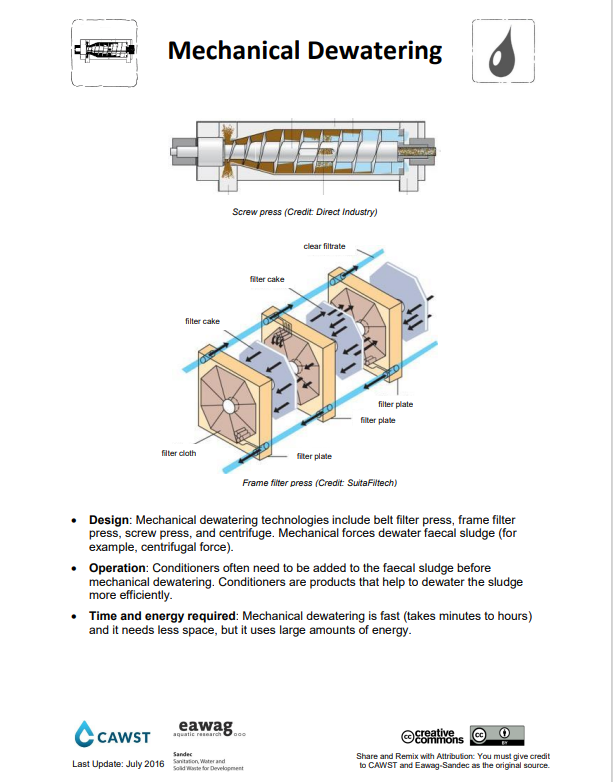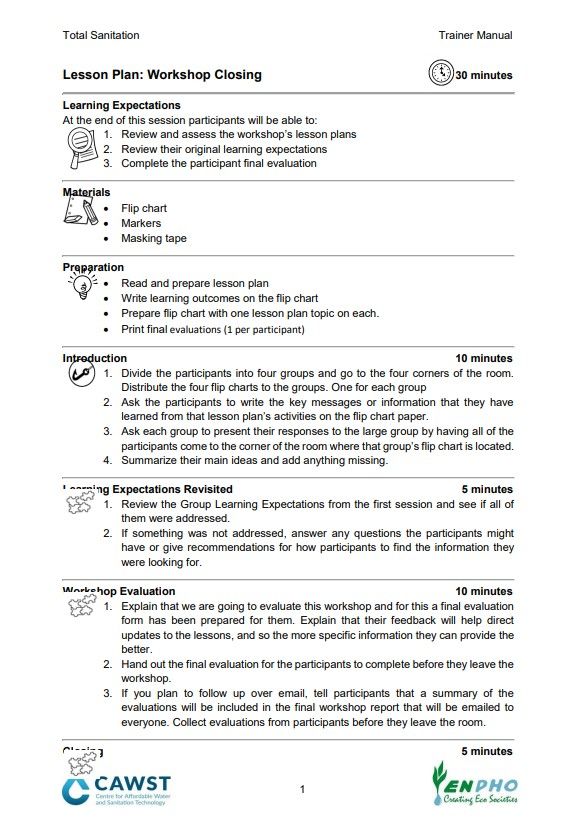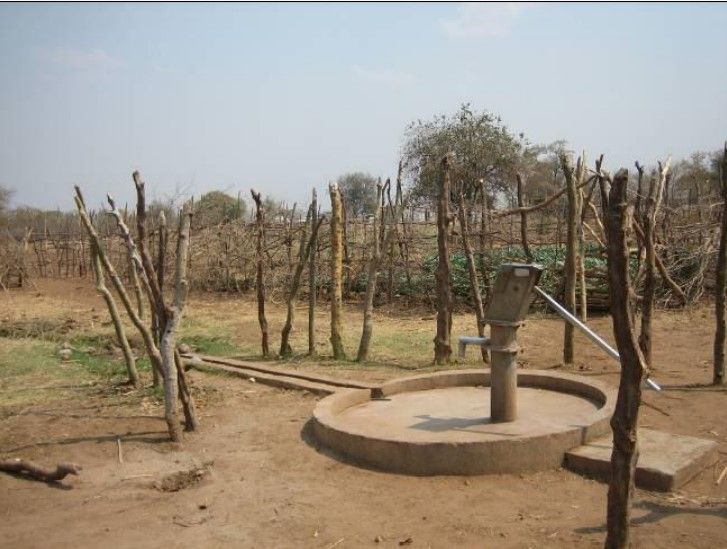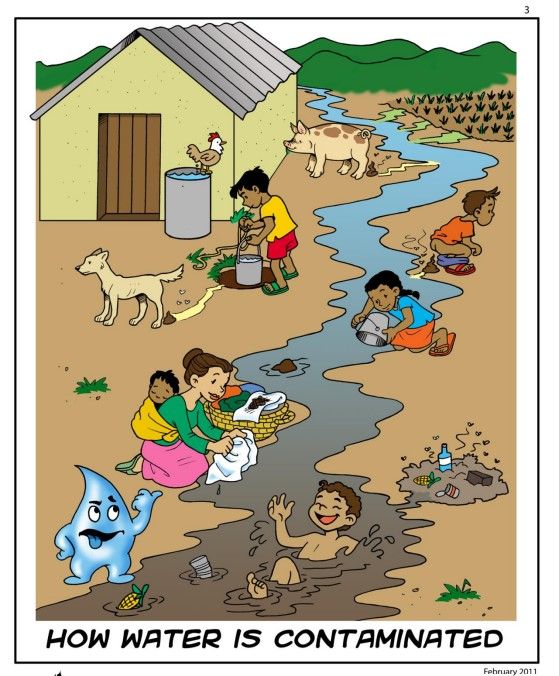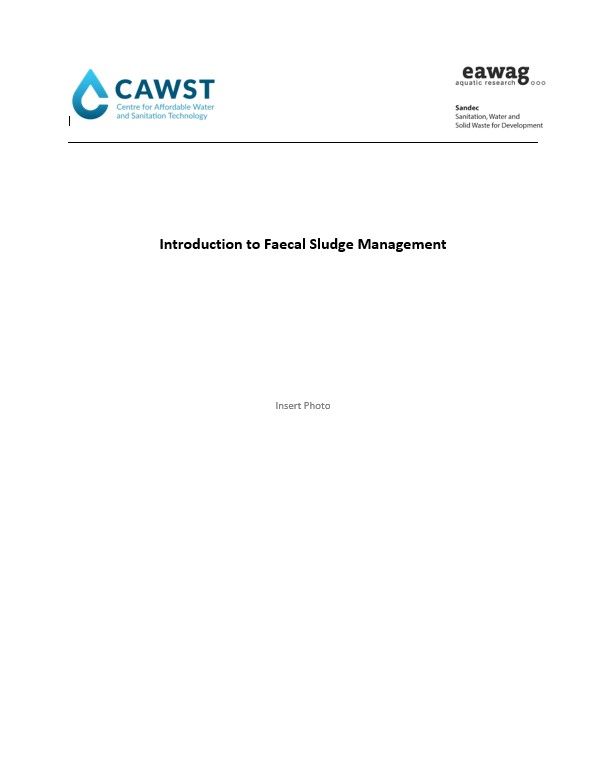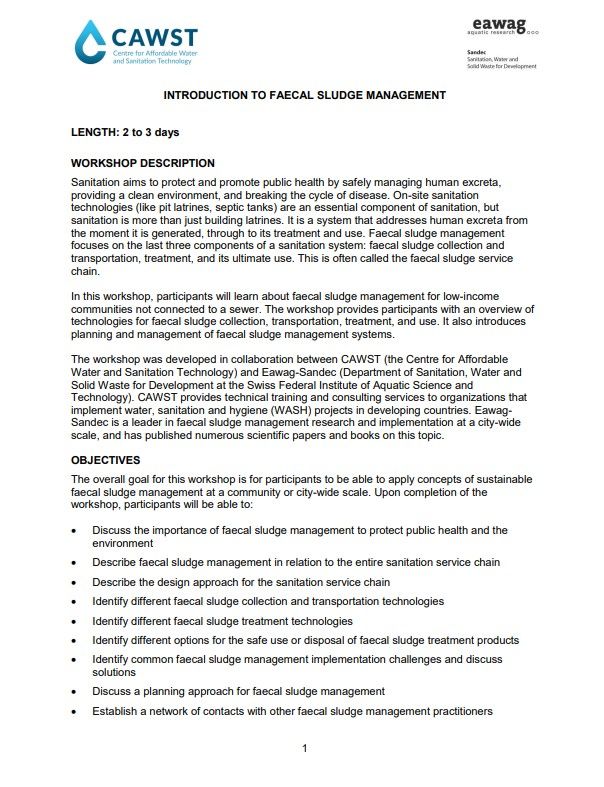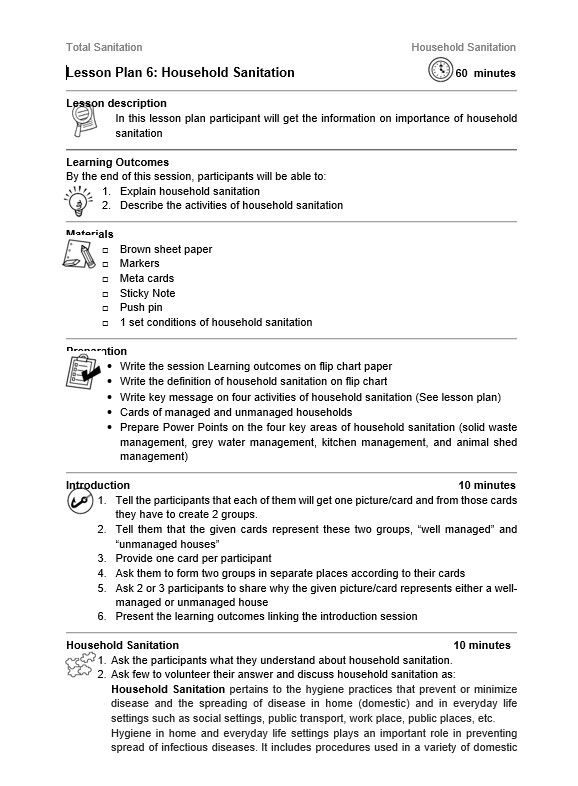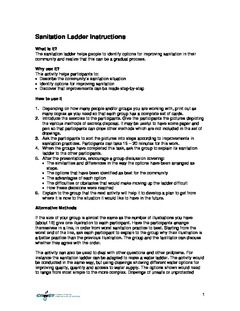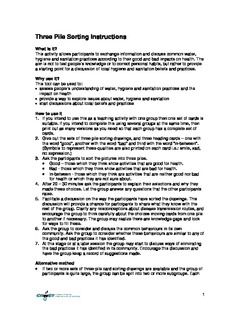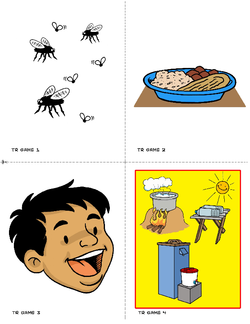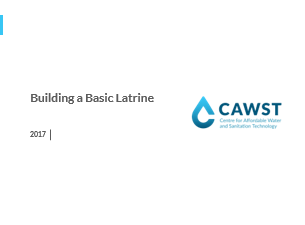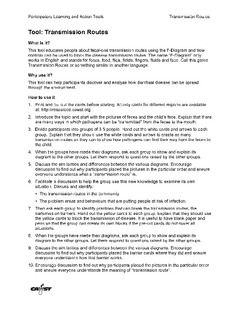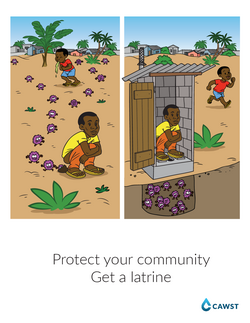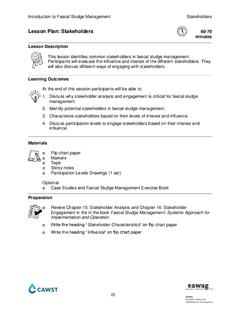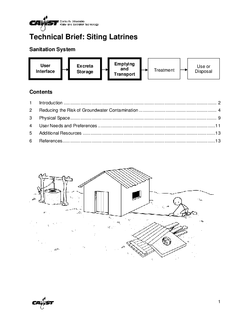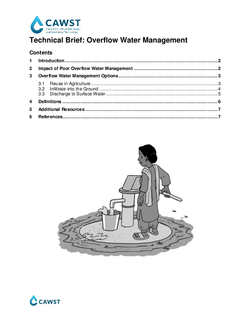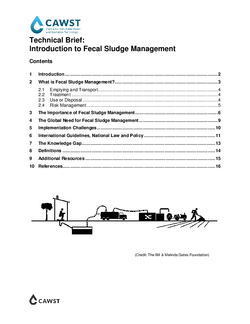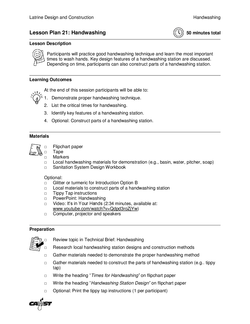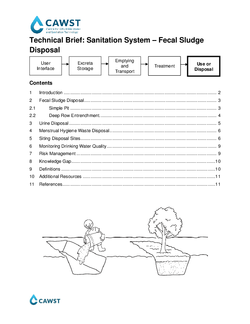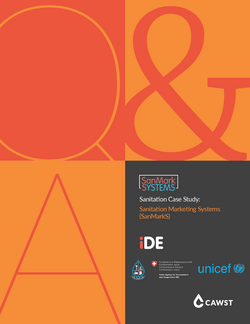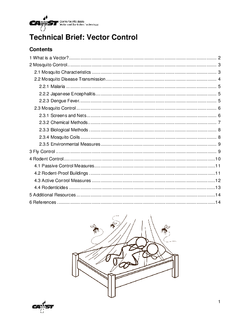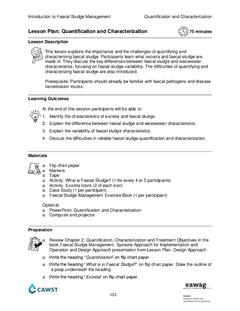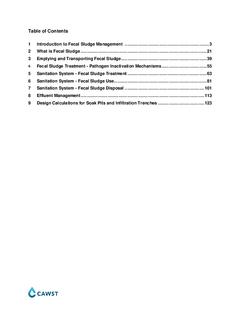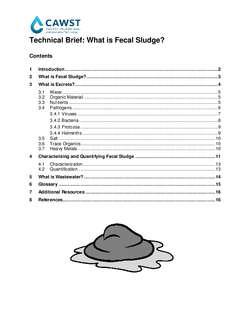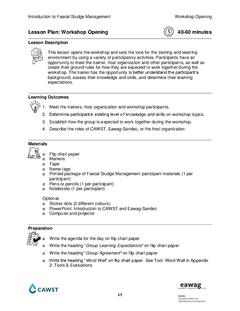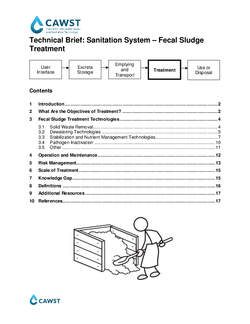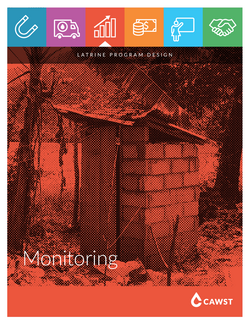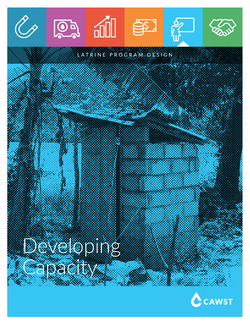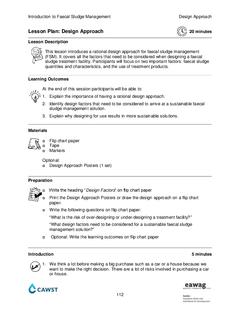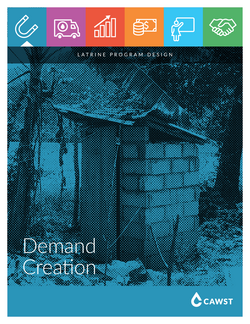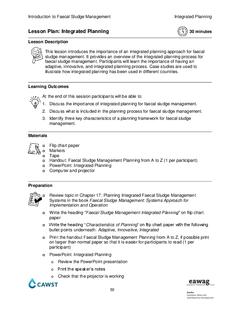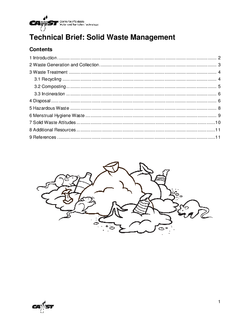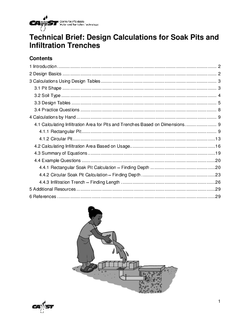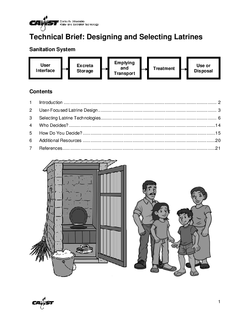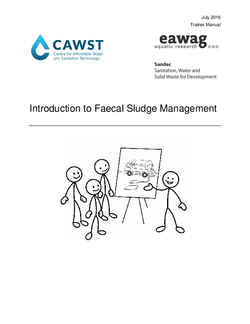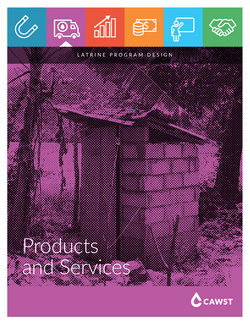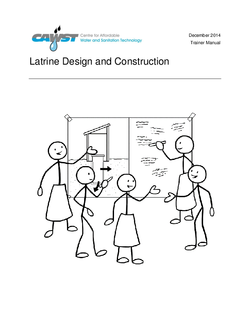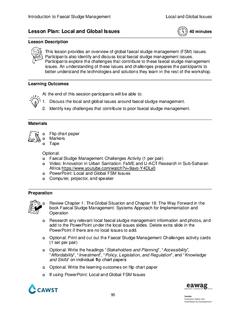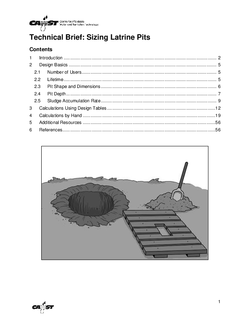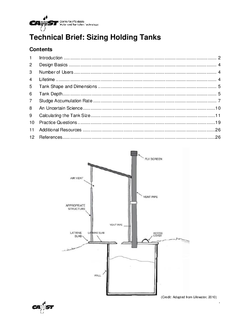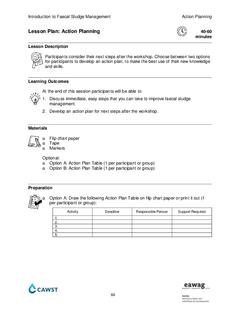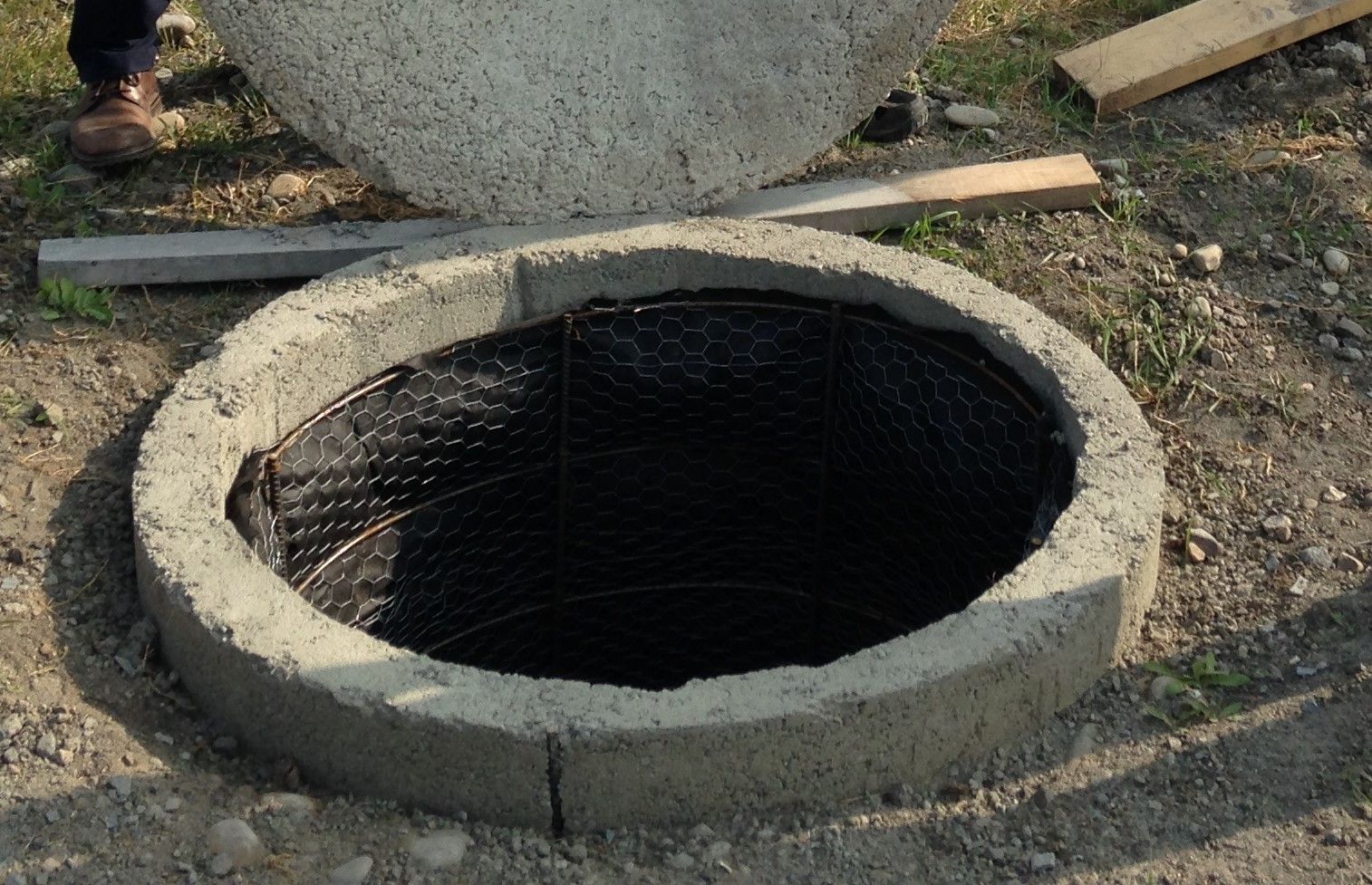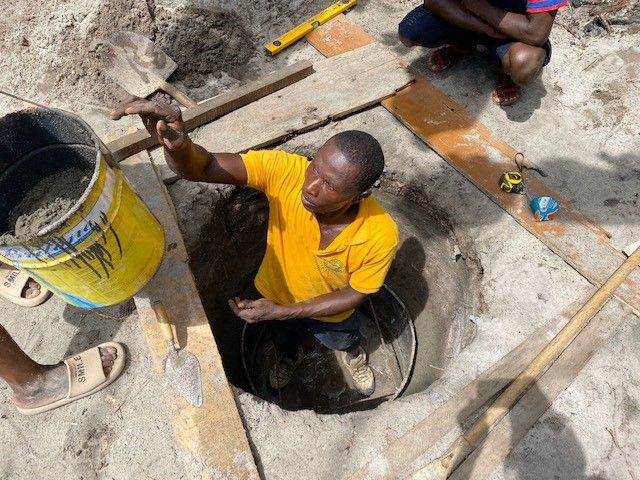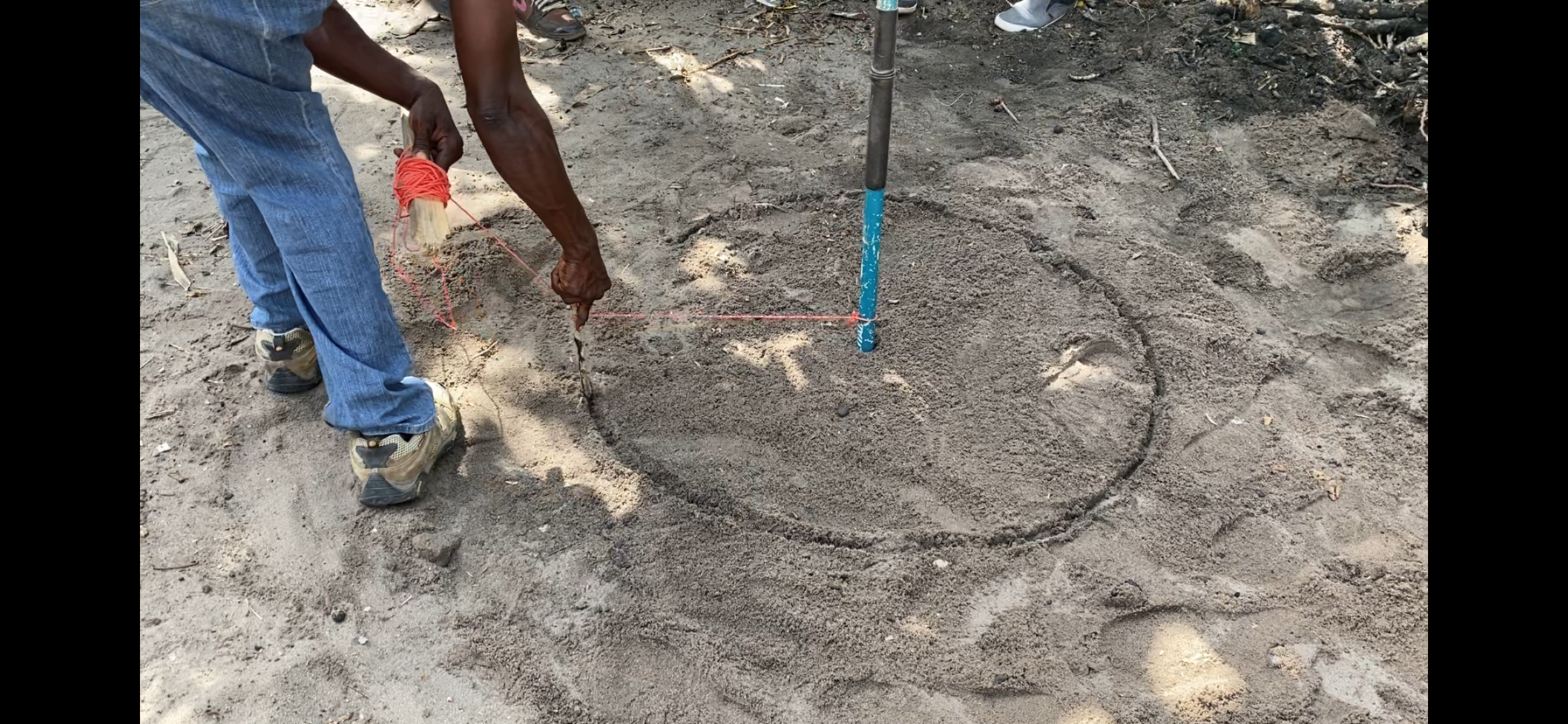Explore Sanitation
Smart Latrines Catalogue
This catalogue, developed as part of the Global Affairs Canada (GAC) project, is used to help identify practical, low‑cost upgrades for latrines and to motivate action by linking common sanitation problems with specific solutions . It’s a field‑friendly tool to guide selection, discuss benefits, and capture local pricing and supplier details.
Languages
English
Amharic
Smart Latrines Poster
This poster, developed as part of the Global Affairs Canada (GAC) project, is designed to promote affordable latrine upgrades that improve hygiene, safety, and durability for families. It highlights three key solutions and encourages households to enhance comfort and prevent common sanitation issues.
Languages
English
Amharic
Menstrual Hygiene Management
This collection contains the resources for both trainers and participants on menstrual hygiene management. These materials are designed for organizations introducing menstrual hygiene management.
Languages
Spanish
English
French
Khmer
Amharic
Sanitation System - Emptying Latrines and Transporting Sludge
Provides an introduction to pit emptying, methods available and examples of existing machines or technologies that can be used.
Languages
Spanish
French
English
Khmer
Introduction to Environmental Sanitation Technical Brief
This technical brief describes what environmental sanitation is and its importance along with describing a project framework for environmental sanitation implementation.
Languages
Spanish
French
English
Khmer
Environmental Sanitation Technical Briefs
This is a package of all the technical briefs used in the Environmental Sanitation workshop.
Languages
Spanish
English
French
Khmer
Environmental Sanitation: Sanitary Inspection Forms
These forms are used to evaluate the risk of environmental sanitation contamination in a community. It includes forms for animal excreta management, domestic wastewater management, excreta management, hygiene practices, public facilities, solid waste management and vector control.
Languages
English
Spanish
French
Environmental Sanitation Inspection Forms
These forms are used to evaluate the risk of environmental sanitation contamination in a community. This package includes the forms for animal excreta management, domestic wastewater management, excreta management, hygiene practices, public facilities, solid waste management and vector control.
Languages
English
Spanish
French
Pit Latrine Emptying Technology Review: The PuPu Pump
The technical brief, developed by OPERO Services and CAWST, provides an overview of the PuPu Pump, a portable, high-efficiency faecal sludge management tool.
Languages
English
French
Spanish
The PuPu Pump
Instructional videos and a technical overview covering the PuPu Pump’s operation, performance, and safe handling.
Languages
English
French
Spanish
The PuPu Pump: Lessons from Burkina Faso
In this installment of the Onsite Sanitation Learning Series, we dive into the effectiveness of the PuPup Pump with Alidou Bande in Burkina Faso.
Languages
English
The PuPu Pump: A Kenya User Experience
In this video, Dickens Ochieng, from the Sanitation Services company Gasia Poa shares how the Pupu Pump has transformed his work in sanitation.
Languages
English
Meet the PuPu Pump: a portable game-changer for pit emptying
The PuPu Pump is changing the game in safe sanitation. This fully mechanized, portable device helps sanitation workers empty pit latrines efficiently, even in areas where vacuum trucks can’t reach.
Languages
English
Competency Frameworks
This collection of competency frameworks can be used by individuals and organizations in two main ways: Assess job performance and compare it against defined standards Identify potential areas for professional development to improve overall performance Competencies are the abilities required to perform specific tasks and express specific knowledge. CAWST’s competency frameworks use behavioural or task-based competencies in combination with knowledge components.
Languages
Spanish
French
English
Environmental Sanitation Trainer Manual
This manual is for trainers who are interested in delivering training on environmental sanitation. It includes lessons plans and guidance on training delivery.
Languages
Spanish
English
French
Stabilized Soil Pit Lining - Liberia Pilot Project
This video shows how to construct a Stabilized Soil Lining for latrine pits in sandy soil in Liberia, West Africa.
Languages
English
Building a Basic Latrine - Lesson Plan (CWP)
Participants will discuss the challenges of a household building their own latrines. They will also learn about the main parts of a basic latrine and latrine siting.
Languages
English
Arabic
French
Spanish
Correct Use and Maintenance of Latrines - Lesson Plan (CWP)
This lesson introduces participants to latrine cleanliness, maintenance activities, and the frequency in which they should occur.
Languages
English
Arabic
French
Spanish
Sanitation Ladder - Lesson Plan (CWP)
Participants will explore how to evaluate why different sanitation practices are better than others. They will also discuss the advantages and challenges of improving sanitation options
Languages
English
Arabic
French
Spanish
Community WASH Promotion (CWP) Workshop
These workshop materials contain the resources for the Community WASH Promotion workshop. The role of the Community WASH Promoter is essential for the successful implementation of any household water treatment, sanitation, or hygiene (WASH) project. Through this workshop, participants will gain a clear understanding of the best practices for supporting community members in changing their behaviours of WASH practices with the aim of achieving improved community livelihoods.
Languages
English
Spanish
French
Arabic
Hindi
nt
Games and Activities
Use these activities and games to facilitate group understanding of water, sanitation, and hygiene.
Languages
French
English
Spanish
nt
Pit Latrine Emptying Technology Review: The Gulper1
The technical brief, developed by OPERO Services and CAWST, provides an in-depth overview of the Gulper, a manually-operated pump designed for emptying wet or partially wet pit latrines.
Languages
English
French
HydrAid Water, Sanitation and Hygiene Poster Set
This poster presentation can be used as a participatory learning tool by Community Health Promoters (CHP) in a variety of situations to: • Teach about safe water, hygiene and sanitation practices in general; • Introduce new household water treatment technologies; • Train people how to operate and maintain their household water treatment technology; and • Reinforce messages about household water treatment, hygiene and sanitation on a return visit to a household.
Languages
nt
English
Cholera Prevention Poster
This poster was created by the Haitian government using CAWST's images to educate people about how to prevent cholera.
Languages
Spanish
Haitian Creole
French
English
Mapping trends in rural and decentralized sanitation projects in Colombia
Mapping trends in rural and decentralized sanitation projects in Colombia
Languages
Spanish
Stabilized Soil Latrine Pit Lining
These videos show you how to construct stabilized soil lining for a latrine pit in sandy soil or unstable soil.
Languages
English
Humanitarian Design Workshop - Activity Cards
This hands-on lesson challenges students to use simple materials and design a technology to address a water, sanitation or hygiene issue faced by people living in developing countries. In this lesson students assess their designs using real-world criteria to determine the effectiveness and sustainability of their solutions.
Languages
English
Humanitarian Design Workshop - Lesson Plan
This hands-on lesson challenges students to use simple materials and design a technology to address a water, sanitation or hygiene issue faced by people living in developing countries. In this lesson students assess their designs using real-world criteria to determine the effectiveness and sustainability of their solutions.
Languages
English
Happy Toilet World of Toilets Activity
Use this activity to show how toilets look around the world. This activity was used as part of a behaviour change intervention to promote cleaning and regular toilet maintenance in Nepal.
Languages
English
Solid Waste Management - Lesson Plan (Intro to WASH)
This lesson introduces integrated solid waste management and the different stages where intervention activities can be effective, including collection, recycling, composting, burning and final disposal.
Languages
English
Domestic Wastewater Management - Lesson Plan (Intro to WASH)
This lesson explains the differences between blackwater, greywater, and overflow water. It focuses on the proper management of greywater and overflow water to protect public health and the environment. A demonstration is used to visually show what greywater looks like and how it is separated using a grease trap. For blackwater management, see Lesson Plan: Human Excreta Management.
Languages
English
Water Contamination - Lesson Plan (Intro to WASH)
Participants explore the different ways that water can become contaminated, diseases caused by water contaminants, and explain the different types of pathogens.
Languages
English
Vector Control - Lesson Plan (Intro to WASH)
This lesson introduces common disease vectors related to environmental sanitation. The focus is placed on mosquito and rodent control.
Languages
English
Animal Excreta Management - Lesson Plan (Intro to WASH)
This lesson introduces zoonotic diseases related to animal excreta and the importance of animal excreta management. Three different participatory activities are given as options for participants to learn about different diseases, their transmission routes and prevention methods.
Languages
English
Water, Hygiene and Sanitation Presentation Cover
Water, Hygiene and Sanitation Presentation Cover
Languages
English
French
Haitian Creole
Swahili
Spanish
Use a Latrine and Fences
Use a latrine and fences to stop the transmission of microbes from faeces.
Languages
French
Swahili
English
Spanish
Use Good Sanitation
Good sanitation habits prevent transmission of microbes (latrines, soak pits, fences, waste disposal).
Languages
Haitian Creole
English
Spanish
French
Swahili
COVID-19 Summary for Sanitation Professionals
This technical brief summarizes what is known about COVID-19 and sanitation, including the risks related to exposure to wastewater and fecal sludge, and offers tips on how to safely continue offering latrine and septic tank emptying services during the outbreak.
Languages
English
Spanish
French
COVID-19 Safety for Emptiers
This poster offers quick tips for sanitation professionals (including emptiers) on how to keep themselves and their clients safe and healthy during the COVID-19 outbreak.
Languages
English
Spanish
French
Happy Toilet Sticker
This sticker was given to households to celebrate their "Happy Toilet". It was used as part of a behaviour change intervention to promote cleaning and regular toilet maintenance in Nepal.
Languages
English
Happy Toilet Process Poster
This poster was used to show the process for achieving "Happy Toilets". It was used as part of a behaviour change intervention to promote cleaning and regular toilet maintenance in Nepal. The intervention is called, "Happy Toilets."
Languages
English
Happy Toilet Rating Cards
These rating cards were used as part of a behaviour change intervention to promote cleaning and regular toilet maintenance in Nepal. The intervention is called, "Happy Toilets."
Languages
nt
Happy Toilets Facilitator Diary
This facilitator diary was used during a behaviour change intervention to promote cleaning and regular maintenance of toilets in Nepal. The intervention is called, "Happy Toilets."
Languages
English
Happy Toilets in Nepal Facilitator Toolkit
This facilitator (triggerer) toolkit was used for a behaviour change intervention to promote cleaning and regular toilet maintenance in Nepal. The intervention is called, "Happy Toilets."
Languages
English
Toilet Cleaning in Nepal Formative Research and Design Brief
Review the formative research findings and design brief for a behaviour change intervention promoting the behaviours to regularly clean and maintain toilets in Nepal. The intervention is called, "Happy toilets!"
Languages
English
Transport and Emptying Services: Meet or Exceed the Minimum Requirements
Through this lesson, you will learn how to make sure the emptying and transport services being provided to camps meet or exceed the minimum requirements.
Languages
Spanish
French
English
Arabic
Introduction to Understanding Behaviour (LPD)
This document provides suggested activities and questions for understanding behaviour.
Languages
English
Panau Latrine Program Mystery (LPD)
This document provides suggested activities and questions for completing the Panau Village mystery.
Languages
English
Workshop Closing - Lesson Plan (LPD)
This lesson closes the workshop by having participants reflect on their learning, conduct a self-assessment, review the learning outcomes, and complete a final evaluation. The workshop certificates are distributed to the participants and closing remarks are made.
Languages
Spanish
French
English
Latrine Program Design Trainer Manual
This manual is for trainers who are interested in delivering training on latrine program design. It includes lesson and module plans on stakeholder engagement, demand creation, products and services, finances, capacity development and monitoring.
Languages
Spanish
French
English
Workshop Introduction - Lesson Plan (LPD)
This lesson opens the workshop and sets the tone for the training and learning environment by using a variety of participatory activities. Participants have an opportunity to meet the trainer, host organization and other participants, as well as create their ground rules for how they are expected to work together during the workshop. The trainer has the opportunity to better understand the participant’s background, assess their knowledge and skills, and determine their learning expectations.
Languages
Spanish
French
English
Products and Service - Lesson Plan (LPD)
Participants learn how to strengthen a supply chain for a latrine program.
Languages
Spanish
French
English
The Goal of a Latrine Program - Lesson Plan (LPD)
This lesson defines a latrine program goal. It also explains behaviour change.
Languages
Spanish
English
French
Demand Creation - Lesson Plan (LPD)
Participants learn how to select appropriate activities to create demand for a latrine program.
Languages
French
Spanish
English
Stakeholder Engagement - Lesson Plan (LPD)
Participants learn how to select appropriate stakeholder engagement activities for latrine program stakeholders.
Languages
Spanish
French
English
Monitoring - Lesson Plan (LPD)
Participants learn about the process of designing a monitoring system for a latrine program
Languages
Spanish
French
English
Capacity Development - Lesson Plan (LPD)
Participants learn how to select appropriate capacity development activities for latrine program stakeholders.
Languages
French
Spanish
English
Daily Opening and Closing - Lesson Plan (LPD)
This document provides suggested activities and questions for daily opening and closing activities.
Languages
Spanish
French
English
Finances - Lesson Plan (LPD)
Participants learn about designing a financial plan for a latrine program.
Languages
French
Spanish
English
Latrine Program Design Certificate Template
This is a template of certificates for participants after completing the Latrine Program Design Workshop.
Languages
English
French
Spanish
Latrine Program Design Workshop Report Template
This is a workshop report template that will guide you in writing a professional report of your Latrine Program Design Workshop.
Languages
English
Spanish
French
Latrine Program Design Workshop Outline
This outline describes the content, objectives and audience for the workshop: Latrine Program Design
Languages
English
French
Spanish
Latrine Program Design Participant List Template
This participant list template is a tool that will help you keep a database of participant information for your Latrine Program Design Workshop
Languages
English
French
Spanish
Latrine Program Design 3.5 Day Workshop Agenda for Participants
This participant agenda outlines a 3.5 day workshop including lessons and modules.
Languages
English
French
Spanish
Latrine Program Design Final Evaluation Summary
This is a template of how to display the results of your final evaluations
Languages
English
French
Spanish
Latrine Program Design Final Evaluation
This questionnaire is to be handed out at the end of the workshop to give the trainer constructive feedback on the workshop
Languages
English
French
Spanish
Latrine Program Design Pre-Workshop Questionnaire
This is a pre-workshop questionnaire template to find out more about the participants in your Latrine Program Design workshop.
Languages
English
French
Spanish
Introduction to Understanding Behaviour
This presentation is used with “Lesson Plan 4: Introduction to Understanding Behaviour” in the Latrine Program Design Trainer Manual.
Languages
English
Introduction to Program Design Framework (LPD)
This presentation is designed to support the teachings of the Program Design Framework in the Latrine Program Design Trainer Manual.
Languages
English
Capacity Development Presentation (LPD)
This presentation is designed to support Lesson Plan Capacity Development in the Latrine Program Design Trainer Manual.
Languages
Spanish
French
English
Capacity Assessment Role Cards
The purpose of the activity is to conduct a capacity assessment of masons and a sanitation business. One group is the masons and the other group is the sanitation business. Both groups will play the role of consultants conducting a capacity assessment. A consultant pairs with a mason or an individual from the sanitation business and interviews them to identify their capacity needs. After the interviews, consultants regroup and discuss their findings.
Languages
French
English
Spanish
Latrine Program Design Workbook (LPD)
This handout helps participants organize ideas, record notes, and design components of a latrine program throughout the workshop. It includes a self-assessment table, graphic organizers, and an action planning page. Participants can take this workbook home with them at the end of the workshop, to help them remember what they learned and what they committed to do with their new knowledge and skills.
Languages
French
Spanish
English
Stakeholder Engagement Presentation (LPD)
This presentation is designed to support Lesson Plan Stakeholder Engagement in the Latrine Program Design Trainer Manual.
Languages
Spanish
French
English
The Goal of a Latrine Program Presentation (LPD)
This presentation is designed to support Lesson Plan The Goal of a Latrine Program in the Latrine Program Design Trainer Manual.
Languages
Spanish
English
French
Workshop Introduction Presentation (LPD)
This presentation is designed to support Lesson Plan Workshop Introduction in the Latrine Program Design Trainer Manual.
Languages
French
Spanish
English
Finances Presentation (LPD)
This presentation is designed to support Lesson Plan Finances in the Latrine Program Design Trainer Manual.
Languages
French
Spanish
English
Demand Creation Presentation (LPD)
This presentation is designed to support Lesson Plan Demand Creation in the Latrine Program Design Trainer Manual.
Languages
French
Spanish
English
Products and Service Presentation (LPD)
This presentation is designed to support Lesson Plan Products and Services in the Latrine Program Design Trainer Manual.
Languages
French
Spanish
English
Monitoring Presentation (LPD)
This presentation is designed to support Lesson Plan Monitoring in the Latrine Program Design Trainer Manual.
Languages
Spanish
French
English
Stakeholder Role Cards (LPD)
The purpose of the activity is to identify stakeholders and analyze their power/interest for a latrine program.
Languages
Spanish
French
English
Don't Put Solid Waste in Your Latrine: Emptiers Will Be Angry Poster
Don't put solid waste in your latrine: Emptiers will be angry poster
Languages
English
Amharic
Spanish
French
Haitian Creole
Bemba
Get a Latrine: Keep Your Community Clean Poster
Get a latrine: Keep your community clean poster
Languages
English
Haitian Creole
Bemba
French
Spanish
Amharic
Soil Stability - Jar Test
Learn how to conduct a simple jar test to assess the soil composition that will help you determine an appropriate pit lining to prevent collapse.
Languages
English
Spanish
French
Arabic
It's the Pits!
In this fictional scenario, you will take on the role of a consultant that has been called in to evaluate the current sanitation situation at a camp. Through the evaluation, you will learn how to avoid common pitfalls associated with fecal sludge management for latrines built during a humanitarian crisis.
Languages
English
Spanish
French
Arabic
Too Full, Too Fast
Take this quiz to learn the common factors that can impact how quickly latrine pits will fill.
Languages
English
French
Spanish
Arabic
Critical Points for Safe Removal, Transport and Disposal of Fecal Sludge
Use this checklist to ensure that the critical points required for safe practice are met for the removal, transport and disposal of fecal sludge.
Languages
English
French
Spanish
Arabic
Critical Points Affecting Pit Filling Rates in Emergency Settings
If your latrine pits are filling quicker than you anticipated, use this list of critical points to understand what can be behind it.
Languages
English
French
Spanish
Arabic
Latrine Program Design Workshop
This collection contains the resources for both trainers and participants for the Latrine Program Design workshop. This workshop provides an overview of the six components of a successful latrine program: stakeholder engagement, demand creation, products and services, finances, capacity development, and monitoring. After participating in this workshop, participants will be able to design or strengthen a latrine program for their context. They will have a greater awareness of factors influencing behaviour change and will be better equipped to support correct, consistent, and continued use of latrines in the communities they serve. This workshop is for latrine program decision makers.
Languages
French
Spanish
English
Introduction to our Program Design Framework (LPD)
This document provides suggested activities and questions for understanding our program design framework.
Languages
English
WASH in Schools (WiS Nepal) Workshop
This collection is intended to support people who facilitate WASH in School. It is based on the practical experience of the Environment and Public Health Organization (ENPHO) and the Centre for Affordable Water and Sanitation Technology (CAWST). It has been developed specifically for the context of Nepal.
Languages
English
Emergency WASH for Volunteers (E-WASH Nepal) Workshop
This collection is for trainers who are interested in delivering training on Emergency WASH for volunteers in the context of Nepal. It was developed following the 2015 earthquake in Nepal. It includes lesson plans, agendas, and guidance on training delivery.
Languages
English
Total Sanitation (3-Day Nepal) Workshop
This workshop is especially designed targeting total sanitation in community. With the whim of attaining open defecation free, the focus is shifted in constructing latrine; the quantitative goal only. However, this workshop is more focused on WASH details and headed to achieve safe water, improved sanitation, proper hygiene and their sustainability. Along with total sanitation, the flavor of delivering effective training adds up more weightage in training, with knowledge enhance the knowledge as well as skill of the trainer.
Languages
English
Total Sanitation (2-Day Nepal) Workshop
This workshop, 2 days training on Total Sanitation, is the first in a series targeting the community who has achieved the ODF situation. This training is the level after declaration of ODF. The workshop uses participatory methods to cover the Concept and Importance of Total Sanitation, Components of Total Sanitation, Water quality, Points of Use options, importance and safe use of latrine, household Sanitation, Hygiene, Key message on Total Sanitation, and Tips on communicating with groups.
Languages
English
WASH for Recovery (WASH-R Nepal) Workshop
This workshop is intended to support people who facilitate WASH awareness workshops. It is based on the practical experience of the Environment and Public Health Organization (ENPHO) and the Centre for Affordable Water and Sanitation Technology (CAWST). It has been developed specifically for the context of Nepal. The lessons are for WASH promoters and work well for participants with low levels of literacy. Each lesson comes with the materials needed or instructions on how to build the necessary materials.
Languages
English
Environmental Sanitation - Lesson Plan (TS3 Nepal)
This lesson plan focuses on the description of environmental sanitation and the role of individual, household and community to attain environment sanitation.
Languages
English
Public Facilities Environmental Sanitation Inspection Form
This environmental sanitation inspection form is used to evaluate the risk of contamination in a community from the condition and use of public facilities.
Languages
Spanish
English
French
Excreta Management Environmental Sanitation Inspection Form
This environmental sanitation inspection form is used to evaluate the risk of human excreta contamination in a community.
Languages
Spanish
English
French
Domestic Wastewater Management Environmental Sanitation Inspection Form
This environmental sanitation inspection form is used to evaluate the risk of wastewater contamination in a community.
Languages
English
French
Spanish
Vector Control Environmental Sanitation Inspection Form
This environmental sanitation inspection form is used to evaluate the risk of contamination from vectors such as flies, mosquitos, and rodents.
Languages
French
English
Spanish
Animal Excreta Management Environmental Sanitation Inspection Form
This environmental sanitation inspection form is used to evaluate the risk of animal excreta contamination in a community.
Languages
English
French
Spanish
Introduction to Environmental Sanitation Online Training
A video recording of the online training session on October 23, 2014 - Introduction to Environmental Sanitation. This webinar also serves as an introduction to CAWST's new environmental sanitation resources.
Languages
English
School Sanitation Technical Brief
This technical brief describes considerations and recommendations for implementing sanitation facilities in schools.
Languages
English
Spanish
French
What is Sanitation - Lesson Plan (Intro to WASH)
This lesson defines sanitation. It also explains the difference between sanitation, environmental sanitation and ecological sanitation.
Languages
English
Human Excreta Management - Lesson Plan (Intro to WASH)
This lesson introduces the five components of a sanitation system to properly manage human excreta. Participants learn about sanitation systems and discuss why the entire system must be addressed to ensure safe and sustainable sanitation.
Languages
English
Workshop Introduction - Lesson Plan (TS3 Nepal)
The focus of the introduction is to create a safe learning environment and provide an overview of the coming three days. During the introduction participants meet each other, discuss how they will work together during the workshop, develop a list of expectations, and learn about the agenda.
Languages
English
Co-Treatment with Wastewater Fact Sheet
This faecal sludge treatment fact sheet describes co-treatment with wastewater design, operation, treatment products, and treatment objectives.
Languages
French
Spanish
English
Deep Row Entrenchment Fact Sheet
This faecal sludge treatment fact sheet describes deep row entrenchment design, operation, treatment products, and treatment objectives.
Languages
French
English
Spanish
Planted Drying Bed Fact Sheet
This faecal sludge treatment fact sheet describes planted drying bed design, operation, treatment products, and treatment objectives.
Languages
Spanish
English
French
Unplanted Drying Bed Fact Sheet
This faecal sludge treatment fact sheet describes unplanted drying bed design, operation, treatment products, and treatment objectives.
Languages
English
French
Spanish
Fish Pond Fact Sheet
This faecal sludge treatment fact sheet describes fish pond design, operation, treatment products, and treatment objectives.
Languages
Spanish
English
French
Day 1 Closing - Lesson Plan (TS2 Nepal)
This lesson plan contains a review for day one of the workshop. The review activities allow participants an opportunity to practice what they learned during the day.
Languages
English
Treatment Objectives Presentation (FSM)
This presentation is used in a lesson that: identifies different treatment objectives, relates the environmental, health and logistics impacts to each treatment objective, lists seven ways pathogens can be inactivated, discusses the challenges in monitoring pathogen inactivation from faecal sludge. (Designed for Lesson Plan Treatment Objectives in the Faecal Sludge Management Trainer Manual.)
Languages
English
Spanish
French
Thermal Drying Fact Sheet
This faecal sludge treatment fact sheet describes thermal drying design, operation, treatment products, and treatment objectives.
Languages
French
English
Spanish
Total Sanitation (2-Day) Nepal Trainer Manual
This manual is for trainers who are interested in delivering 2-day training on Total Sanitation in the context of Nepal. It includes lesson plans, agendas, and guidance on training delivery.
Languages
English
Environmental Sanitation 2 Day Workshop Agenda for Trainers
This trainer agenda outlines a 2 day workshop that gives an overview of all aspects of environmental sanitation.
Languages
French
English
Spanish
Storage Fact Sheet
This faecal sludge treatment fact sheet describes storage design, operation, treatment products, and treatment objectives.
Languages
French
English
Spanish
Vermifilter Fact Sheet
This faecal sludge treatment fact sheet describes vermifilter design, operation, treatment products, and treatment objectives.
Languages
English
Spanish
French
Black Soldier Fly Larvae Fact Sheet
This faecal sludge treatment fact sheet describes black soldier fly larvae design, operation, treatment products, and treatment objectives.
Languages
Spanish
English
French
Vermicomposting Fact Sheet
This faecal sludge treatment fact sheet describes vermicomposting design, operation, treatment products, and treatment objectives.
Languages
Spanish
French
English
WASH Policy and Plan - Lesson Plan (TS3 Nepal)
This lesson plan is to focus on the WASH plan and policy formed by government of Nepal and to familiarize it.
Languages
English
Gramalaya in India - Sanitation Case Study
CAWST’s Latrine Program Implementation Case Studies give detailed overviews of different latrine programs. Each case study describes how the implementer(s) addressed seven components of latrine programs, and what challenges they have faced.
Languages
English
French
Spanish
Plant Pond Fact Sheet
This faecal sludge treatment fact sheet describes plant pond design, operation, treatment products, and treatment objectives.
Languages
Spanish
English
French
SNV in Cambodia - Sanitation Case Study
CAWST’s Latrine Program Implementation Case Studies give detailed overviews of different latrine programs. Each case study describes how the implementer(s) addressed seven components of latrine programs, and what challenges they have faced.
Languages
English
Spanish
French
Importance and Safe Use of Latrines - Lesson Plan (TS2 Nepal)
In this lesson plan participant will identify the medium of communicable disease transmission, identify different types of latrine and its necessity for safe disposal of feces.
Languages
English
Risk Management Presentation (FSM)
This presentation is used in a lesson that: discusses the risks of faecal sludge management in relation to public health, identifies ways to reduce the risks of faecal sludge management, and explains the importance of using multiple barriers for risk reduction. (Designed for Lesson Plan Risk Management in the Faecal Sludge Management Trainer Manual.)
Languages
English
Spanish
French
Workshop Introduction - Lesson Plan (TS2 Nepal)
The focus of the introduction is to create a safe learning environment and provide an overview of the coming two days. During the introduction participants meet each other, discuss how they will work together during the workshop, develop a list of expectations, and learn about the agenda.
Languages
English
Settling Thickening Fact Sheet
This faecal sludge treatment fact sheet describes settling thickening technology design, operation, treatment products, and treatment objectives.
Languages
English
Spanish
French
Components of Total Sanitation - Lesson Plan (TS2 Nepal)
In this lesson plan, participants find the main components of total sanitation and the sub-components that are under the main components of the total sanitation.
Languages
English
Soil Composition Jar Test
Time taken to assess soil stability before building the latrines is time well spent. This job aid shows you how to conduct a simple jar test to assess the soil composition.
Languages
English
French
Spanish
Arabic
Improvement Plan Presentation (FSM)
This presentation is used in a lesson that: analyzes risks and barriers to improve faecal sludge management within a community, and develops an incremental improvement plan, including first and later steps. (Designed for Lesson Plan Integrated Planning in the Faecal Sludge Management Trainer Manual.)
Languages
English
French
Spanish
Co-composting Fact Sheet
This faecal sludge treatment fact sheet describes co-composting design, operation, treatment products, and treatment objectives.
Languages
Spanish
French
English
Key Messages on Total Sanitation - Lesson Plan (TS2 Nepal)
In this lesson plan, participant will get the key message on water, sanitation, hygiene, safe and hygienic food, kitchen management.
Languages
English
Incineration Fact Sheet
This faecal sludge treatment fact sheet describes incineration design, operation, treatment products, and treatment objectives.
Languages
Spanish
English
French
Water Conservation - Lesson Plan (TS3 Nepal)
The focus of this lesson is to share the importance of water conservation, various techniques to conserve water along with use of alternate source of water; rain water as a solution to water scarcity.
Languages
English
Integrated Planning Presentation (FSM)
This presentation is used in a lesson that: discusses the importance of integrated planning for faecal sludge management, discusses what is included in the planning process for faecal sludge management, and identifies three key characteristics of a planning framework for faecal sludge management. (Designed for Lesson Plan Integrated Planning in the Faecal Sludge Management Trainer Manual.)
Languages
Spanish
English
French
Hygiene - Lesson Plan (TS3 Nepal)
This lesson focuses on providing participants with critical information about hand washing and maintaining hygiene during menstruation along with personal hygiene and food hygiene. Participants will explore issues and also identify strategies to resolve those issues and maintain good hygienic practices.
Languages
English
Quantification and Characterization Presentation (FSM)
This presentation is used in a lesson that: identifies the characteristics of excreta and faecal sludge, explains the difference between faecal sludge and wastewater characteristics, explains the variability of faecal sludge characteristics, and discusses the difficulties in reliable faecal sludge quantification and characterization. (Designed for Lesson Plan Quantification and Characterization in the Faecal Sludge Management Trainer Manual.)
Languages
English
Spanish
French
Ammonia Treatment Fact Sheet
This faecal sludge treatment fact sheet describes ammonia treatment design, operation, treatment products, and treatment objectives.
Languages
French
Spanish
English
Slab Design Presentation (LDC)
This presentation is designed to support Lesson Plan 12 in the Latrine Design and Construction Trainer Manual.
Languages
Spanish
French
English
Alkaline Treatment Fact Sheet
This faecal sludge treatment fact sheet describes alkaline treatment design, operation, treatment products, and treatment objectives.
Languages
French
English
Spanish
Water Quality - Lesson Plan (TS3 Nepal)
The focus of this lesson is to explain safe water and differentiate clean water and filthy water.
Languages
English
Anaerobic Digestion Fact Sheet
This faecal sludge treatment fact sheet describes anaerobic digestion design, operation, treatment products, and treatment objectives.
Languages
Spanish
French
English
Pelletizing Fact Sheet
This faecal sludge treatment fact sheet describes pelletizing design, operation, treatment products, and treatment objectives.
Languages
French
English
Spanish
Learn About Sanitation for Emergency Contexts
A collection of short e-learning tools and job aids to guide sanitation officials regarding emptying, transport and treatment/disposal (fecal sludge management) appropriate for humanitarian contexts.
Languages
English
Spanish
French
Arabic
Indoor Air Pollution - Lesson Plan (TS3 Nepal)
This lesson focuses on describing indoor air pollution, main causes of air pollution inside house. This lesson plan also discuss impacts of indoor air pollution and identifies the 4 possible solutions to mitigate the indoor air pollution.
Languages
English
Tips on Communicating with Groups - Lesson Plan (TS2 Nepal)
In this lesson plan, participant will acquire the tips to communicate in the group.
Languages
English
Environmental Sanitation 2.5 Day Workshop Agenda for Trainers
This trainer agenda outlines a 2.5 day workshop that gives an overview of all aspects of environmental sanitation and gives participants practical experience with environmental sanitation inspections.
Languages
French
English
Spanish
Collection and Transport Presentation (FSM)
This presentation is used in a lesson that: describes faecal sludge collection and transport process from a household to a treatment facility, identifies suitable faecal sludge collection and transport methods for the local context, and identifies challenges and solutions for improving faecal sludge collection and transport. (Designed for Lesson Plan Collection and Transport in the Faecal Sludge Management Trainer Manual.)
Languages
English
French
Spanish
Introduction to Total Sanitation - Lesson Plan (TS3 Nepal)
The focus of this lesson is to know the total sanitation approach and its 5+1 indicators. Also understand the water, sanitation and hygiene status: National, International and local as well.
Languages
English
Waste Management - Lesson Plan (TS3 Nepal)
The focus of this lesson is to identify and explain types of waste and describe its different management techniques and practices.
Languages
English
Operation and Maintenance Presentation (FSM)
This presentation is used in a lesson that: identifies common operational challenges of faecal sludge treatment facilities, discusses the importance of a monitoring plan to ensure a faecal sludge treatment facility is operating as designed, and discusses methods of ensuring that industrial sludge is not discharged at faecal sludge treatment facilities. (Designed for Lesson Plan Operation and Maintenance in the Faecal Sludge Management Trainer Manual.)
Languages
French
English
Spanish
Introduction to CAWST and Eawag-Sandec Presentation (FSM)
This presentation is used in a lesson that: describes the roles of CAWST and Eawag-Sandec in developing the Introduction to Faecal Sludge Management workshop. (Designed for Lesson Plan Workshop Opening in the Faecal Sludge Management Trainer Manual.)
Languages
English
Spanish
French
Concept and Importance of Total Sanitation - Lesson Plan (TS2 Nepal)
In this lesson plan, participants will get a vision on Total Sanitation and its importance. It also focuses on the roles and responsibilities of individuals (PNGOs, field mobilizer).
Languages
English
Water Safety Plan - Lesson Plan (TS3 Nepal)
This lesson plan focuses on describing water safety plan and its implementation steps along with focusing on importance of the disaster / climate resilient water safety plan.
Languages
English
Sustainable Total Sanitation - Lesson Plan (TS3 Nepal)
This lesson focuses on the sustainability of total sanitation after attaining it in the community and understanding the need of sustainable total sanitation. Also, the lesson plan focuses on the interventions to be considered to sustain total sanitation.
Languages
English
Water Quality - Lesson Plan (TS2 Nepal)
This lesson describes about safe water and clean water. It highlight on drinking water protection from the point of origin to the end.
Languages
English
Total Sanitation (3-Day) Nepal Trainer Manual
This manual is for trainers who are interested in delivering 3-day training on Total Sanitation in the context of Nepal. It includes lesson plans, agendas, and guidance on training delivery.
Languages
English
Financial Transfers Presentation (FSM)
This presentation is used in a lesson that: identifies stakeholders involved in financial transfers in faecal sludge management, lists different types of financial transfers that play a role in faecal sludge management, identifies different financial flow models for faecal sludge management, and discusses the complexity of stakeholders and financial interactions in faecal sludge management. (Designed for Lesson Plan Financial Transfers in the Faecal Sludge Management Trainer Manual.)
Languages
English
French
Spanish
Sanergy in Kenya - Sanitation Case Study
CAWST’s Latrine Program Implementation Case Studies give detailed overviews of different latrine programs. Each case study describes how the implementer(s) addressed seven components of latrine programs, and what challenges they have faced. Each case study is in a “Question and Answer” format.
Languages
French
Spanish
English
PWW in Honduras - Sanitation Case Study
CAWST’s Latrine Program Implementation Case Studies give detailed overviews of different latrine programs. Each case study describes how the implementer(s) addressed seven components of latrine programs, and what challenges they have faced.
Languages
English
French
Spanish
Emergency Sanitation - Lesson Plan (E-WASH Nepal)
The focus of this lesson is to outline the important considerations for excreta management and temporary latrine siting and construction during emergency situations. Participants will discuss the increased importance of sanitation during disasters and select appropriate technologies for temporary disaster relief.
Languages
English
15 Questions to Ask Yourself When Siting a Latrine
15 questions to ask yourself when choosing a location to site a latrine, particularly to access for emptying.
Languages
English
Arabic
Spanish
French
Environmental Sanitation Workshop
This collection contains the resources for both trainers and participants for the Environmental Sanitation workshop. This two-three day workshop is designed for WASH, community development and health organizations. The workshop explores the relationship between environmental sanitation, disease transmission and health. It addresses technical topics such as human excreta management including different latrine designs; animal excreta management; solid waste management; vector control for mosquitos and rodents; and domestic wastewater management.
Languages
English
Spanish
French
Khmer
Faecal Sludge Management (FSM) Workshop
These workshop materials contain the resources for both trainers and participants for CAWST and Eawag-Sandec's Introduction to Faecal Sludge Management (FSM) workshop. Workshop participants may also download the book Faecal Sludge Management: Systems Approach for Implementation and Operation at www.sandec.ch/fsm_book.
Languages
Spanish
English
French
Latrine Design and Construction Workshop
This collection contains the resources for both trainers and participants for the Latrine Design and Construction workshop. This five day workshop is designed for latrine project implementers and masons. In this workshop, participants will learn how to design and construct latrines for low-income communities not connected to a sewerage system. The focus is on designing latrines that are technically and environmentally appropriate, and that people will actually want and use.
Languages
French
English
Spanish
Introduction to WASH
This is an introductory level workshop that was co-developed with our partners in Afghanistan at DACAAR. This workshop is for those who are just starting to work in the Water, Sanitation, and Hygiene sector. It covers the basic of WASH which include topics of disease transmission, household water treatment, solid waste management, vector control, sanitation, hygiene, and behaviour change.
Languages
English
Protect Your Family
There are water, sanitation and hygiene practices that will protect your family.
Languages
English
Protect Your Well
Keep your well safe by placing your latrine downhill and far away from your well.
Languages
English
Spanish
Haitian Creole
French
Swahili
Proper Use of Latrines - Lesson Plan (WiS Nepal)
The focus of this lesson is on the importance of latrine in school, compare actual condition versus standard of latrine. This lesson plan also describes on the proper operation and timely maintenance of latrine in school.
Languages
English
Encouraging Latrine Use - Lesson Plan (WASH-R Nepal)
The focus of this lesson is to outline important considerations for latrine use during and after emergency situations. Participants will discuss the increased importance of sanitation as disaster relief transitions to recovery, and explore strategies for the successful management of sanitation issues.
Languages
English
Siting Latrines Presentation (LDC)
This presentation is designed to support Lesson Plan 16 in the Latrine Design and Construction Trainer Manual.
Languages
English
Spanish
French
Handwashing Presentation (LDC)
This presentation is designed to support Lesson Plan 21 in the Latrine Design and Construction Trainer Manual.
Languages
Spanish
English
French
Sanitation Steps for Flood-Prone Areas Activity
The Sanitation Steps for Flood-Prone Areas is a fun and interactive game that helps people living in flood-prone areas identify appropriate options to improve sanitation in their community. This activity was developed by Engineers Without Borders Australia (EWB) and CAWST. The document includes activity cards and facilitator instructions.
Languages
English
French
Spanish
HydrAid Water, Sanitation and Hygiene Poster Set
This poster set includes water, sanitation and hygiene (WASH) posters to teach about good WASH practices, including some household water treatment technologies. This poster set was designed with images of the HydrAid, plastic biosand filter.
Languages
nt
English
Faecal Sludge Treatment Fact Sheets
This group of fact sheets includes all the faecal sludge treatment technology fact sheets
Languages
French
Spanish
English
Faecal Sludge Management Final Evaluation Summary
This is a template for displaying the final results of your participant evaluations for your Introduction to Faecal Sludge Management workshop.
Languages
French
English
Spanish
Faecal Sludge Management 3 Day Workshop Agenda for Participants
This participant agenda outlines a 3 day workshop that gives an overview of technologies for faecal sludge collection, transportation, treatment, and use. It also introduces planning and management of faecal sludge management systems.
Languages
English
Spanish
French
Guide to CAWST Sanitation Resources
Provides an overview of CAWST's sanitation resources on Environmental Sanitation, Latrine Design and Construction, Fecal Sludge Management, and Sanitation Project Implementation. It also includes a glossary of definitions, measurement conversions, guidance on CAWST training and consulting support, and additional sanitation resources.
Languages
Spanish
English
French
Sanitation Ladder Activity
This document includes the sanitation ladder activity and instructions for facilitating the activity. The sanitation ladder activity is a participatory tool to help people to identify options for improving sanitation in their community and realize that this can be a gradual process.
Languages
English
Spanish
French
Latrines in Challenging Environments Technical Brief
Outlines various latrines or latrine modifications that can be used in challenging environments, such as in areas of frequent flooding, high groundwater, on/over water, in ground that cannot be excavated, cold climates, or fragile or remote environments.
Languages
French
Spanish
English
Local and Global Sanitation Issues Presentation (Env San)
This presentation describes local and global sanitation issues and how poor sanitation is connected to the cycle of poverty. (Designed for Lesson Plan 4 in the Introduction to Environmental Sanitation Trainer Manual)
Languages
English
Spanish
French
Local and Global Sanitation Issues (LDC)
This presentation is designed to support Lesson Plan 4 in the Latrine Design and Construction Trainer Manual.
Languages
Spanish
French
English
Excreta Treatment Use and Disposal Presentation (LDC)
This presentation is designed to support Lesson Plan 22 in the Latrine Design and Construction Trainer Manual.
Languages
English
Spanish
French
Disease Transmission Presentation (LDC)
This presentation is designed to support Lesson Plan 5 in the Latrine Design and Construction Trainer Manual.
Languages
Spanish
French
English
User-Focused Design Presentation (LDC)
This presentation is designed to support Lesson Plan 9 in the Latrine Design and Construction Trainer Manual.
Languages
Spanish
French
English
Faecal Sludge Management 3 Day Workshop Agenda for Participants with Field Trip
This participant agenda outlines a 3 day workshop that gives an overview of technologies for faecal sludge collection, transportation, treatment, and use. It also introduces planning and management of faecal sludge management systems and a field trip to view local faecal sludge management services.
Languages
English
French
Spanish
Local and Global Faecal Sludge Management Issues Presentation (FSM)
This presentation is used in a lesson that: discusses the local and global issues around faecal sludge management and identifies key challenges that contribute to poor faecal sludge management. (Designed for Lesson Plan Local and Global Issues in the Faecal Sludge Management Trainer Manual.)
Languages
English
French
Spanish
Faecal Sludge Management Participant List Template
This participant list template is a tool that will help you keep a database of participant information for your Introduction to Faecal Sludge Management Workshop
Languages
English
Spanish
French
Faecal Sludge Management Pre-Workshop Questionnaire
This is a pre-workshop questionnaire template to find out more about the participants in your Introduction to Faecal Sludge Management workshop.
Languages
English
French
Spanish
Faecal Sludge Management 2 Day Workshop Agenda for Participants
This participant agenda outlines a 2 day workshop that gives an overview of technologies for faecal sludge collection, transportation, treatment, and use. It also introduces planning and management of faecal sludge management systems.
Languages
English
French
Spanish
Faecal Sludge Management - Lesson Plan (TS3 Nepal)
This lesson plan explains Faecal Sludge Management (FSM) and its components, describes different treatment options, and suggests locally applicable faecal sludge management options.
Languages
English
Faecal Sludge Management Final Evaluation
This is the final evaluation template for participants to provide feedback after an Introduction to Faecal Sludge Management workshop.
Languages
French
English
Spanish
Introduction to Faecal Sludge Management Presentation (FSM)
This presentation is used in a lesson that: lists the five components of a sanitation service chain, identifies the three components that are called faecal sludge management, explains the difference between non-sewered and sewered sanitation systems, and identifies how faecal sludge management can effectively manage sanitation and protect public health. (Designed for Lesson Plan Introduction to Faecal Sludge Management in the Faecal Sludge Management Trainer Manual.)
Languages
Spanish
English
French
Sizing Latrines Pits Presentation (LDC)
This presentation is designed to support Lesson Plan 18 in the Latrine Design and Construction Trainer Manual.
Languages
French
English
Spanish
Sanitation System and Latrine Use - Lesson Plan (TS3 Nepal)
The focus of this lesson is to identify the gap in sanitation system and essential activities to make effective sanitation system. Latrine use is another concern of this lesson.
Languages
English
Latrine Emptying and Transporting Sludge Presentation (LDC)
This presentation is designed to support Lesson Plan 20 in the Latrine Design and Construction Trainer Manual.
Languages
English
Spanish
French
Latrine Design and Construction Technical Briefs
This is a package of all the technical briefs used in the Latrine Design and Construction workshop.
Languages
Spanish
French
English
Point of Use Options - Lesson Plan (TS2 Nepal)
In this lesson plan, participant will get the information on different types of water purification options.
Languages
English
Mechanical Dewatering Fact Sheet
This faecal sludge treatment fact sheet describes mechanical dewatering design, operation, treatment products, and treatment objectives.
Languages
Spanish
English
French
Domestic Wastewater Management Technical Brief
This technical brief describes how to manage wastewater in the home, including greywater, blackwater and overflow water. The document describes the use of grease traps, soak pits and surface water drainage.
Languages
French
Spanish
English
Workshop Closing - Lesson Plan (TS3 Nepal)
In the workshop closing, participants review what they learned and evaluate the workshop. The final closing is an opportunity to consolidate participants’ learning, gather feedback and celebrate successes.
Languages
English
Workshop Closing - Lesson Plan (TS2 Nepal)
In the workshop closing, participants review what they learned and evaluate the workshop. The final closing is an opportunity to consolidate participants’ learning, gather feedback, and celebrate successes.
Languages
English
Domestic Wastewater Management Presentation (LDC)
This presentation is designed to support Lesson Plan 37 in the Latrine Design and Construction Trainer Manual.
Languages
French
Spanish
English
What is Sanitation Presentation (LDC)
This presentation is designed to support Lesson Plan 3 in the Latrine Design and Construction Trainer Manual.
Languages
French
Spanish
English
Faecal Sludge Management Workshop Report Template
This is a workshop report template that will guide you in writing a professional report of your Introduction to Faecal Sludge Management Workshop.
Languages
Spanish
English
French
Faecal Sludge Management Workshop Outline
This outline describes the content, objectives and audience for CAWST and Eawag-Sandec's workshop: Introduction to Faecal Sludge Management.
Languages
English
Spanish
French
Household Sanitation - Lesson Plan (TS2 Nepal)
In this lesson plan participant will get the information on importance of household sanitation.
Languages
English
Sanitation Ladder Activity Instructions
These instructions explain how to facilitate the sanitation ladder activity with a group of people.
Languages
Spanish
English
French
Three Pile Sorting Activity Instructions
These instructions explain how to facilitate the three pile sorting activity with a group of people.
Languages
English
Spanish
French
Animal Excreta Transmission Routes Activity Instructions
These instructions explain how to facilitate the animal excreta transmission routes activity with a group of people.
Languages
French
English
Transmission Routes Activity
This document includes the transmission routes activity and instructions for facilitating the activity. The transmission routes activity is a participatory tool to educate people about how feces can make us sick. The tool also helps a group of people to identify how to stop the transmission of water-related diseases.
Languages
English
French
Spanish
Building a Basic Latrine - Presentation (CWP)
This presentation is used to support the Building a Basic Latrine Lesson Plan (CWP). It covers latrine citing, parts and functions of a latrine.
Languages
French
Spanish
English
Animal Excreta Transmission Routes Activity
This document includes the animal excreta transmission routes activity and instructions for facilitating the activity. The animal excreta transmission routes activity is a participatory tool to educate people about how feces from animals can make us sick. The tool also helps a group of people to identify how to stop the transmission of diseases related to animal excreta.
Languages
English
French
Transmission Routes Activity Instructions
These instructions explain how to facilitate the transmission routes activity with a group of people.
Languages
French
English
Spanish
Three Pile Sorting Activity
This document includes the three pile sorting activity and instructions for facilitating the activity. The three pile sorting activity is a participatory tool to help a group of people discuss common water, sanitation and hygiene practices and beliefs.
Languages
French
English
Spanish
Vector Control Presentation (Env San)
This presentation describes types of vectors, why they should be controlled, and different controlling mechanisms. (Designed for Lesson Plan 16 in Introduction to Environmental Sanitation Trainer Manual)
Languages
English
Spanish
French
FINISH in India - Sanitation Case Study
CAWST’s Latrine Program Implementation Case Studies give detailed overviews of different latrine programs. Each case study describes how the implementer(s) addressed seven components of latrine programs, and what challenges they have faced.
Languages
French
Spanish
English
Latrine Costing - Lesson Plan (LDC)
Participants discuss the different costs associated with implementing a latrine project. Latrine affordability and willingness to pay are also addressed.
Languages
French
English
Spanish
Workshop Closing - Lesson Plan (FSM)
This lesson closes the workshop by asking participants to reflect on their learning, conduct a self-assessment, review the learning outcomes, and complete a final evaluation. The workshop certificates are distributed to the participants and closing remarks are made.
Languages
English
French
Spanish
Latrine Design and Construction Participant List Template
This participant list template is a tool that will help you keep a database of participant information.
Languages
Spanish
English
French
Stakeholders - Lesson Plan (FSM)
This lesson identifies common stakeholders in faecal sludge management. Participants will evaluate the influence and interest of the different stakeholders. They will also discuss different ways of engaging with stakeholders.
Languages
French
English
Spanish
Environmental Sanitation Workshop Outline
Introduction to Environmental Sanitation Workshop Outline
Languages
Spanish
English
French
Environmental Sanitation 2.5 Day Workshop Agenda for Participants
This participant agenda outlines a 2.5 day workshop that gives an overview of all aspects of environmental sanitation and gives participants practical experience with environmental sanitation inspections.
Languages
English
Spanish
French
Siting Latrines Technical Brief
Explains where to site a latrine to avoid groundwater contamination and other potential issues, while keeping it convenient and comfortable for people to use.
Languages
French
Spanish
English
Overflow Water Management Technical Brief
This technical brief focuses on simple and low cost options available to manage overflow water.
Languages
English
Excreta Storage - Lesson Plan (LDC)
This lesson introduces different excreta storage technologies that are commonly used in developing countries, including latrine pits, tanks and chambers. Participants learn about the basic design and operation of each technology. There is an optional activity to discuss excreta storage in challenging environments.
Languages
English
Spanish
French
Latrine Design and Construction 5-Day Workshop Agenda for Trainers
This trainer agenda outlines a 5-day Latrine Design and Construction workshop.
Languages
Spanish
English
French
Introduction to Environmental Sanitation Presentation (Env San)
This presentation describes what is meant by environmental sanitation, and how it differs from other types of sanitation. (Designed for Lesson Plan 3 in the Introduction to Environmental Sanitation Trainer Manual)
Languages
English
French
Spanish
Introduction to Fecal Sludge Management
This collection contains the resources for both trainers and participants for CAWST and Eawag-Sandec's Introduction to Faecal Sludge Management workshop. This is a two-three day introductory workshop on FSM designed for various sanitation stakeholders. In this workshop, participants will learn about faecal sludge management for low-income communities not connected to a sewer. The workshop provides participants with an overview of technologies for faecal sludge collection, transportation, treatment, and use. It also introduces planning and management of faecal sludge management systemsWorkshop participants may also download the book Faecal Sludge Management: Systems Approach for Implementation and Operation at www.sandec.ch/fsm_book.
Languages
Spanish
French
English
Sanitation System - User Interface Technical Brief
Provides an introduction to the parts of a latrine that users interact with daily. Includes an overview of technology options and design considerations for the toilet, slab, superstructure, latrine accessories and handwashing station. Discusses design considerations for making latrines easy to use for various users, including children, the elderly and people with illnesses or disabilities.
Languages
Spanish
English
French
Latrine Troubleshooting - Lesson Plan (LDC)
This lesson enables participants to identify common latrine problems that they may encounter. They discuss the causes of these problems and identify potential solutions and prevention strategies. Several options are given to facilitate this lesson plan, depending on the time available and level of the participants.
Languages
French
English
Spanish
Menstrual Hygiene Management - Lesson Plan (LDC)
This lesson uses a role play activity to introduce the challenges that many women and girls have in managing their menstrual hygiene, and the impacts on their health and education. Participants will identify solutions to meet the menstrual hygiene needs of women and girls at home and in school. This can be a sensitive topic to address, especially for traditional cultures or religions where menstruation is a taboo topic and with a mixed group of male and female participants. The trainer needs to be professional and confident when discussing menstrual hygiene management to help make the environment comfortable and respectful for men and women.
Languages
English
Spanish
French
Legal Framework - Lesson Plan (FSM)
This lesson introduces the importance of having a specific legal framework for faecal sludge management. Participants discuss common challenges and identify solutions to overcome some of these challenges.
Languages
Spanish
French
English
Handwashing Lesson Plan with Tippy Tap Instructions - Lesson Plan (LDC)
Participants will practice good handwashing technique and learn the most important times to wash hands. Key design features of a handwashing station are discussed. Depending on time, participants can also construct parts of a handwashing station. Instructions on how to build a tippy tap are included.
Languages
English
Sanitation System – Fecal Sludge Disposal
Introduces two fecal sludge disposal options: (1) simple pit and (2) deep row entrenchment. It also gives guidance on how to locate a disposal site to minimize groundwater contamination, and discusses other measures to protect public health.
Languages
Spanish
English
French
Sanitation Technology Selection - Lesson Plan (LDC)
Participants create a random scenario and then identify potential sanitation options that include the first three components of the sanitation system: user experience, excreta storage, emptying and transportation. The Matrix Scoring Tool is then used to evaluate and select the most appropriate option for the scenario.
Languages
French
English
Spanish
Case Study Review - Lesson Plan (FSM)
This lesson is a review of the case studies and exercise books. Groups will present their recommendations for improving their sanitation service chain. Participants provide feedback to the groups based on the risks and opportunities they identify.
Languages
French
Spanish
English
Workshop Closing - Lesson Plan (LDC)
This lesson closes the workshop by having participants reflect on their learning, conduct a self-assessment, review the learning outcomes, and complete a final evaluation. The workshop certificates are distributed to the participants and closing remarks are made.
Languages
French
Spanish
English
Latrine Cleanliness - Lesson Plan (LDC)
This lesson introduces participants to the latrine cleanliness, maintenance activities, and the frequency with which they should occur.
Languages
Spanish
French
English
Environmental Sanitation Participant Evaluation Summary
This is a template for displaying the final results of your participant evaluations for Introduction to Environmental Sanitation.
Languages
French
Spanish
English
Hygiene Practices Environmental Sanitation Inspection Form
This environmental sanitation inspection form is used to evaluate the risk of contamination in a community from hygiene practices.
Languages
Spanish
English
French
Sanitation System - Excreta Storage Technical Brief
Provides an overview of latrine pits, tanks and chambers. Discusses possible modifications and design considerations for each.
Languages
English
French
Spanish
Latrine Design and Construction 5-Day Workshop Agenda for Participants
This trainer agenda outlines a 5-day Latrine Design and Construction workshop.
Languages
French
English
Spanish
Fecal Sludge Treatment – Pathogen Inactivation Mechanisms
Explains different ways to inactivate pathogens in fecal sludge, including time, temperature, moisture, pH, and solar radiation.
Languages
English
Spanish
French
Environmental Sanitation 2 Day Workshop Agenda for Participants
This participant agenda outlines a 2 day workshop that gives an overview of all aspects of environmental sanitation.
Languages
Spanish
French
English
Holding Tank Fact Sheet
Describes a latrine holding tank (also called a cesspit or a sealed pit, tank or chamber) to store excreta.
Languages
Spanish
French
English
Latrine Design and Construction Pre-Workshop Questionnaire
This is a short questionnaire to give your participants before the workshop so that you can better prepare for the Latrine Design and Construction workshop.
Languages
French
English
Spanish
Practical Action in Nepal - Sanitation Case Study
CAWST’s Latrine Program Implementation Case Studies give detailed overviews of different latrine programs. Each case study describes how the implementer(s) addressed seven components of latrine programs, and what challenges they have faced.
Languages
French
English
Spanish
iDE in Bangladesh - Sanitation Case Study
CAWST’s Latrine Program Implementation Case Studies give detailed overviews of different latrine programs. Each case study describes how the implementer(s) addressed seven components of latrine programs, and what challenges they have faced.
Languages
Spanish
English
French
Vector Control Technical Brief
This technical brief describes what vectors are, the diseases that they spread and how to control vectors, specifically mosquitos, flies and rodents.
Languages
French
English
Spanish
Latrine Construction Manual
Explains how to excavate and line pits, and discusses how to construct slabs, toilets and superstructures. It provides detailed instructions for constructing reinforced concrete slabs, dome slabs and SanPlats.
Languages
Spanish
English
French
Quantification and Characterization - Lesson Plan (FSM)
This lesson explains the importance and the challenges of quantifying and characterizing faecal sludge. Participants learn what excreta and faecal sludge are made of. They discuss the key differences between faecal sludge and wastewater characteristics, focusing on faecal sludge variability. The difficulties of quantifying and characterizing faecal sludge are also introduced.
Languages
Spanish
English
French
Fecal Sludge Management Technical Briefs
This is a package of all the technical briefs used in the Fecal Sludge Management workshop.
Languages
French
Spanish
English
What is Fecal Sludge
Explains the difference between excreta, fecal sludge and wastewater. It also gives an overview of how to characterize and quantify fecal sludge.
Languages
French
English
Spanish
Workshop Opening - Lesson Plan (FSM)
This lesson opens the workshop and sets the tone for the training and learning environment by using a variety of participatory activities. Participants have an opportunity to meet the trainer, host organization and other participants, as well as create their ground rules for how they are expected to work together during the workshop. The trainer has the opportunity to better understand the participant’s background, assess their knowledge and skills, and determine their learning expectations.
Languages
French
Spanish
English
Sanitation System – Fecal Sludge Treatment
Introduces the importance of fecal sludge treatment and explains different treatment objectives. It also gives an overview of emerging and established technologies available to treat fecal sludge.
Languages
French
English
Spanish
Removable Containers Fact Sheet
Describes a latrine that uses removable containers to hygienically collect excreta.
Languages
Spanish
English
French
Excavating and Lining a Latrine Pit with Bricks or Blocks - Lesson Plan (LDC)
Participants practice basic skills in latrine pit lining and footing construction. They work in groups to excavate rectangular and circular latrine pits. They will partially line the pits with bricks or blocks.
Languages
English
French
Spanish
Monitoring (LPD)
This technical brief describes the process of creating a monitoring system for a latrine program.
Languages
Spanish
English
French
Improvement Plan - Lesson Plan (FSM)
This lesson acknowledges the difficulty of implementing a complete sanitation service chain. Participants will develop an incremental improvement plan to reduce faecal transmission routes and implement a sanitation service chain.
Languages
French
English
Spanish
Operation and Maintenance - Lesson Plan (FSM)
This lesson presents an overview of common operation and maintenance challenges of faecal sludge faecal sludge treatment facilities. Participants will brainstorm appropriate solutions to overcome operation and maintenance challenges, including how to prevent receiving industrial sludge. The lesson presents the importance of developing and implementing monitoring programs.
Languages
Spanish
French
English
Effluent Management
Introduces the importance of managing effluent from fecal sludge treatment to protect public health and the environment. It also gives an overview of technologies available to manage effluent.
Languages
English
Spanish
French
Emptying Latrines and Transporting Sludge - Lesson Plan (LDC)
Participants learn about manual and motorized methods to empty latrines and transport sludge. Focus is placed on protecting the health and safety of pit emptiers and the broader community when emptying latrines. This lesson plan presents several optional activities that can be used depending on time limitations and participant needs.
Languages
English
Spanish
French
Treatment Technologies - Lesson Plan (FSM)
This lesson introduces established, transferring, and innovative faecal sludge treatment technologies. These technologies are currently in use for faecal sludge management or could be in the future. Participants learn about the treatment objectives, pathogen inactivation mechanisms, stage of development and treatment products of each technology.
Languages
Spanish
French
English
Domestic Wastewater Management Presentation (Env San)
This presentation describes the different types of domestic wastewater and the ways to manage each type. (Designed for Lesson Plan 15 in the Introduction to Environmental Sanitation Trainer Manual)
Languages
Spanish
English
French
Latrine Design and Construction Participant Evaluation Summary
This is a template for displaying the final results of your participant evaluations for your Latrine Design and Construction workshop.
Languages
French
Spanish
English
Capacity Development (LPD)
This technical brief defines capacity development and explains the process of designing a capacity development plan for a latrine program.
Languages
English
French
Spanish
Environmental Sanitation Workshop Report Template
This is a workshop report template that will guide you in writing a professional report of your Introduction to Environmental Sanitation Workshop.
Languages
French
English
Spanish
Environmental Sanitation Pre-Workshop Questionnaire
This is a short questionnaire to give your participants before the workshop so that you can better prepare for the Introduction to Environmental Sanitation workshop.
Languages
Spanish
English
French
Workshop Opening - Lesson Plan (LDC)
This lesson opens the workshop and sets the tone for the training and learning environment by using a variety of participatory activities. Participants have an opportunity to meet the trainer, host organization and other participants, as well as create their ground rules for how they are expected to work together during the workshop. The trainer has the opportunity to better understand the participant’s background, assess their knowledge and skills, and determine their learning expectations.
Languages
French
Spanish
English
Domestic Wastewater Management - Lesson Plan (LDC)
This lesson explains the differences between blackwater, greywater and overflow water. It focuses on the proper management of greywater and overflow water to protect public health and the environment. A demonstration is used to visually show what greywater looks like and how it is separated using a grease trap.
Languages
English
French
Spanish
Excreta Treatment, Use and Disposal - Lesson Plan (LDC)
This lesson is an introduction to treatment, use and disposal of excreta for the purpose of designing an entire sanitation system. Participants learn about ecosanitation and using treated excreta as a valuable product in agriculture. Participants discuss ways to encourage the social acceptance of using human excreta. They also learn different ways to safely dispose of excreta.
Languages
Spanish
French
English
Latrine Design and Construction Workshop Report Template
This is a workshop report template that will guide you in writing a professional report of your Latrine Design and Construction workshop.
Languages
Spanish
English
French
Handwashing - Lesson Plan (LDC)
Participants will practice good handwashing technique and learn the most important times to wash hands. Key design features of a handwashing station are discussed. Depending on time, participants can also construct parts of a handwashing station.
Languages
Spanish
English
French
Lining Latrine Pits - Lesson Plan (LDC)
A partial or full lining of every latrine pit is important to prevent the pit from collapsing. This lesson plan identifies five design rules to follow when lining a latrine pit. Participants will also discuss the advantages and limitations of different materials that are locally available to line a latrine pit.
Languages
Spanish
English
French
Design Approach - Lesson Plan (FSM)
This lesson introduces a rational design approach for faecal sludge management (FSM). It covers all the factors that need to be considered when designing a faecal sludge treatment facility. Participants will focus on two important factors: faecal sludge quantities and characteristics, and the use of treatment products.
Languages
French
English
Spanish
Toilets - Lesson Plan (LDC)
Participants discuss different toilet options, and the needs and preferences of different user groups to ensure that toilets are accessible and easy to use. As well, they identify key questions to consider when designing appropriate toilets. Participants will design a toilet by the end of this lesson.
Languages
Spanish
French
English
Sizing Latrine Pits - Lesson Plan (LDC)
This lesson introduces participants to the importance of sizing a pit latrine. They learn about the factors that contribute to sizing a latrine pit and the key information that is needed. Three options are given to size a latrine pit based on the numeracy level of the participants.
Languages
French
English
Spanish
Ventilated Improved Pit Latrine Fact Sheet
Describes a Ventilated Improved Pit (VIP) latrine to store excreta.
Languages
French
Spanish
English
Composting Domestic Waste Technical Brief
This technical brief describes how to compost, options for composting bins and how to use compost. It also describes vermicomposting and contains a section on troubleshooting.
Languages
French
English
Spanish
Demand Creation (LPD)
This technical brief describes how to create demand for a latrine program.
Languages
French
English
Spanish
Talking About Sanitation - Lesson Plan (LDC)
In this lesson participants will get comfortable talking about sanitation. This lesson is extremely important to get the participants to easily talk about feces, urine and defecation for the rest of the workshop. People are often uncomfortable saying words related to feces or defecation.
Languages
French
Spanish
English
Finances (LPD)
This technical brief identifies the costs of a latrine program and who pays for these costs.
Languages
Spanish
French
English
Integrated Planning - Lesson Plan (FSM)
This lesson introduces the importance of an integrated planning approach for faecal sludge management. It provides an overview of the integrated planning process for faecal sludge management. Participants will learn the importance of having an adaptive, innovative, and integrated planning process. Case studies are used to illustrate how integrated planning has been used in different countries.
Languages
English
French
Spanish
Risk Management - Lesson Plan (FSM)
This lesson introduces the importance of using multiple barriers to reduce the risk of pathogen transmission when managing faecal sludge.
Languages
French
English
Spanish
Solid Waste Management Technical Brief
This technical brief describes how to treat waste through recycling, composting and incineration. It discusses hazardous waste, menstrual hygiene waste as well as solid waste attitudes.
Languages
Spanish
French
English
Environmental Sanitation Participant Final Evaluation
This questionnaire can be handed out at the end of the Introduction to Environmental Sanitation workshop to give the trainer constructive feedback on the workshop.
Languages
Spanish
French
English
Soak Pit and Infiltration Trench Design Technical Brief
This technical brief describes basic designs and how to calculate the size of a pit or trench using design tables and by hand.
Languages
Spanish
French
English
Sanitation Promotion Presentation (Env San)
This presentation describes benefits of latrines in households in rural Benin. (Designed for Lesson Plan 21 in Introduction to Environmental Sanitation Trainer Manual)
Languages
French
English
Spanish
What is Sanitation - Lesson Plan (LDC)
This lesson defines sanitation. It also explains the difference between sanitation, environmental sanitation and ecological sanitation.
Languages
Spanish
French
English
Sanitation Systems - Lesson Plan (LDC)
This lesson introduces the five components of a sanitation system to properly manage human excreta. Participants learn about sanitation systems and discuss why the entire system must be addressed to ensure safe and sustainable sanitation.
Languages
Spanish
French
English
Designing and Selecting Latrines Technical Brief
Outlines factors to consider when selecting or designing latrines that will be appropriate for a household or community. It also explains the concept of user focused design and why it is a useful way to design latrines.
Languages
Spanish
French
English
Constructing a Latrine Pit Footing and Lining - Lesson Plan (LDC)
This is an optional practical lesson. Participants practice basic skills in latrine pit lining and footing construction. A number of practical options are available. Select the options based on the designs that will be most appropriate to the local context and where the participants are working.
Languages
English
French
Spanish
Excavating Latrine Pits - Lesson Plan (LDC)
Participants learn how to determine the latrine pit and slab diameters based on the space needed for a person to dig. They also learn safe methods to excavate a latrine pit under normal conditions and in challenging conditions, such as high groundwater or unstable soil.
Languages
English
Spanish
French
Solid Waste Management Environmental Sanitation Inspection Form
This environmental sanitation inspection form is used to evaluate the risk of contamination of water sources in a community from solid waste.
Languages
French
Spanish
English
Animal Excreta Management Technical Brief
This technical brief describes diseases related to animal excreta and how to properly treat, use and dispose of animal excreta.
Languages
English
Spanish
French
Project Framework Presentation (Env San)
This presentation describes the purpose of project frameworks and the five components of successful project frameworks. (Designed for Lesson Plan 9 in the Introduction to Environmental Sanitation Trainer Manual)
Languages
English
French
Spanish
Siting Latrines - Lesson Plan (LDC)
Participants learn about how to properly site a latrine by following general rules. Concepts include how pathogens from latrines can contaminate groundwater and how to minimize the risk through latrine design and location. Other factors such as physical space, pit size, and user needs and preferences are also taken into consideration when siting a latrine.
Languages
French
English
Spanish
Concrete Slab Construction - Lesson Plan (LDC)
Participants learn how to construct three concrete latrine slabs, including a reinforced slab dome slab and SanPlat. They will also discuss construction safety, in particular the hazards of working with cement, and know what to do in an emergency.
Languages
Spanish
French
English
Latrine Superstructures - Lesson Plan (LDC)
Participants discover the parts and characteristics of a good superstructure. They also discuss appropriate and locally available materials for building the different parts of a superstructure.
Languages
French
Spanish
English
Latrine Design and Construction Participant Final Evaluation
This is the final evaluation template for participants to provide feedback for CAWST's Latrine Design and Construction Workshop.
Languages
Spanish
English
French
User-Focused Design - Lesson Plan (LDC)
Participants learn about user-focused design in sanitation systems. Participants will identify different user groups and considerations for an inclusive latrine design.
Languages
Spanish
French
English
Faecal Sludge Management Trainer Manual
This manual is for trainers who are interested in delivering training on faecal sludge management. It includes lesson plans, agendas, and guidance on training delivery.
Languages
French
English
Spanish
Latrine Design and Construction Workshop Outline
Latrine Design and Construction Workshop Outline
Languages
Spanish
English
French
Field Trip - Lesson Plan (FSM)
A field trip gives participants the opportunity to see faecal sludge management in a realistic setting and apply their new knowledge. A field trip can be arranged to observe local latrine designs and fecal sludge characteristics as well as various faecal sludge collection, transport, treatment, use and disposal technologies.
Languages
English
French
Spanish
Environmental Sanitation Participant List Template
This participant list template is a tool that will help you keep a database of participant information.
Languages
French
Spanish
English
Latrine Parts - Lesson Plan (LDC)
Participants are introduced to the main parts of a latrine, the function of each part, and why they are important. This lesson emphasizes the need for common terminology and introduces the words that will be used throughout the rest of the workshop.
Languages
Spanish
English
French
Latrine Project Implementation - Lesson Plan (LDC)
This lesson introduces a framework to implement a sustainable and successful sanitation project. A familiar product, like a mobile phone, is used to illustrate how the components of the project framework can be applied. Example sanitation case studies from different regions are also provided to illustrate the project framework. There is an optional activity for participants to share their planned or current project in terms of the project framework. As well, there is an optional activity to discuss how gender fits into the different components of implementing a project.
Languages
French
Spanish
English
Products and Services (LPD)
This technical brief describes latrine products and services. It also explores how to strengthen a latrine supply chain.
Languages
French
Spanish
English
Introduction to Faecal Sludge Management - Lesson Plan (FSM)
This lesson introduces the sanitation service chain. It focuses on the last three components which encompass faecal sludge management (FSM): (1) collection and transportation of faecal sludge from on-site sanitation technologies, (2) faecal sludge treatment, (3) and use or disposal of faecal sludge. Participants will explore the importance of each component in protecting public health. They will also learn the difference between sewered and non-sewered sanitation systems.
Languages
French
Spanish
English
Sizing Holding Tanks - Lesson Plan (LDC)
In this lesson participants discuss what goes into a holding tank. They learn about the factors that contribute to sizing a holding tank and the key information that is needed. An example is worked through as a large group and practice questions may be done individually.
Languages
English
French
Spanish
Sanitation Poster Set
This poster set includes instructional posters as well as tools for behavior change communication.
Languages
English
Haitian Creole
Amharic
French
Spanish
Bemba
Sanitation System – Fecal Sludge Use
Introduces the benefits and challenges of using treated fecal sludge for various purposes, including agriculture and energy production. It describes different beneficial uses, along with protective measures to reduce public health and environmental risks.
Languages
French
Spanish
English
Latrine Design and Construction Trainer Manual
This manual is for trainers who are interested in delivering training on latrine design and construction. It includes lesson plans and guidance on training delivery.
Languages
French
Spanish
English
Local and Global Issues - Lesson Plan (FSM)
This lesson provides an overview of global faecal sludge management (FSM) issues. Participants also identify and discuss local faecal sludge management issues. Participants explore the challenges that contribute to these faecal sludge management issues. An understanding of these issues and challenges prepares the participants to better understand the technologies and solutions they learn in the rest of the workshop.
Languages
English
French
Spanish
Sanitation Ladder - Lesson Plan (LDC)
Participants will use the Sanitation Ladder activity to discover how some sanitation practices and latrines are better than others. They will discuss the advantages and challenges of building a latrine higher up on the ladder, and where is best for new latrine users to start on the ladder. As well, participants will discuss incremental improvements that can be made within an entire sanitation system.
Languages
English
French
Spanish
Greywater Management Technical Brief
This technical brief describes greywater characteristics and simple, low cost options available to manage greywater in the home.
Languages
English
Wood or Bamboo Slab Construction - Lesson Plan (LDC)
Participants learn how to construct a wood or bamboo slab. They will also discuss construction safety and know what to do in an emergency.
Languages
Spanish
French
English
Faecal Sludge Use (Resource Recovery) - Lesson Plan (FSM)
This lesson introduces the value of using faecal sludge (faecal sludge) treatment products. Participants will identify different treatment products and their uses. Participants will also discuss other factors that should be considered when deciding on a use, like health and environmental protection, social acceptance, and market demand.
Languages
Spanish
English
French
Collection and Transport - Lesson Plan (FSM)
Participants learn about different manual and mechanized methods to collect faecal sludge from on-site sanitation technologies and transport the faecal sludge for treatment. Through a group discussion or role-play activity the participants experience challenges that are often encountered during faecal sludge collection and transport. As well, they discuss solutions on how the challenges could be overcome.
Languages
French
English
Spanish
Designing a Sanitation System - Lesson Plan (LDC)
This lesson introduces the factors that affect the design and selection of sanitation technologies. Participants are given their Sanitation System Design Workbooks, which they will use during the workshop to design a sanitation system appropriate for their project. The focus is on designing the latrine components of the sanitation system, and will briefly address sludge treatment, use and disposal.
Languages
French
Spanish
English
Local and Global Sanitation Issues - Lesson Plan (LDC)
Participants discover the connection between sanitation and poverty. Participants will also discuss local sanitation issues and put them into a global context. An understanding of the sanitation issues prepares the participants to better understand the solutions they learn in the rest of the workshop.
Languages
Spanish
English
French
Treatment Objectives - Lesson Plan (FSM)
This lesson looks at what the term faecal sludge treatment means in the sanitation sector. It introduces four treatment objectives: (1) pathogen inactivation, (2) stabilization, (3) dewatering, and (4) nutrient management. The participants also discuss environmental, health, and logistical impacts of the treatment objectives.
Languages
Spanish
English
French
Stakeholder Engagement (LPD)
This technical brief identifies stakeholders of a latrine program and describes how to analyze and engage these stakeholders.
Languages
French
Spanish
English
Latrine Superstructure Construction - Lesson Plan (LDC)
Participants construct a latrine superstructure using locally available materials.
Languages
French
English
Spanish
Action Planning - Lesson Plan (LDC)
Participants consider their next steps after the workshop. Two options are given for participants to develop an action plan to make the best use of their new knowledge and skills.
Languages
French
English
Spanish
Water, Sanitation and Hygiene Poster Set
This poster set includes water, sanitation and hygiene (WASH) posters to teach about good WASH practices, including household water treatment technologies.
Languages
English
Khmer
Swahili
French
Haitian Creole
Spanish
Wayuu
Disease Transmission - Lesson Plan (LDC)
This lesson introduces pathogens and diseases related to poor sanitation. Participants will play the Transmission Routes activity to discover how pathogens are transmitted and how sanitation can prevent the transmission.
Languages
Spanish
English
French
Financial Transfers - Lesson Plan (FSM)
This lesson introduces financial transfers in faecal sludge management. Participants learn about different financial flow models for faecal sludge management services. They identify different stakeholders in the faecal sludge management service chain and how they relate to each other from a financial perspective.
Languages
Spanish
French
English
Introduction to Case Studies - Lesson Plan (FSM)
This lesson introduces the case studies and the exercise book. Participants will understand the purpose and structure of these two documents that they will use throughout the workshop. They will also be given time to read the case study.
Languages
French
English
Spanish
Constructing a Toilet - Lesson Plan (LDC)
Participants build a toilet from a plastic bucket for people to sit on during defecation (also called a seat or pedestal). The toilet may be urine-diverting.
Languages
English
French
Spanish
Sizing Latrine Pits Technical Brief
Describes the factors affecting how quickly latrine pits fill up, and how to calculate an appropriate pit size (dimensions).
Languages
French
Spanish
English
Latrine Slab Testing - Lesson Plan (LDC)
Participants test the strength of the latrine slabs they have previously constructed. Instructions are given for concrete slabs, and wood or bamboo slabs.
Languages
French
English
Spanish
Sizing Holding Tanks Technical Brief
Describes the factors affecting how quickly holding tanks fill up, and how to calculate an appropriate tank size (dimensions).
Languages
Spanish
French
English
Sanitation System Scenarios - Lesson Plan (LDC)
Participants bring together and apply their knowledge about latrine design. They are given a scenario for which they design an appropriate sanitation system. Options are given for participants to create their own scenario or for the trainer to select pre-written scenarios.
Languages
English
French
Spanish
Latrine Slab Design - Lesson Plan (LDC)
Participants learn about different latrine slab designs and materials. They discuss the advantages and limitations of each design to help decide what design might be best for their project. Safety will be discussed as a key component of slab design.
Languages
English
Spanish
French
Action Planning - Lesson Plan (FSM)
Participants consider their next steps after the workshop. Choose between two options for participants to develop an action plan, to make the best use of their new knowledge and skills.
Languages
Spanish
English
French
Disease Transmission Presentation (Env San)
This presentation describes pathogens, the transmission routes of disease, and how environmental sanitation can help prevent the spread of disease. (Designed for Lesson Plan 5 in Introduction to Environmental Sanitation Trainer Manual)
Languages
English
Spanish
French
How to Make a Reinforced Concrete Slab
This video demonstrates how to construct a steel reinforced concrete slab for a pit latrine
Languages
English
How to Line a Latrine Pit: Rebar Reinforced Fabric Lining
Support a latrine pit that is prone to collapse using this rebar, wire and fabric lining
Languages
English
How to Line a Latrine Pit: The Stabilized Soil Method II
Learn how to use the excavated soil from a latrine pit to construct a durable lining that will prevent pit collapse
Languages
English
How to Line a Latrine Pit: The Stabilized Soil Method I
This video shows how a pit dug in sandy soil can be lined using the Stabilized Soil Method
Languages
English
How to Use a Plumb Bob
This video demonstrates how to use a plumb bob to keep your latrine pit walls straight.
Languages
English
Tips and Techniques for Digging a Latrine Pit
Make your next pit digging job easier and safer by keeping these tips for digging in mind
Languages
English
How to Build a Dome Slab
This video explains how to build a concrete dome slab for a pit latrine
Languages
English
What is Timber Shoring?
The video explains timer shoring and how it can be used in latrine pit excavation
Languages
English
Happy Toilets: Promoting Toilet Cleaning and Maintenance in Nepal
This behaviour change intervention promoted cleaning and regular maintenance of toilets in Nepal. The intervention is called, "Happy Toilets."
Languages
English
nt
About CAWST
CAWST is a Canadian charity and licensed engineering firm. We address the global need for safe drinking water and sanitation by building local knowledge and skills on household solutions people can implement themselves.


